
Home » Travel » Traveling to Morocco in Ramadan

Traveling to Morocco in Ramadan
By Author Christine Benlafquih
Posted on Last updated: October 25, 2020
Categories Travel

This post may contain Amazon or other affiliate links that allow us to earn a small commission at no extra cost to you. Please see our Disclosure Policy for more info.
Perhaps you’ve just learned that your trip to Morocco will coincide with Ramadan and are worried that your experience might be compromised.
Or maybe you’re just beginning to make travel plans and are wondering whether or not it’s a good idea to visit Morocco during this time.
While such concerns are understandable, the good news is that tourism in Morocco is alive and well during Ramadan, as is famous Moroccan hospitality. That means you’re likely to have as fantastic an experience as you would when visiting Morocco at another time of the year.
Not only that, but you’ll also be treated to unique cultural experiences and spiritual insights that simply don’t present themselves outside of the month-long window of Ramadan, and you’ll find that hotels, attractions, and activities are much less crowded.
Here then is what to expect if traveling to Morocco in Ramadan.
What Exactly Is Ramadan?
First things first, of course, is understanding what Ramadan is all about.
Ramadan is a month in the Islamic calendar when adult Muslims are required to fast from sunrise to sundown. During that period of time, Muslims abstain from food, drink, chewing gum, smoking, and sexual intimacy.
Those who are in poor health, elderly, pregnant, or nursing a baby are exempt from the fast, as are those who have a mental illness or those who must take medication on a strict schedule.
If someone misses some of the fasting days due to sickness or travel, the days must be made up in the coming year before the next Ramadan arrives.
Ramadan and the Lunar Calendar
The 12-month Islamic calendar is a lunar one, so its months are not in sync with the 12 months of the Gregorian calendar. Each year, Ramadan begins 10 or 11 days earlier in the Gregorian calendar than it did the preceding year.
It takes about 30 years for Ramadan to cycle through the entire Gregorian calendar, which means over the span of an average Muslim’s lifetime, they’ll have experienced long, hot days of fasting Ramadan during summer months as well as short, “easier” days of fasting Ramadan during winter months.

Some of the Benefits of Fasting Ramadan
While fasting 30 consecutive days from dawn to dusk may sound incredibly difficult no matter the time of year, the body does adjust after a few days and actually benefits from it.
The real emphasis of the month of Ramadan, however, is a spiritual one.
Fasting teaches self-discipline, which can be applied to all aspects of personal, professional, and spiritual life. Fasting also helps instill gratitude for daily blessings that might otherwise be taken for granted.
During Ramadan, many Muslims try to read more of the Quran, give more charity, and engage in worship above and beyond the required five daily prayers—most notably at nightly congregational prayers called taraweh .
For those living outside of a Muslim country, it’s very possible that Ramadan can come and go without your even being aware of it.
But within Muslim countries such as Morocco, the spiritual change in the air is palpable, as is the change to the rhythm of the day. For the curious and open-minded traveler, this can be a wonderful and interesting thing to experience.
What Is Morocco Like in Ramadan?
During Ramadan in Morocco, the days tend to start off on a sleepy note, particularly outside of city centers. When Ramadan falls in the summer months, as it did in recent years, non-urban streets might remain free of activity until noon or later.
Most Moroccan businesses will adjust Ramadan hours of operation so that employees can be home in time to break the fast. They also might start the business day a bit later because many people are getting less sleep.
Small retail shops and neighborhood grocery stores tend to open later, close at sunset for an hour or two, and then reopen in the evening.
Government offices and service providers will reduce the length of the working day, while those involved with construction or heavy labor might start quite early in the morning and finish by mid-afternoon to avoid the intense afternoon heat.
Local eateries won’t be open during the day, sports activities might be relegated to evenings, and schools also start later in the morning and finish earlier in the afternoon.
Moroccan Food Traditions in Ramadan
Despite the fasting that’s going on, food preparation increases as families prepare for iftar (or ftour), the meal at sunset when they break their fast.
Many Moroccan families follow a tradition of breaking their fast with a variety of sweet and savory finger foods and breakfast foods along with dates, harira soup , eggs, and sweets.
Some of the favored foods are time-consuming to prepare, so many women find themselves in the kitchen more than normal.
Additional cooking might be done after breaking the fast, as many families gather over a full dinner late at night or in the early morning hours.
Bakery items and traditional cookies and sweets such as almond briouats , chebakia , and sellou are in high demand at this time, and some families prepare for Ramadan a full month in advance to stock their freezers and pantries with homemade items.
Religious and Night Life in Ramadan
Many Muslims become more religiously-minded during the month of Ramadan. Moroccan men and women may dress more conservatively than usual or in traditional clothing, mosque attendance dramatically increases, and some mosques remain open all night long for those who wish to attend pre-dawn prayers.
Urban areas and highly populated neighborhoods tend to come alive at night. Those who aren’t at the mosque might instead be walking around on bustling streets, browsing shops, socializing outdoors with friends and neighbors, and enjoying street food such as sandwiches, juices, and snacks from vendors and shops.
Kids can be heard playing and shouting until late into the night and into early morning hours, and things may not quiet down until well after midnight. In fact, those who don’t have work or school obligations might completely reverse their days and night during Ramadan.
How Does Ramadan Affect Visitors to Morocco?
Unless your primary reason for visiting Morocco is to explore Moroccan cuisine in-depth, Ramadan should not be disruptive to your travel experience and should be as enjoyable as any other time of the year for your trip.
You should find that many, if not most, tourism activities, businesses, and local sites and attractions are operational in Ramadan, although perhaps on a modified schedule.
For example, if you’re visiting Casablanca you’ll find that tours are running at the Hassan II Mosque and that tour guides and drivers are available for city tours, excursions to popular neighborhoods such as Habbous and the Old Medina, and for day trips to nearby cities.
Guides and drivers will assume that you’ll want to eat and drink, so there’s no reason to feel shy about doing so in front of them or in the tour vehicle.
In other parts of Morocco, you’ll have no trouble booking popular activities such as mountain trekking, desert camel rides, and 4×4 excursions.
Your guides may be fasting, but no one is expecting you to be. That means you can eat and drink as normal, and if daytime meals are typically provided as part of your experience, you’ll still be served and hosted in style.
Are Moroccan Restaurants Open During Ramadan?
Travelers to Morocco in Ramadan will find, however, that eateries and restaurants which cater primarily to a local clientele will be closed during daytime hours in Ramadan.
In major cities and in popular tourist destinations, this shouldn’t pose too much of a problem as there will still be plenty of options, including international chain restaurants, hotel restaurants, and local eateries that thrive on tourists’ business.
If in doubt that you can find an open restaurant, just try to plan your outings so that you’re back in your hotel for lunchtime.
Things will be a little different in small towns and villages, particularly ones that don’t have a lot of travelers pass through even outside of Ramadan.
At such destinations, you may need to stick to eating at your hotel during daytime hours or visit a local grocery store or convenience shop to select snacks and beverages to pack and take along on your excursions.
About Eating in Public in Morocco in Ramadan
You may have heard that it’s illegal in some Muslim countries to eat in public in Ramadan. Rest assured, tourists to Morocco do not need to worry about this.
Moroccans would not want visitors to their country to feel like they should go thirsty or hungry out of fear of such a law, or out of concern that eating or drinking in front of a fasting Muslim is tantamount to temptation or torture.
Keep in mind that Muslims themselves are exempt from fasting while traveling and that all around the world fasting Muslims are working with food to serve children or prepare meals to break the fast later in the day.

That said, if you do need to eat or drink while out and about or enjoying the sights, it helps to use a little discretion and courtesy.
As example, you might take a swig of water when you need to, but otherwise try to be inconspicuous and keep the bottle tucked away in your purse or backpack.
Or, you can try to limit your snacking and drinking to uncrowded places or within the confines of a tour vehicle or restaurant that’s open for business.
Pros and Cons of Traveling to Morocco in Ramadan
While all of the above suggests that there’s no need for the average tourist to avoid a trip to Morocco during Ramadan, in the end it’s a personal decision.
Understanding the advantages and disadvantages can help guide your decision or help you make the most of a trip that’s already planned.
Here’s a quick overview of those pros and cons.
- Ramadan tends to be an off-season for tourists, so most places you visit or stay will be less crowded.
- It’s business as usual for most of those working in the tourism industry; tours will run, adventure activities continue, and most tourist sites will be open.
- You’re likely to gain cultural and religious insights that might be overlooked or impossible to experience other times of the year.
- You’ll still eat well, even during daylight hours. Hotel and chain restaurants will be open, and activity and tour providers will have you covered if meals are part of the package.
- You’ll probably get to try some foods that are uniquely popular during Ramadan.
- If you’re a night owl, you’ll love the opportunity to experience traditional Moroccan food and culture at night, when city streets come alive and stay that way until midnight or later.
Disadvantages
- Local, traditional dining options will be limited during the day, particularly in small cities and villages.
- There will be fewer daytime opportunities to participate in culinary activities such as food tours or cooking classes.
- Sampling street food will need to happen after dark, and maybe at a later time than you normally like to eat.
- There’s a slower start to the day—local shops might not open until mid-morning or even noon; market vendors will probably set up business later as well.
- Nights come alive and stay that way until past midnight. If staying in small or boutique hotels in city neighborhoods, this may keep you up later than you like.
- Fasting can cause a normally pleasant person to feel cranky, particularly later in the day, so you may encounter a Moroccan or two who displays less than admirable behavior.
- If your visit overlaps with the very end of Ramadan and Eid al-Fitr, the holiday which concludes the month of fasting, there will be closures, sometimes for three days instead of just one.
Tips for Enjoying Travel to Morocco During Ramadan
If your trip to Morocco does coincide with Ramadan, there are a few things you can do or keep in mind to help make your experience the best possible.
- Be open-minded and flexible when planning your days or itineraries. Check ahead of time to see if there are any closures or special hours due to Ramadan.
- Shrug off any encounters with ill-tempered people. You won’t necessarily be confronted with this, but some crankiness can be expected from anyone who is abstaining from food, drink, and possibly cigarettes.
- Do try to avoid eating, drinking, or smoking on streets or crowded public spaces whenever possible.
- Carry your own water and food for discreet refreshment and snacking.
- You may want to plan shorter outings and excursions so that you can plan to have lunch at your hotel.
- If possible, avoid driving or being on the road an hour before sunset when tempers might flare, people are in a hurry to get home, and accidents are more likely.
- Avoid needing to hail a taxi close to sunset, when most drivers are heading home to break their fast.
- Do try to be out and about close to sunset at least one evening in Ramadan, to see the streets empty out as people rush home to break their fast.
- Listen for (and don’t be alarmed by) the sound of canons and sirens, which are used to announce the end of the day of fasting. In some neighborhoods, a canon is also used shortly before sunrise to warn the faithful that the day of fasting is about to begin.
- Try to pass by a large mosque about two hours after sunset, when crowds line up in rows both inside and outside the mosque for the optional nighttime taraweh prayers.
- If a Moroccan invites you to their home to join them while they break the fast, leap at the opportunity. It’s a beautiful way to experience culture, food and religion all wrapped up into one. If you will be in Casablanca during Ramadan, you can plan ahead and book an in-home iftar with locals .
- Modest dress is usually recommended no matter when you travel to Morocco, but it’s especially relevant in Ramadan. Try to avoid revealing clothing, bare shoulders or shorts and skirts which expose the legs above the knee.
- Avoid excessive public displays of affection. This is always a good idea, even outside of Ramadan.
- As always, be smart how you carry and handle personal belongings when out in public, and be courteous and ask permission before taking photos of Moroccans themselves or their wares.
Equipping yourself with a little knowledge about Morocco and the culture can go a long way in helping you to make the most of your trip and feel at ease with the people you meet.
This of course rings true whether or not your trip takes place during Ramadan.
About the Author
Christine benlafquih.
Christine Benlafquih is Founding Editor at Taste of Maroc and owner of Taste of Casablanca, a food tour and culinary activity business in Casablanca. A long time resident of Morocco, she's written extensively about Moroccan cuisine and culture. She was the Moroccan Food Expert for The Spruce Eats (formerly About.com) from 2008 to 2016.
Privacy Overview

How is it to Travel during Ramadan in Morocco – 6 Helpful Tips
How can you prepare for a trip during Ramadan in Morocco ? Are the restaurants and food stores open for foreigners? What should you expect and what do you need to know if you plan to visit Morocco during Ramadan?
I’ve spent a fair amount of time in Morocco , all in all almost two years. Over the course of that time, I saw different parts of the country and learned loads about the Moroccan culture.
It’s a place that I’ve fallen in love with and to which I keep going back to. Now for the second time, I’m going to travel in the country during Ramadan.
For non-Muslims, Ramadan probably sounds like a very demanding month and the idea of being in Morocco during that time might seem a bit disconcerting. We are after all not used to fasting from dawn till dusk.
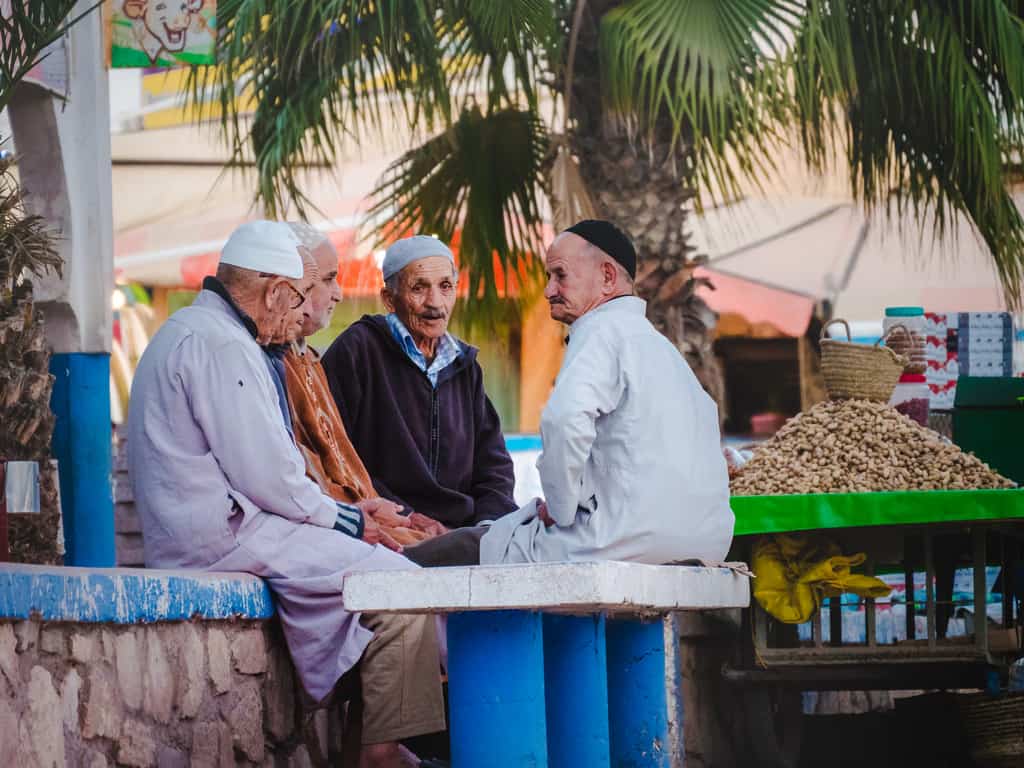
In Ramadan, it’s still possible to buy nuts but no one is allowed to eat during the day…
And fasting isn’t the only challenge during Ramadan. Imagine not drinking any water or coffee, not smoking any cigarettes (if you’re a smoker) and not having sex. Obviously coffee is what I would miss the most.
Now picture hundreds of thousands of people in your city collectively facing those challenges. That’s a lot of tense, hungry, jittery people rubbing shoulders in the streets.
What about the locals? Don’t Moroccans become easily irritated during Ramadan? How does not eating and drinking for thirteen hours at a time affect them?
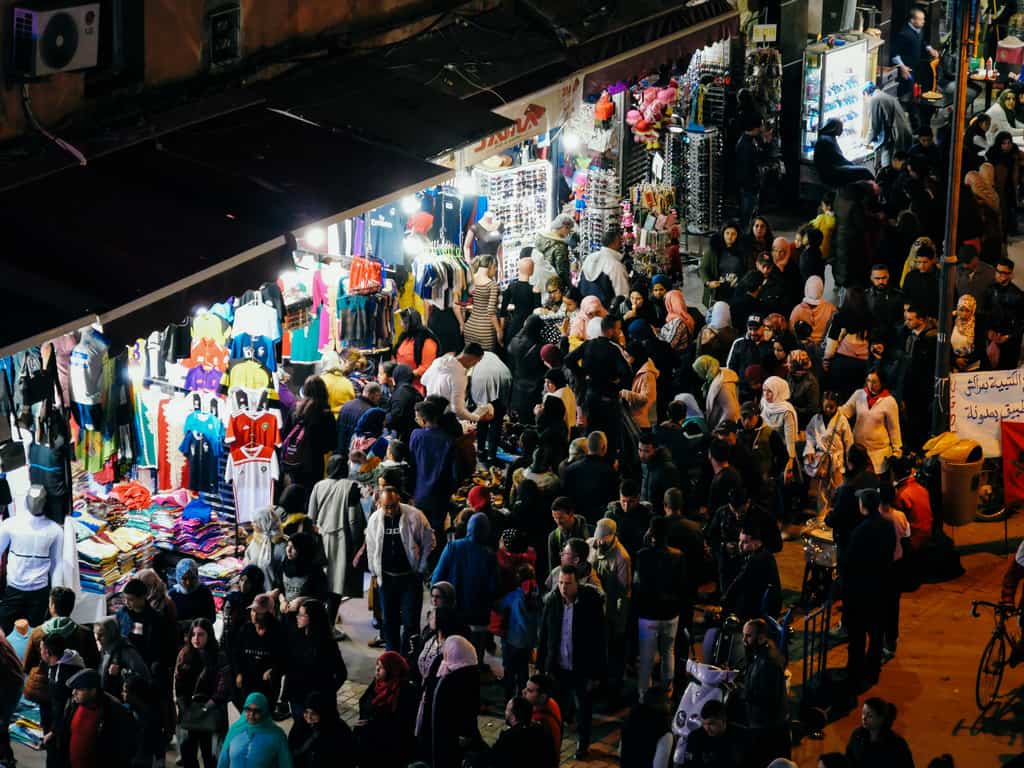
Imagine thousands of people fasting at the same time…
Moroccans will tell you that this experience brings them closer to God. That they feel ecstatic and happy while fasting and that spending all those hours without eating is actually not that hard.
Ramadan definitely feels like a sacred moment in a way and people spend more time with their families and loved ones during that month.
Morocco becomes a different place during Ramadan, that’s for sure, and many travelers anticipate problems and inconveniences when traveling to Muslim countries at that time of the year.
But how is it really to travel to Morocco during Ramadan? Is it as challenging as it sounds? How can foreigners prepare for a trip to a Muslim country during Ramadan if they don’t want to fast?
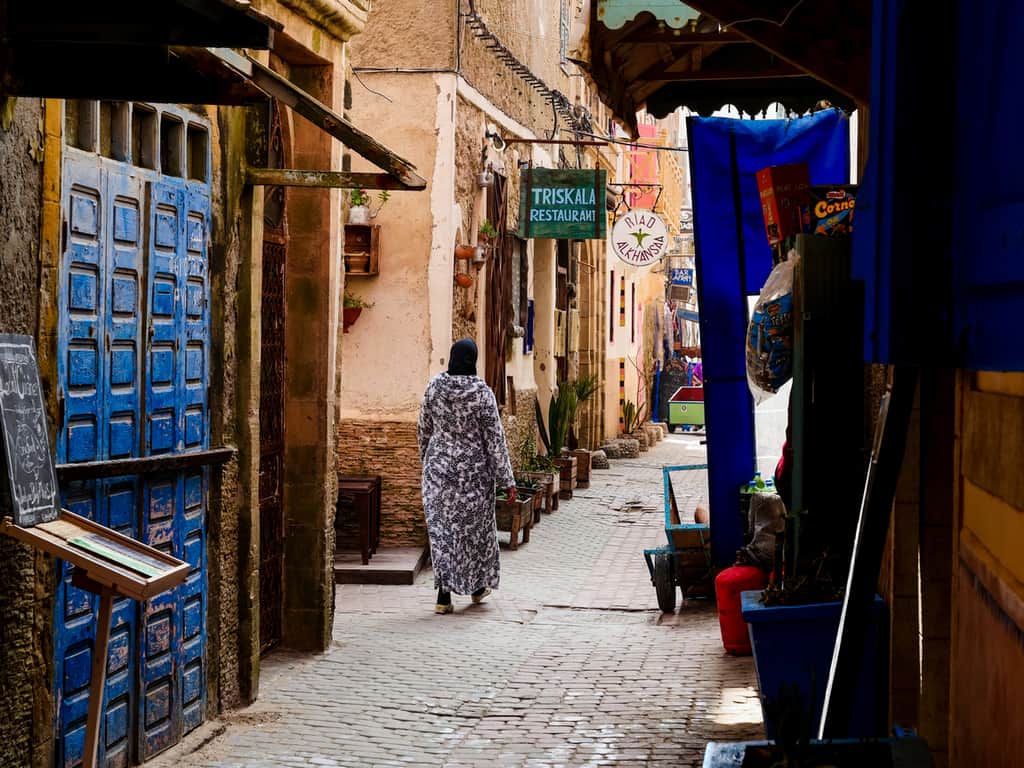
And what if you’re not Muslim but you’d like to fast in Morocco during Ramadan? How should you do it?
If you keep reading I’ll show you that there is no reason to put aside your plan of traveling during Ramadan in Morocco and how it can be a much more exciting and enriching experience to travel during that sacred month.
Tip: See my Morocco Travel Page for a complete overview of all my travel guides and blog posts about Morocco!

Morocco T r a v e l G u i d e : 19 useful things to know before traveling to Morocco
Disclaimer: This posts might contain affiliate links, meaning that if you make a purchase through these links, I may earn an affiliate commission. Thank you for helping to support this website!
Morocco Travel essentials and resources
- Morocco Travel Guide: 19 things you should know before you go
- Where to go: The 17 most beautiful places to visit in Morocco
- Plan your trip: 3 itineraries to discover the best of Morocco
- Is Morocco safe: 18 useful tips to stay safe while traveling in Morocco
- Tours and experiences: Book a customized tour
- Where to stay : Find a room in a hotel, hostel, guesthouse or desert camp
- Travel Insurance: Find the best travel insurance for Morocco
- Getting around : Rent a car in Morocco or travel by bus or train
TABLE OF CONTENTS
1. What exactly is Ramadan?
Ramadan is a month-long Islamic holiday. It’s not celebrated at fixed dates because the Islamic calendar follows a lunar pattern. This means that every year, Ramadan is pushed by 10 days. During this month, Muslims spend part of their day fasting. This fast isn’t only limited to food, it also includes water, coffee, and juices.
The day begins early. People wake up around 4 am to eat right before the sun rises. After that, they’re not allowed to eat until the sun has set.
Once that happens, people are allowed to eat again and break their fast in the company of family, colleagues or friends. They eat a hearty meal composed of Harira soup, sweets, pastries, and fruits. In the evening, once they have eaten, many Muslims will then attend special prayers in the mosques.
Ramadan is meant to be a time when people reflect on their blessings and good fortune and it’s also an opportunity for Muslims to understand the suffering of those who don’t have food or water.
During this time, Muslims will try to enhance the good in their lives while practicing to resist sin. This annual ritual is also regarded as one of the Five Pillars of Islam .

Things to do in Marrakech – A Complete Guide to Morocco’s Red City

2. What should foreigners expect during Ramadan in Morocco?
Before I traveled to Morocco for the first time, I thought that Ramadan had to be strictly followed, even by foreigners. I was sure that if I got caught drinking water in public, I would end up in big trouble, either kicked out of the country or even worst, put in jail.
I was totally convinced that it would be impossible to find any restaurant or convenience store selling food during the day. I found out this isn’t exactly the case. Morocco is quite lenient when it comes to Ramadan and especially towards foreigners.

What to expect in the day during Ramadan
A lot of convenience stores are not open in the morning but in the afternoon you can buy food and water at a few corner stores. Buying food during the day isn’t really the problem, the hardest part is finding open food stores.
The same goes for restaurants as only a small amount stays open for foreigners during the month. If you plan to stay in big cities like Rabat , Tangier , Marrakech , or Meknes You can find out with Trip advisor which restaurants stay open during the day in Ramadan.
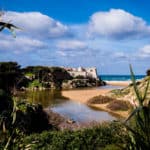
20 Top Things to do in Tangier – Complete City Guide
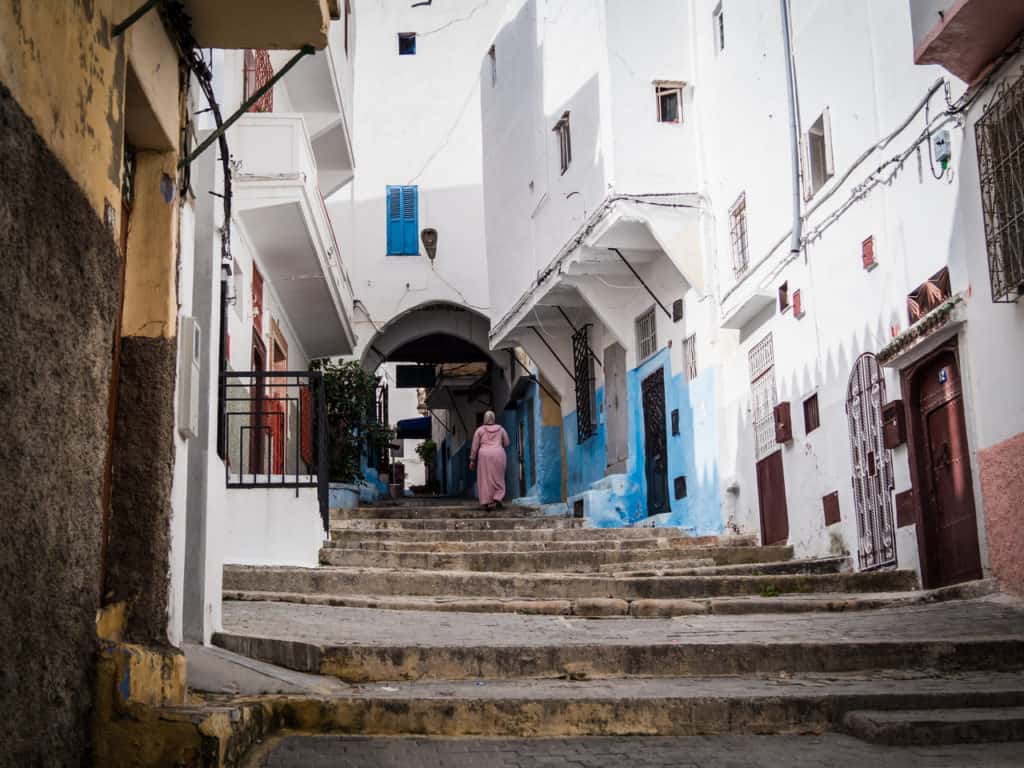
A lot of restaurants and food stalls are closed during Ramadan…
The best and easiest way is to eat and drink in the privacy of your hotel room in the daytime. The same goes for smoking. Foreigners shouldn’t have any problem if they smoke within the compound of their accommodation in Morocco.
Even if you choose not to participate in Ramadan, I would advise not to eat, smoke or drink in public. It’s a way of showing respect for the culture and religion, and Moroccans will appreciate your effort.

Avoid smoking, eating, and drinking during Ramadan unless you’re in the privacy of your hotel or riad…
What to expect after sunset during Ramadan in Morocco
After sunset, however, things are completely different. Some restaurants are open from 6 pm until 1 o’clock in the morning. Even big food stores like Carrefour and Acima are open until 1 am.
Many Moroccans invite their friends and family to eat and break the fast with them. It might happen that they will receive you, as a traveler, as well. Moroccans show particular hospitality to foreigners who are traveling alone during Ramadan.
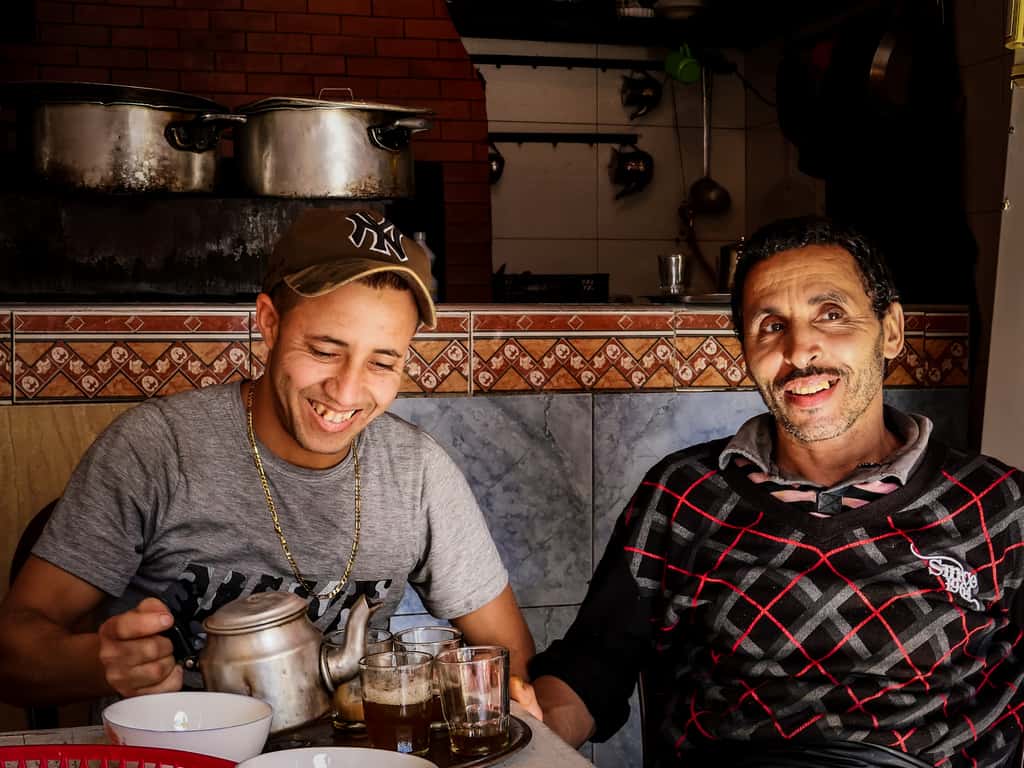
After sunset, men will break the fast in the company of their friends and family…
It’s quite festive to see people gathered around a huge table filled with delicious Moroccan dishes and splurge on all that food.
Another cool thing is that a lot of restaurants in Morocco will have a special menu for the evening during Ramadan. They offer what is called the ”iftar” or the evening meal. This meal is often composed of dates, ”Harira soup” and ‘Briouats”. It’s hearty, sweet, and energizing after a long day on an empty stomach.
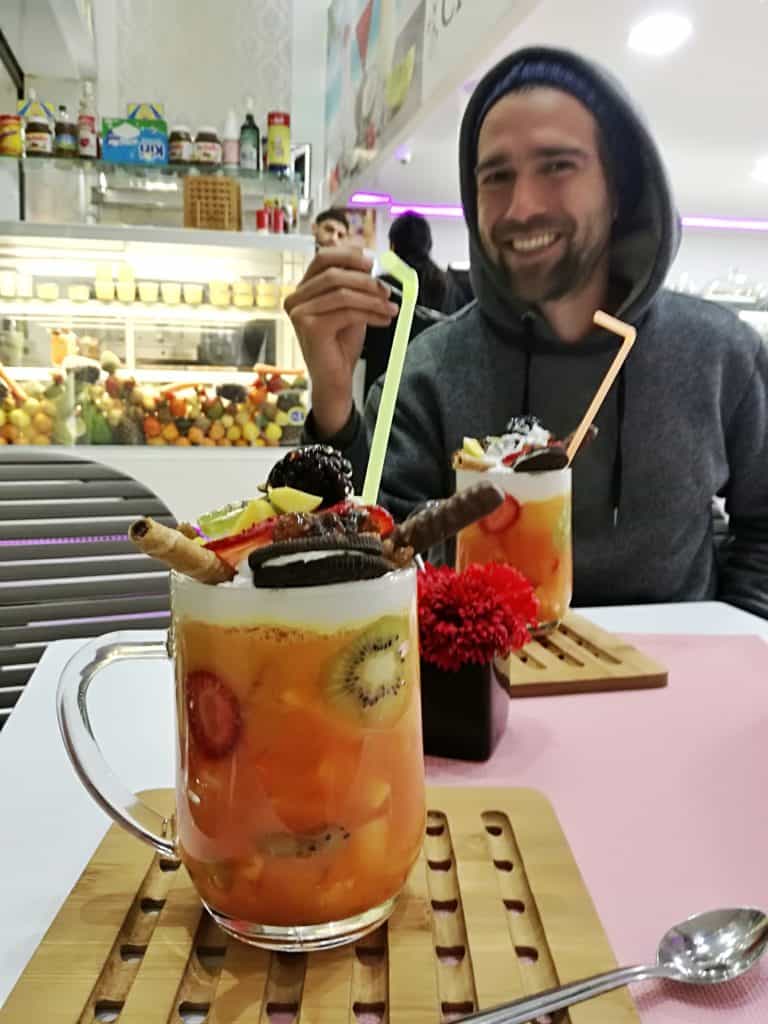
Good fruit juice is also a perfect way to break a fast during Ramadan in Morocco…
What happens after Ramadan in Morocco?
The day that follows Ramadan and that marks the end of the fast is very special for Muslims. It’s called Eid al-Fitr and it’s a significant Muslim holiday. It’s often referred to as the small Eid.
During that day, Muslims will do special group prayers, give donations to the poorest of their communities and congratulate each other for going through the fasting period.
What do people eat in Morocco during Eid al-Fitr?
Because Eid al-Fitr is mainly a time when families get together, a huge tagine is often the typical meal. It’s served with bread, fresh fruits, and delicious Moroccan tea.
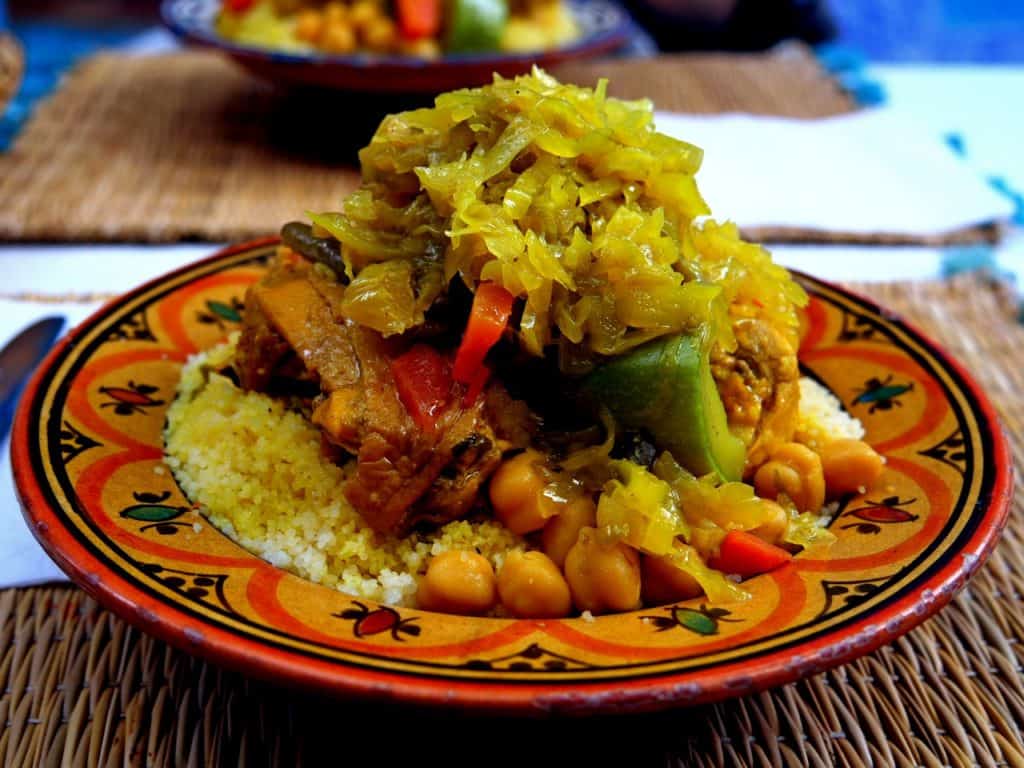
A great meal after a month of fasting is a hearty tagine…
Another popular meal is chicken with lemon and olives. All the relatives will be invited to share these savory dishes during Eid al-Fitr.
I fasted for the last two weeks of Ramadan when I lived in Tangier . I remember the Eid al-Fitr meals being the most delicious meals I ever had. The chicken tagine was so tasty after just a few weeks of fasting, I can’t imagine what it must taste like after a whole month.
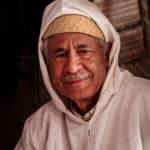
Morocco Photography Tips – How to take portraits of the Moroccan people
3. Do all Moroccans fast during Ramadan?
While I was traveling around the country, I also discovered that a good amount of Moroccans don’t fast during Ramadan. They will, however, be very discreet not to eat, drink or smoke in public and will only do so in the privacy of their home.
I don’t think Moroccans are very vocal about not fasting and if they decide to eat during Ramadan, they probably won’t tell anyone except those in their close circle of friends.
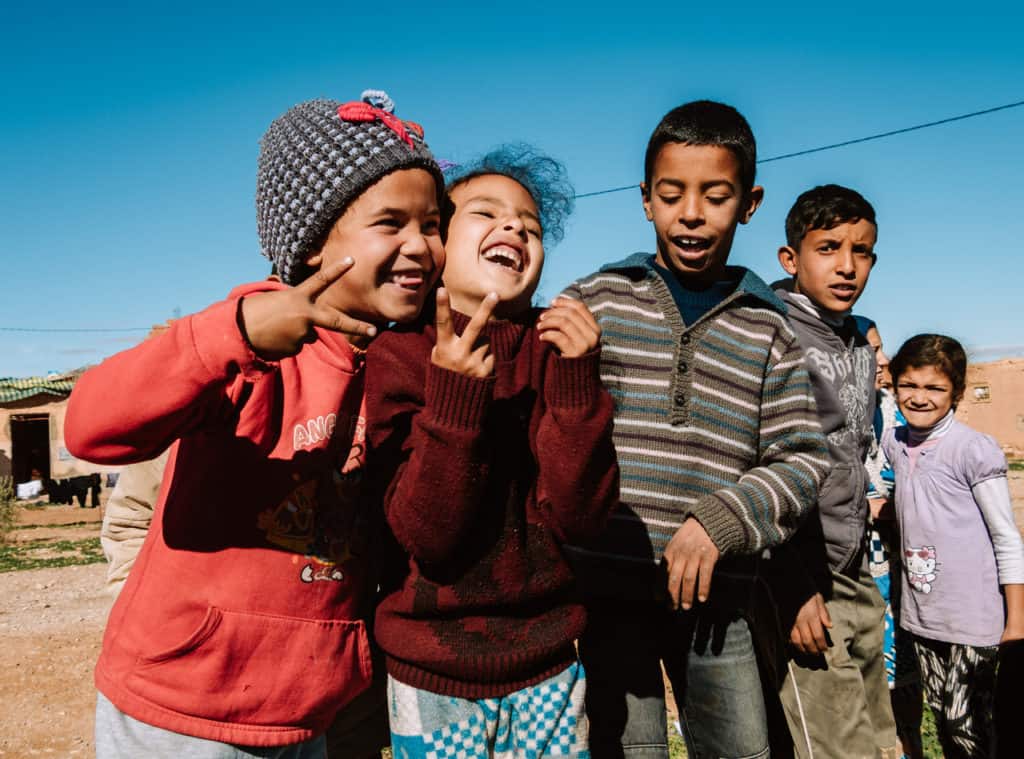
Kids don’t have to fast during Ramadan…
Women that are having their periods can also abstain from fasting and from a variety of religious duties that are otherwise considered obligatory, including ritual prayers.
The fasting days missed due to menstruation have to be made up as soon as possible and some women will even fast for a few extra days after Ramadan to make up for the days they skipped.
Sick and old people can abstain from fasting without having to catch up for those days later.

The 17 most beautiful places to visit in Morocco
4. Should you travel to Morocco during Ramadan and will it affect your holiday?
This is a good question. It all depends on what kind of experiences you want to have in Morocco.
If you travel to the country with the intention of partying and going for shopping sprees in Rabat or Casablanca , it might be the worst time of the year to be there.
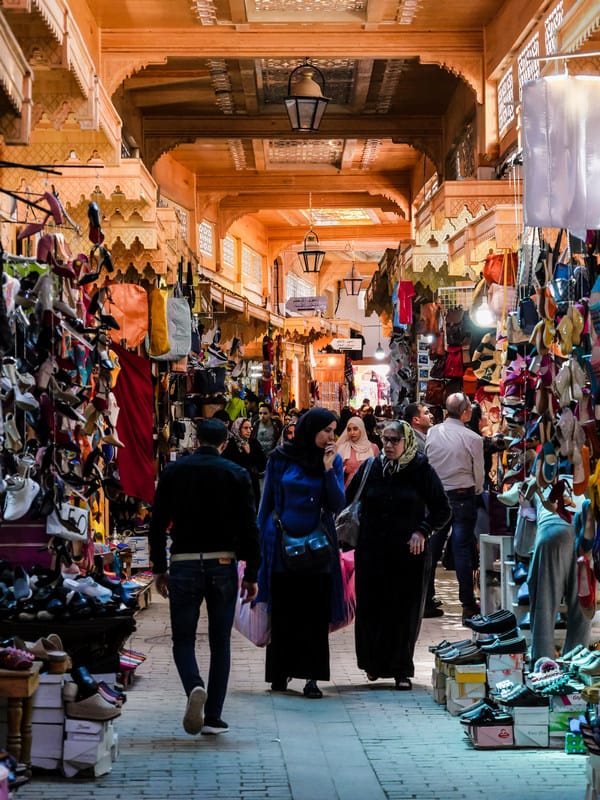
If you’re going there to discover an exciting part of Moroccan culture, then I would strongly advise traveling to Morocco during Ramadan.
You should consider that Ramadan falls on a different date every year. When Ramadan happens during summer, the hours of fasting are considerably longer and this combined with the extreme heat in Morocco can make it much harder for both locals and foreigners.
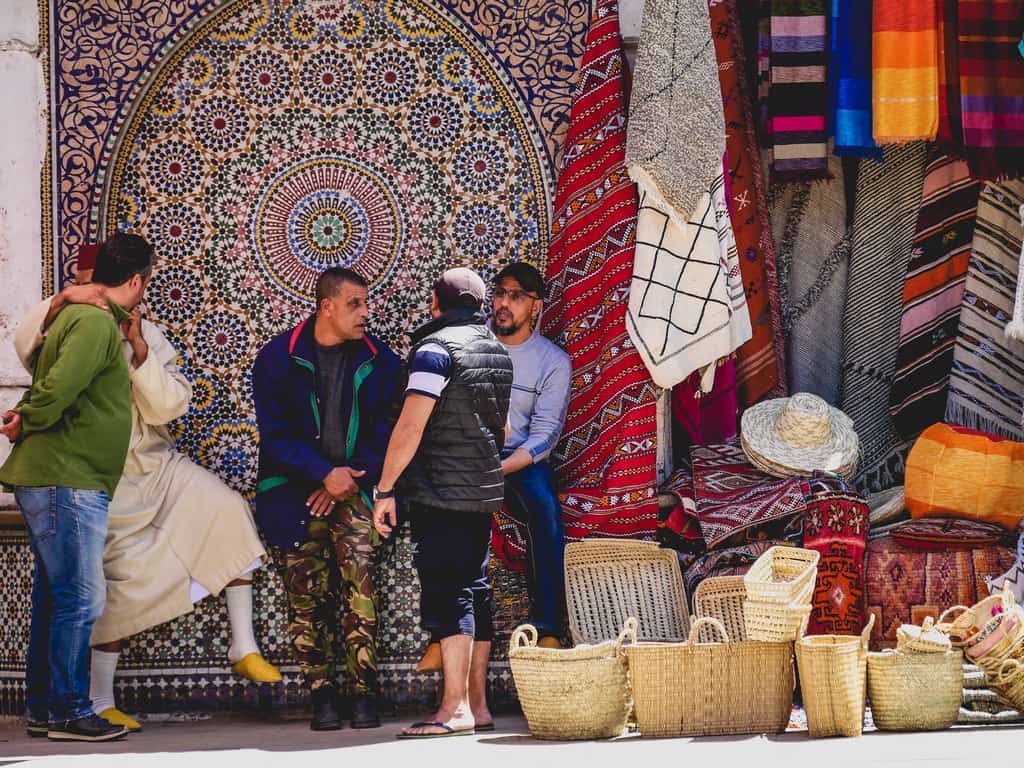
It’s better to look for a bit of shade when Ramadan is in summer…
If you can only come to Morocco for a short while, I recommend coming towards the end of Ramadan so you also get to see the Eid al Fitr, the celebration that follows the month of fasting. It’s a day when people make donations to the poor and feast to celebrate the fast they went through.
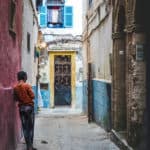
Is Morocco Safe? Useful Things to Know before you go
Here are the advantages and disadvantages of traveling to Morocco during Ramadan:
The good sides of being in Morocco during Ramadan:
The first reason to visit Morocco during Ramadan is that you’ll have the chance to see an event that only happens for one month every year. You’ll get to see an essential part of the Moroccan culture and witness an event that is sacred to Muslims.
People will often invite you to break the fast with them and share the ”Iftar” (the meal after the daily fasting).
Another great side of traveling to Morocco during Ramadan is that the accommodation in major cities tends to be slightly cheaper during that period.

Many friendly Moroccans will invite you to break the fast with them and have some tea…
The downsides of traveling to Morocco during Ramadan:
While Ramadan is very interesting to witness, if you’re a foreigner and you don’t intend on fasting, being in the country at that time of the year requires a certain degree of preparation.
You’ll need to stock up on food in the evening to have something to eat the day after; otherwise, you might have a hard time hunting down the few corner stores that remain open during the day.
Keep in mind that you won’t find any street food stalls. In some bigger cities, you might find a few restaurants that are open to foreigners but if you’re traveling in rural areas, you won’t find anything.
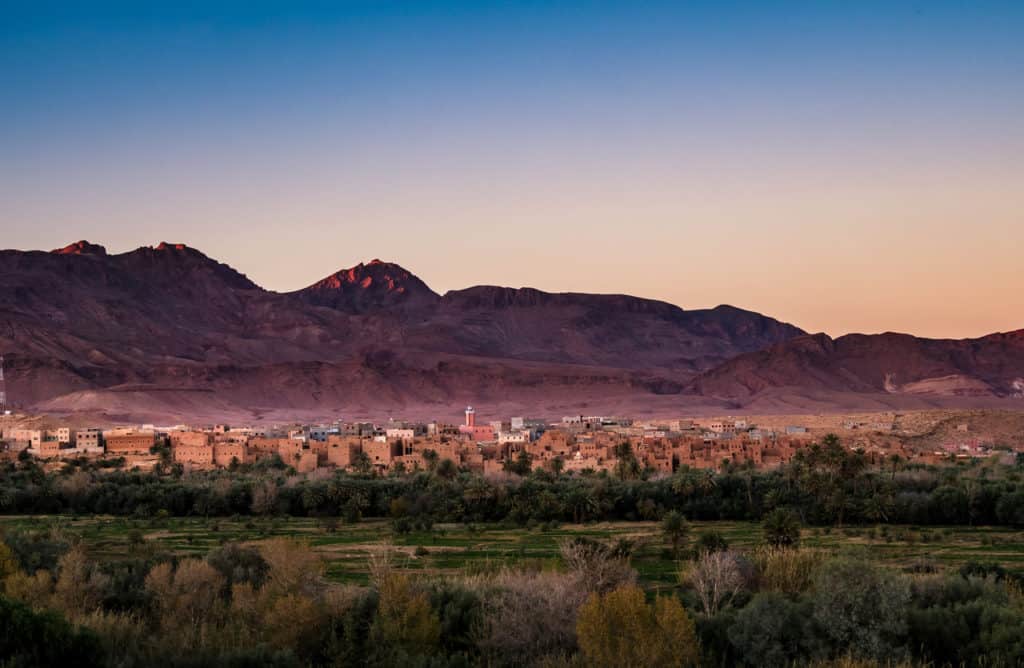
In rural areas, it will be much harder to find food stores open during the day…
5. How do Moroccans greet each other during Ramadan?
Moroccans will greet each other with the sentence Ramadan Mubarak to which they will usually answer with Ramadan Kareem.
People use polite expressions to wish each other a happy Ramadan. They can be used throughout the whole month of Ramadan and not necessarily only at the beginning.
If you travel to Morocco during that period, you should try using these expressions. Moroccans will love seeing that you’re putting effort into learning their language.
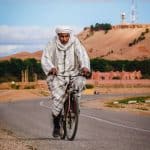
10 tips and tricks to learn Moroccan Arabic
6. How can you prepare for Ramadan in Morocco if you don’t want to fast?
Moroccans don’t usually expect foreigners to fast during Ramadan. Because of this, many snack stores will remain open from the afternoon until the evening.
Bakeries also stay open for people to be able to buy the bread and pastries they will eat with their meals after sunset.
My suggestion would be to get your breakfast already the evening before. Moroccans tend to go to bed very late during Ramadan so food stores stay open late at night, however, they don’t open before the late afternoon.
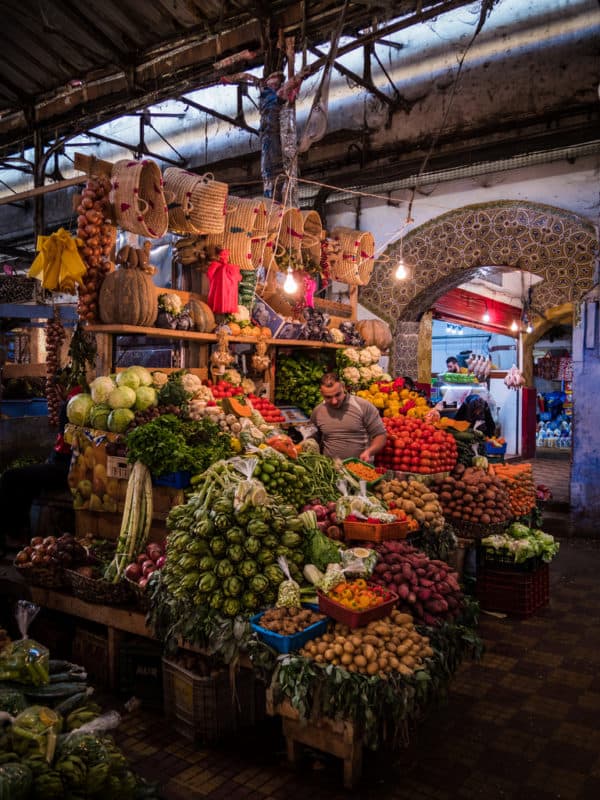
Fruit and vegetable markets stay open during the day in Ramadan…
It’s also going to be crucial to buy enough water ahead of time just in case you wouldn’t find any open stores.
It’s safe to drink tap water in Morocco but only if you know beforehand if the town or city properly filters its water. Although many major cities in Morocco have sound filtering systems, some still don’t.
Opt for bottled water or use a LifeStraw Water Filter Bottle to filter the tap water during your first days in Morocco as you don’t know how your body might react to the bacteria composition of the local water.

I hope you’ll enjoy your time in Morocco during Ramadan. Have you ever traveled to another Muslim country during Ramadan? How were your experiences? Would you recommend it or not?
Related posts

The Honest Guide to Meknes Morocco and Volubilis – 9 best things to do and what to skip
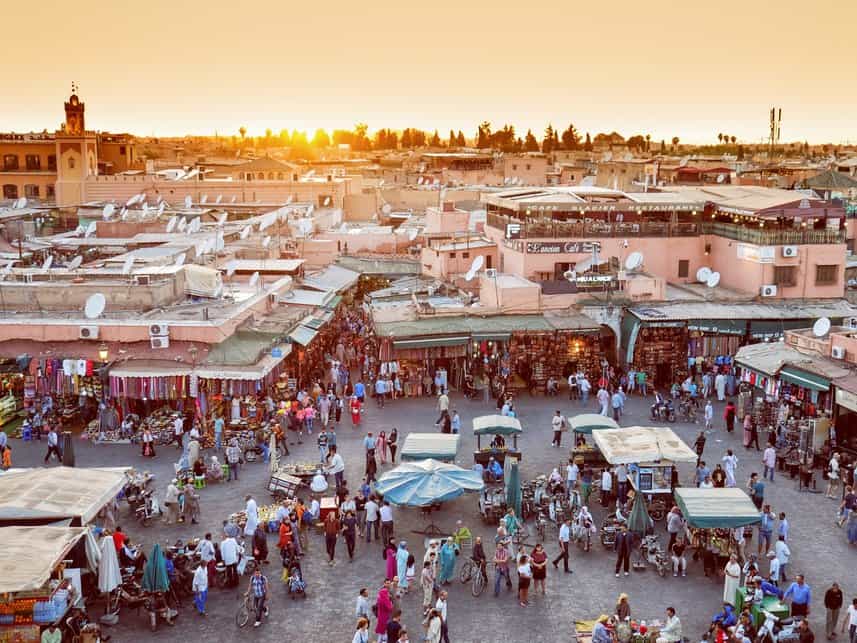
16 Top Things to do in Marrakech Morocco – The Complete Guide to Morocco’s Red City

11 Best Things to do in Rabat Morocco – The Complete Guide to Morocco’s Capital City

20 Top Things to Do in Tangier Morocco – The Complete City Guide

10 Best Things to Do in Agadir Morocco – The Complete Guide to Morocco’s Surf city

12 Best things to do in Chefchaouen, the Blue City of Morocco
7 thoughts on “how is it to travel during ramadan in morocco – 6 helpful tips”.
I will be spending Ramadan with my wife this year and forsee no problems. We have however traveled for 13 years now and are used to working within the customs of all countries. We spent the month of Ramadan in Istanbul a few years ago and it was no problem. Being a traveler like us means having to accept the customs and traditions of all countries and work withinthem.
Very interesting and informative text, thanks a lot! I will also check your other blog texts about Morocco. We will be travelling there this spring during Ramadan. We’re a group of 2 kids (3y and 6y) me and my husband plus my parents-in-law. We will be making a road trip Tangier, Chefchaouen, Fez, Meknes, Rabat, Marrakech and finally Casablanca. And funny thing is, that we also live in Belgium 🙂
Have a great time!!
I am currently in Morocco during Ramadan and I have to be honest, I would not recommend choosing this time to travel. There is a pronounced vibe change as Ramadan begins, with the mood/energy levels of Moroccans absolutely flagging during this time. People will insist that they love Ramadan, but experientially you’re going to see a lot of sullen faces and sunken eyes. The night is a different story, so if you’re a night owl you may enjoy it!
Hi Jelly, may I ask where you currently are in Morocco? Yes, it’s true, Ramadan isn’t always an easy time for people, and some deal better with it than others. Night time is indeed the best during Ramadan as everything becomes back to life 🙂 I hope you enjoy the rest of your trip!
I think Ramadan month will be the best way to travel in Morocco in order to study their culture and religious doctrine’s
Yes, I fully agree with you Ibrahim!
Leave a Comment Cancel Reply
Your email address will not be published. Required fields are marked *
Save my name, email, and website in this browser for the next time I comment.
Ramadan in Morocco: Should you reconsider travel to Morocco during Ramadan?
- By Sarah Steiner
- Updated On March 23, 2024
Witnessing the month of Ramadan in Morocco is a totally unique experience. It can offer a wonderful opportunity to visit and an enriching experience of travel.
But as with any travel plans it does pose questions. Morocco’s population is over 99% Muslim. So what does this mean for your trip?
While there are some changes to local life during this period there is absolutely no reason to put aside plans for travel to Morocco during Ramadan.
Travel during Ramadan in Morocco can become a special holiday and an enriching experience of travel – provided you know what to expect. Here are some key points to keep in mind when visiting Morocco during the month of Ramadan.
- What is Ramadan?
- When is Ramadan in Morocco?
- How Moroccans observe Ramadan
- Suhoor and Iftar
- Changes during Ramadan
- Restaurants
- Business hours
Ramadan greetings
- Travel in Morocco during Ramadan
- Tips for Ramadan in Morocco
What is Ramadan?
Ramadan is the ninth month of the Islamic calendar. It is the holiest month of Islam and takes place once a year following the cycle of the moon.
The month of Ramadan is observed by Muslims worldwide as a month of fasting, prayer, reflection and community. During the month, Muslims fast from sunrise to sunset breaking the fast at Iftar, the meal which happens after sunset.
When is Ramadan in Morocco?
The month of Ramadan is observed at the same time of year by Muslims all around the world.
The exact dates of the month cannot be determined in advance due to the sighting of the crescent moon, but it generally moves forward by 11 days (earlier) each year.
Interestingly though, since Morocco is geographically further west compared to other Muslim countries, Ramadan in Morocco often starts one day later than the Middle East.
For example, in UAE Ramadan started on the 11 th of March for 2024. However, Ramadan in Morocco for 2024 started on 12 th March.
This year Ramadan in Morocco is from 12 th March – April 9 th 2024.
These are the predicted dates for Ramadan for the next few years:
- 2025: March 1 st – 29 th
- 2026: February 18 th – March 19 th
- 2027: February 8 th – March 8 th
It is our second time experiencing a full month of Ramadan in Morocco. Read on to find out how visiting Morocco during Ramadan might be different to what you are expecting…

How Moroccans observe Ramadan
Moroccan people are known to be very fond of their own traditions. They celebrate their religious occasions proudly. And Ramadan in Morocco is a time of year that Moroccan children and adults alike always look forward to.
In Moroccan philosophy, Ramadan is viewed as a turning point for your spirit to be purified. It is revered as a time to share what you have with the needy and the poor.
Moroccans will be very proud to share the traditions of Ramadan. And it is a time of year when people are eager to openly celebrate traditions with their families and loved ones.
Sharing food and food preparations are a huge part of Moroccan celebrations of Ramadan. The evening meal of iftar is a big daily, celebration for everyone.
As sunset approaches it is a busy time on the streets as people return home from work to await the call to prayer to pray and break their fast together. And the late evenings are a special time of day again with literally crowds of men overflowing mosques all around the country to perform Taraweeh prayers (the final prayer of the day).

Does everyone fast?
Moroccan Muslim adults fast from dawn to dusk during Ramadan. The country’s population is over 99% Muslim.
This means any person who’s hit puberty is required to abstain from eating, drinking (including water), smoking, and engaging in sexual activity during daylight hours.
Although there are certain dispensations for those who are unable to fast due to illness (physical or mental), pregnancy, nursing or menstruation. In general all Muslims that are able to observe fasting during Ramadan.
As a non-Muslim tourist you are not expected to fast.
Are there rules for visitors to Morocco during Ramadan?
It is actually illegal for Moroccans to eat and drink in public during Ramadan. There is dispensation for children and adults if they meet special requirements where they don’t need to fast (such as illness, menstruation or pregnancy).
However, these rules do not apply to visitors or non-Muslims.
While you are not expected to observe the fast for Ramadan in Morocco. Out of respect, as a visitor, you should avoid eating (including chewing gum) and drinking, and smoking in public places.
There are designated restaurants that are open for tourists and non-Muslims where it is fine to sit within the restaurant space and eat and drink.
What changes during Ramadan in Morocco?
The holy month of Ramadan in Morocco is always highly anticipated.
It is a special time to visit Morocco. But there are changes to day-to-day life during this period. And in reality it will give you a different experience of Morocco.
There is a general different vibe in Morocco during Ramadan.
Evenings are celebratory and upbeat. While days can be long and patience short. (Imagine an entire country with thousands of people fasting at the same time!).
Some shops and restaurants are not open during the month of Ramadan. (Our favourite sardine restaurant in Safi was closed for the entire month). However, most shops and restaurants do open during Ramadan but with revised hours of operation. Often, they will open later and close later.
Banks, government offices and larger business open on a restricted scheduled opening later and closing earlier.
In rural Morocco, local convenience stores might open in the afternoon and remain closed in morning.

Are restaurants open during Ramadan?
Some local restaurants and coffee shops in the smaller cities of Morocco close during the daytime and open to serve Iftar meals and until very late in the evening (after midnight).
In the larger, tourist cities of Morocco (Essaouria, Tangier, Marrakech, Agadir) there are restaurants and coffee shops that remain open to serve food during fasting hours for tourists.
The tourist cafés and restaurants are usually open all day and it is no problem to sit outside and eat or drink. But do bear in mind your server and café staff are more than likely fasting themselves. And if you arrive just on iftar you might have to wait for them to eat first and break their fast before they resume serving.
- Tip: None of this is written to make you feel bad about eating during Ramadan in Morocco! But if you adjust your hours of eating to after everyone has broken their fast, there is a noticeable buzz to post-sunset Morocco…
Suhoor is the morning meal eaten by Muslims before a day of fasting during the month of Ramadan. The suhoor meal is to be eaten before sunrise.
Iftar
Iftar, also known as futoor (the Arabic word for breakfast), is the fast-breaking evening meal of Muslims in Ramadan every day at sunset.
Time change for Ramadan
During Ramadan in Morocco the clocks change (as if for daylight saving).
If you will be arriving before Ramadan, at the very beginning of the month or at the very end you should be aware that clocks change. The time will go backwards one hour at the beginning and forwards one hour at the end.

Businesses and opening hours during Ramadan
The working hours of public institutions change during the holy month of Ramadan. Most businesses and banks adopt a continuous working time and operate from 9am until 3pm, Monday to Friday.
- Tip: Be aware that on Fridays, very few people go back to work after the midday Muslim prayers.
Public transport and driving in Morocco during Ramadan
Buses in Morocco may alter their schedules and routes during Ramadan to match timing for sunset or to reduce traffic during evening prayer times. Trains generally keep to their given schedules.
The most notable transport challenge during Ramadan is driving on the roads. The roads in cities all over Morocco are busiest in the hour before sunset as people travel from work to break their fast at home with family.
Taxi drivers are less likely to engage in business for late-afternoon or evening travel. You may need to wait for a taxi until after iftar or even after the Taraweeh prayer (final prayer of the day).
- Tip: If you can help it avoid the roads in Morocco for the hour before sunset.
What to expect after sunset during Ramadan in Morocco
From 6:30pm – 9:00pm you can expect not much to be happening outside during Ramadan. Most people are at home breaking their fast with their family and making the final two prayers of the day.
Afterwards the streets get busy again. Souks in the city will be open until late and buzzing with people out and about.
We went out to Morocco Mall in Casablanca (the largest mall in Africa) at 8:00pm and it was absolutely deserted. By the time we had finished our supermarket shopping at 9:00pm and were leaving the mall; all of the mall shops, cafés and restaurants were just opening again!
- Tip: Moroccans tend to eat a second meal much later (around midnight) so everyone is awake much later during Ramadan!
Eid-Al-Fitr
Eid al-Fitr is a time of celebration in Morocco. The end of Ramadan is announced by the sighting of the new moon in the sky. And this signifies the start of Eid-al-Fitr, a celebration translating as “Festival of Breaking the Fast”.
In Morocco the streets are decorated with colourful lights and traditional decorations. It is one of the largest celebrations in Islam and an exciting time to be in Morocco!
- Tip: During the Eid celebration, Muslims greet each other by saying ‘Eid Mubarak’, which is Arabic for “ Blessed Eid”.
Food for Ramadan in Morocco
In Morocco, there are loads of traditional, rich and versatile dishes from all over the country that are staples and favourites during Ramadan.
It varies from region to region, but foods typically eaten during Ramadan in Morocco include:
- Harira (Moroccan soup)
- Briouat (stuffed pastries)
- Khobz B’Chehmafor (stuffed bread)
- Sellou (seeds and nuts)
- M’smen (Crepe)
- Beghir (Moroccan pancake)
- Boiled eggs
- Avocado Milkshake
- Chebakiya
- Cakes and pastries
A traditional iftar meal can include a warm, spiced harira soup, dates, M’smen, boiled eggs, and plenty of sweet treats such as chebakia and sellou.

Midfa al Iftar
You may be startled by an ear-piercing canon or blaring alarm to signal sunset – but don’t be alarmed(!). In some cities during Ramadan in Morocco a cannon is fired at sunset for the breaking of the fast.
- Tip: Firing of a cannon for the breaking of fast in Morocco is called ‘Medfaa’ (Midfa al Iftar).
Travel to Morocco during Ramadan
Ramadan is a special time to visit Morocco. But in reality it will give you a different experience.
You’ll find yourself part of local celebrations, and savouring traditional Moroccan foods that are specific to Ramadan.
When planning your visit it is worth being aware that because Ramadan is based on the lunar calendar it falls on a different date each year and is affected by the seasons.
Ramadan during the summer is very different to Ramadan in Morocco during the winter months. Namely because the hours of fasting are considerably longer. And that combined with extreme heat especially in the desert regions can make Ramadan harder for both locals and visitors too.
While some restaurants and shops might be closed during the day or operating on a limited schedule. Most tourism activities or tours, as well as sites and attractions will also function normally. Or at best with a change to operating hours.

Tips as a visitor to Morocco during Ramadan
Here are some key points to keep in mind when visiting Morocco during the month of Ramadan.
- Plan your activities with consideration for the energy levels of those around you and be understanding if plans are adjusted.
- As iftar starts you might need to wait for staff in a café or restaurant to eat first.
- Don’t expect anything to open before 10:00AM!
- Buy breakfast food for the morning the night before as shops don’t open in the morning.
- Dress for the season. While modesty is the norm in Morocco all year round, cultural sensitivity is expected in Ramadan.
- If you are fortunate to be invited to iftar it is polite to bring a gift, but make sure any food gifts are halal.
- For iftar, wait until prayers are said and the host invites you to eat. It’s customary to start with a drink of water and a date or two.
Whether you are traveling to Morocco in Ramadan or you have Moroccan friends observing Ramadan, it is respectful and appreciated to use polite expressions of greeting.
- Tip: In Morocco, “Ramadan Kareem” or “Ramadan Mubarak” are commonly used greetings. They translate to “Generous Ramadan” or “Blessed Ramadan” respectively.
Should I visit Morocco during Ramadan?
Absolutely. You’re in for a unique cultural experience if you do. And a truly special time in Morocco.
Albeit Ramadan presents unique challenges to visitors to Morocco. But on the other hand it also provides an amazing learning and cultural experience.
Ultimately it depends on your preferences and desired experiences of travel in Morocco. If you’re seeking a busy and upbeat party or shopping atmosphere, Ramadan may not be the ideal time to visit.
If you’re open to thoughtful travel and a unique cultural experience and can adapt to a more flexible schedule, Ramadan in Morocco could offer a wonderful opportunity to visit.

Planning travel to Morocco
These are the companies we use while traveling fulltime as a family (for five years now) and ones that we would recommend to anyone booking travel to Morocco.
- Booking.com – The best all-around accommodation booking site that constantly provides the cheapest and lowest rates. There is a great selection of budget accommodation and be sure to check the filters and cancellation flexibility that we love!
- Skyscanner – We use this for all our flights. They are able to search small websites and budget airlines that larger search sites often miss.
- GetYourGuide – Get Your Guide is a huge online marketplace for tours and excursions offered all around the world.
- SafetyWing – A global travel insurance that covers people from all over the world while outside their home country. You can buy it short or longterm; and even if you are out of the country.
- World Nomads – Travel insurance tailored for longterm travel and nomads (including those who have already left home). Make sure you have travel insurance before traveling to Morocco!
Read more about travel in Morocco
- Travel to Morocco: The Ultimate Morocco Travel Guide.
- Taking the ferry from Spain to Morocco.
- Everything you wanted to ask about driving in Morocco.
- Crossing the Morocco Mauritania border from Dakhla to Nouadhibou.
- Motorhome services in Morocco.
- A guide to campsites in Morocco.
- Buying a SIM card in Morocco (and how to get unlimited data).
Wondering about itineraries? Questions about schooling? See our Family Travel Guides and FAQ here .
Top Destinations
- Cook Islands
- New Zealand
Latest Posts
Visiting hassan ii mosque casablanca: everything you need to know., hassan ii mosque hammam in casablanca: the best hammam in morocco , chez lamine marrakech: eat lamb where gordon ramsay ate , jardin majorelle in marrakech (ysl garden): is it truly worth the visit, essaouira hammams: choosing the best local moroccan hammam..

We are the Steiners: Sarah, Gavin, Harry and Oscar – a family from New Zealand with a love of travel and adventure together… Especially where it takes us off the beaten track!

Away with the Steiners uses affiliate links. That means that if you buy something through these links, we may earn a commission at no extra cost to you.
Leave a Comment Cancel Reply
Your email address will not be published. Required fields are marked *
Save my name, email, and website in this browser for the next time I comment.
Notify me of new posts by email.
Visiting Morocco during Ramadan
It might be a special and fulfilling experience to travel and visit Morocco during Ramadan. Learn the cultural etiquette, dos and don’ts, and helpful hints to make the most of your vacation during this holy month. Plan your journey to Morocco during Ramadan with ease.
Exploring the Unique Charms of Visiting Morocco During Ramadan
Morocco, located in the center of Africa, entices visitors with its captivating landscapes, lively culture, and extensive history. While traveling to Morocco at any time of year is fascinating, spending time there during Ramadan adds an unmatched level of spiritual meaning and cultural richness. We explore the special features and things to think about when visiting Morocco in the holy month of Ramadan in this guide.
Recognizing Ramadan in Morocco
The ninth month of the Islamic lunar calendar, Ramadan , is a holy time for Muslims all around the world. This month has a specific character in Morocco since it blends the nation’s own cultural identity with religious customs. The labyrinthine medinas evoke a sense of reverence and solidarity as the call to prayer reverberates.
Morocco’s Spiritual Tapestry
Morocco is like a tapestry weaved with spiritual threads throughout Ramadan. The country comes alive with a sense of dedication, from the busy districts of Marrakech to the tranquil oases of the Sahara. Guests can see community iftar dinners, where people break their fast together and share regional specialties that showcase the nation’s culinary skills.
Navigating Cultural Sensitivities
Respectful Engagement with local customs is crucial when visiting Morocco during Ramadan. While the majority of tourist attractions remain open, it’s essential to be mindful of the fasting population. Public consumption of food and drink during daylight hours should be discreet, and visitors are encouraged to participate in the fasting experience as a sign of cultural appreciation.
Embracing the Nightly Festivities
As the sun sets, Morocco transforms into a vibrant tapestry of lights and festivities. Nightly prayers, known as Tarawih, resonate from the mosques, creating a serene ambiance. The lively atmosphere extends to the markets, where special night bazaars offer an array of treats and delights. Exploring the medinas under the moonlit sky provides a unique and enchanting experience.
Planning Your Visit
Strategic Planning is essential to make the most of your journey during Ramadan. While some attractions may experience reduced hours, others, particularly those with religious significance, take on an added allure. The historic cities of Fes and Meknes, with their ancient medinas and ornate mosques, offer a glimpse into Morocco’s cultural heritage intensified during this sacred month.
Culinary Experiences
Morocco’s culinary scene is a highlight year-round, but during Ramadan, it takes on a special significance. Savoring traditional dishes such as Harira soup, dates, and pastries becomes a culinary adventure. Engage with locals in communal iftar gatherings, where the breaking of the fast becomes a shared celebration of both faith and hospitality.
Practical Considerations
To ensure a seamless and respectful visit during Ramadan, consider these practical tips:
1. Modest Attire
Adopting Modest Attire is appreciated during Ramadan, especially in religious sites. Covering shoulders and knees is a sign of respect for local customs.
2. Patience and Understanding
Cultivate Patience as some services may operate at a slower pace during Ramadan. Understanding the significance of this month enhances your travel experience.
3. Unique Souvenirs
Explore local markets for Unique Souvenirs that capture the essence of Ramadan. Handcrafted items, traditional clothing, and local spices make for meaningful mementos.
Discover the unique experience of visiting Morocco during Ramadan
In conclusion, visiting Morocco during Ramadan is a journey into the heart of cultural richness and spiritual depth. By embracing local traditions, participating in communal rituals, and navigating with cultural sensitivity, you can unlock an immersive and transformative travel experience. Morocco’s allure during Ramadan is not just about sightseeing but about connecting with the soul of this enchanting nation.

Ramadan in Morocco: all you need to know for your travels
Ramadan in Morocco is a unique experience for travellers when the normal rhythm of life in Morocco stops. Travel during Ramadan in Morocco can become a special holiday.
Ramadan dates in Morocco in 2024: March 12 – April 10
What is Ramadan?
Ramadan is the 9th month in the Islamic lunar calendar, during which the Qur’an was revealed to the Prophet Muhammad. For Muslims, it is a month of fasting – eating, drinking, making love, and smoking is not allowed from sunrise to sunset. Fasting (Sawm) is one of the five pillars of Islam. Through fasting, Muslims restart their awareness of and gratitude for everything God has provided.
At the centre of Ramadan, there are spiritual things – praying more, helping the poor, thinking over one’s life and, of course, getting closer to Allah. Fasting seeks to show all Muslims what it means to be poor in a modern world where not everyone has something to eat.
Coming to Morocco? Book your consultation
Book your 45-minute 1:1 video consultation call, and I will answer all your questions about Morocco, review your itinerary or create one together.
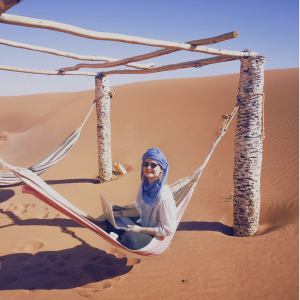
Fasting is optional for children under the age of 16, nursing mothers, pregnant women, the sick, women in their menstruation period, hard-working Muslims who would otherwise be unable to support their families, or travelling people. All those with justifiable reasons to eat during Ramadan may fast after Ramadan, thus redeeming their eating.
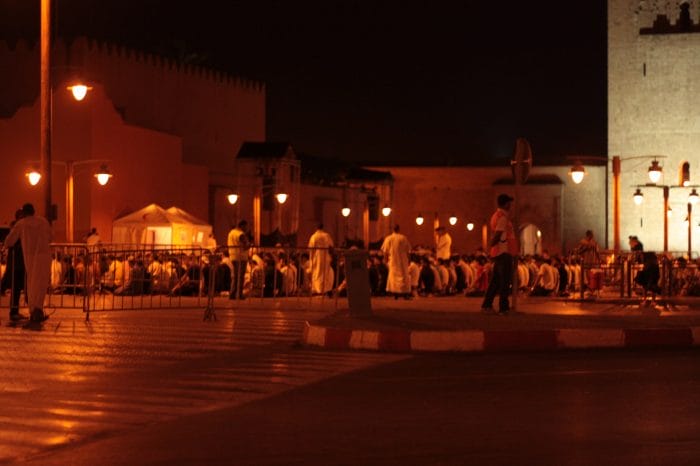
FASTING: IFTAR AND SUHOOR
During Ramadan, Muslims don’t eat or drink anything during daylight hours. There are two meals eaten at a specific time, and it’s useful to know about them if you travel to Morocco during Ramadan. Muslims eat one meal before dawn, the “predawn meal” or the ‘suhoor/sehri’ (around 4 am), and another after sunset, called the “iftar” or Ramadan breakfast (around 7 pm).
Most Muslim cultures focus on food during Ramadan, and especially the evening meal iftar is a big celebration for everyone. As the sunset approaches, most local restaurants open their doors wide, serving traditional iftar meals. Some people sit down in front of their food plates and endure the smell, patiently waiting for the prayers announcing the end of the day of Ramadan.
In Morocco, traditional Ramadan food is the Harira soup, eaten with boiled eggs, dates, Moroccan pancakes Msmen , yoghurt, milk, and sweets like Chebakia that is sold on every corner during Ramadan, but I find it too sweet for my taste.
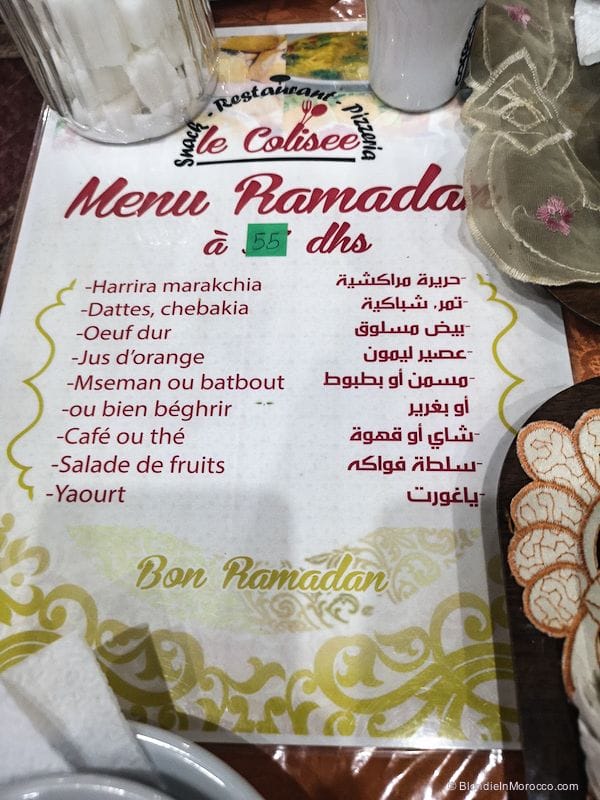
Even though I am not Muslim, I love going out for the Iftar meal. I would sit in the local restaurant and patiently wait for the signal to eat. And then, voilà, you hear the firing cannon, the whole city is instantly empty. Fasting Muslims are running home or to restaurants, and the cleverest ones immediately fill their stomachs with delicious food. So if you travel during Ramadan, don’t plan any dinner (only Iftar meal) or other activities from around 7 to 8 pm.
WHO ARE THESE FIRING SOUNDS?
During Ramadan, every evening, right before sunset, you will hear a loud noise. These booming sounds are called “Medfaa” (Midfa al iftar), the Cannon for breakfast, which signals the start of Ramadan and the end of each day’s fasting. The Cannon is an ancient tradition that started in Egypt and spread to several surrounding Arab countries.
Often, especially for the Iftar, instead of the cannon blasting, you will hear the sound of an air raid siren called Zowaka . I don’t hear the difference between Zowaka and Cannon sounds, so don’t get confused if you hear different namings.
Seven firings of cannon announce the start and the end of Ramadan. Then, every evening one cannon boom announces Iftar time, the breaking of the fast, followed by the call to prayer.
A second cannon firing is followed much later, in the early morning hours, around 4 am, during the call to Fajr prayers (the first of the five daily prayers). The firing of cannons wakes Muslims up for the Suhoor/Sehri meal. The third firing is when everyone should stop eating Suhoor meal, and go to sleep. Then, starts a new fasting day.
During Ramadan, at night, you might hear or even see (if you wake up early) a special person called Nafar (a town crier) with a traditional robe called gandora, slippers & a hat. Nafar’s task is to walk down the streets, blowing a horn and calling people to wake them up for suhoor , the pre-dawn meal.
LIFE DURING RAMADAN
During Ramadan, many shops are closed; if they are open, that is only in the evening. Of course, this does not apply to tourist shops and cafes, most of which are in Marrakesh’s Medina. It is better not to plan any significant work, like home reconstruction, during Ramadan because local workers will not find the strength to do it.
And that is no wonder, given that they give up food and water at the temperature of +45 degrees Celsius and get up before dawn for fajr prayer and an early breakfast.
LAYLAT AL-QADR
The last 10 days of Ramadan are the holiest days for Muslims because that is when the Prophet Muhammad received the first ayahs (verses of the Qur’an). The most significant night is called Laylat al-Qadr (Night of Power, Night of Destiny).
The surah (chapter of the Quran) states Laylat Al Qadr is better than 1,000 months, meaning the worship Muslims do on this night earns rewards of life. Which would translate into 83 years in modern time measurement. In the Quran, it is stated, “Whoever establishes the prayers on the night of Qadr out of sincere faith and hoping to attain Allah’s rewards then all his past sins will be forgiven”. That’s why in the last days of Ramadan, Muslims pray not only during the day but also during the night, until 5 am.
EID AL-FITR
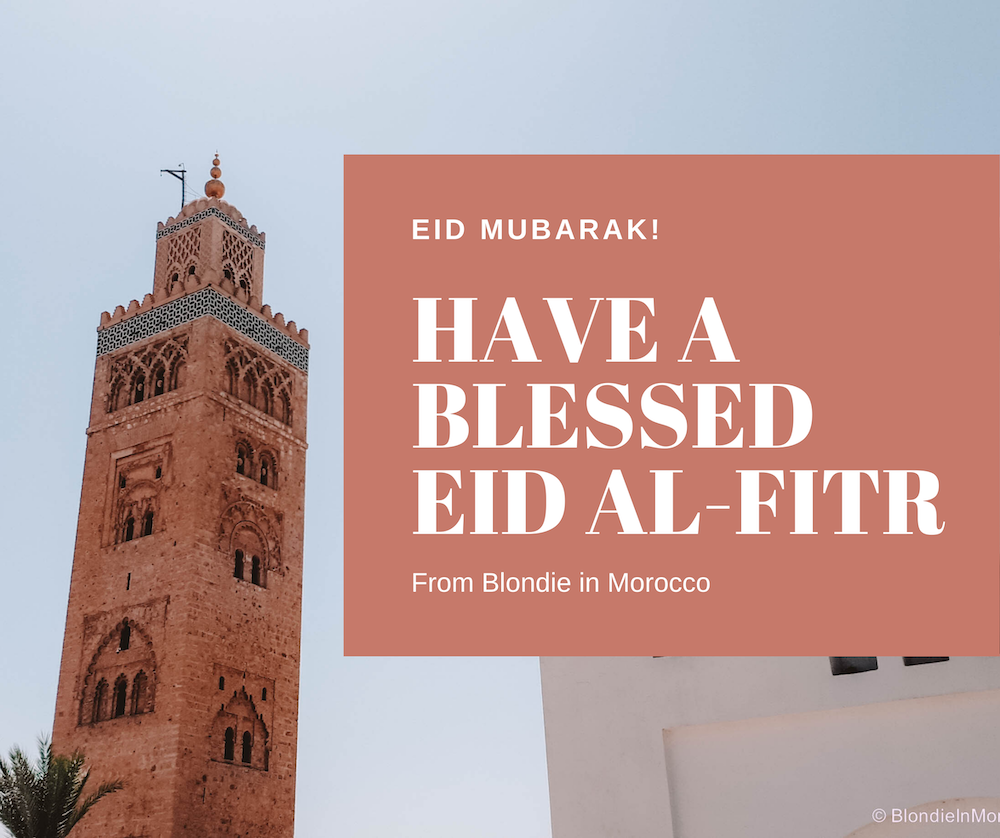
The end of Ramadan is announced by the young moon appearing in the sky. Then begins the one celebration of Eid al-Fitr (also called the “Festival of Breaking the Fast”), during which everyone makes up for the month of fasting. In the main squares, there are free lunches or other kinds of help offered to the poor. Eid al-Fitr is one of the biggest Islamic holy festivals in the world.
This celebration begins early in the morning, just before sunset, when Muslim men gather for common prayer. At the same time, women prepare a special breakfast of Eid al-Fitr, which usually consists of Moroccan pancakes ( baghrir or melwi ). After breakfast, families gather together drink tea, children are dressed in new clothes, and adults wear traditional Moroccan clothing.
Up to 48 hours before the Eid al-Fitr prayer, Muslims must pay Zakat Al Fitr , a charity taken for the poor. In Morocco, the minimum amount of Zakat Al Fitr is fixed by the government, last year it was 13 DH per person (minimum).
TRAVELING TO MOROCCO DURING RAMADAN
It is said, “When in Rome, do as the Romans do”, so during Ramadan, try to keep local traditions as well
- most local cafes and restaurants close for the month of Ramadan. However, tourist restaurants and cafes are open at regular hours.;
- dinners in touristy restaurants will be served later, after the Ramadan iftar dinner; so either plan to eat around 8pm, or eat the Ramadan dinner together with locals.
- all tours, transfers, and tour guides are available during Ramadan, so don’t be afraid of being stuck in a hotel;
- local and intercity buses and trains run during Ramadan;
- in smaller Moroccan cities, most local cafes and restaurants will be closed and open only in the evening. So maybe arrange your lunch in advance. Usually, drivers know places that are open for tourists for lunch during Ramadan;
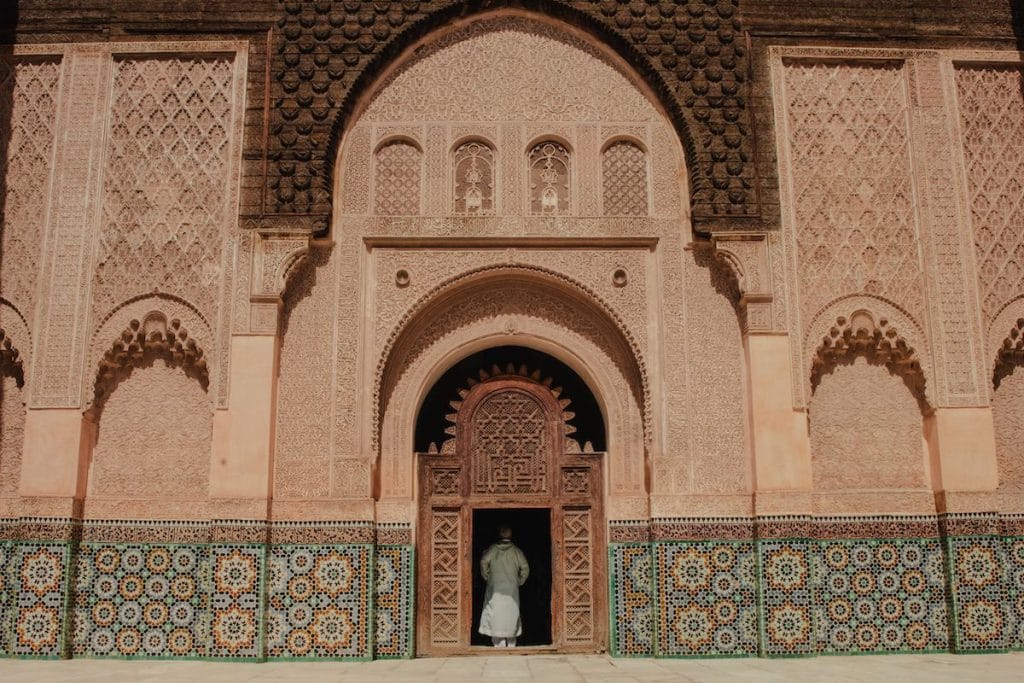
- a very important moment during Ramadan is the iftar breakfast, which starts at sunset. Because this is the first meal of the day for Muslims, everyone gathers in one place to eat. Once the iftar starts, you might have to wait for the cafe staff to finish their meals first. Tour drivers also try to drive to places before the start of the iftar;
- during Ramadan, alcohol is sold strictly to foreigners and non-Muslims ONLY. All liquor stores require you to show your passport (even foreigners) without exception. Muslims are not allowed in the bars during Ramadan, so many local bars are closed for the month.
Similar Posts
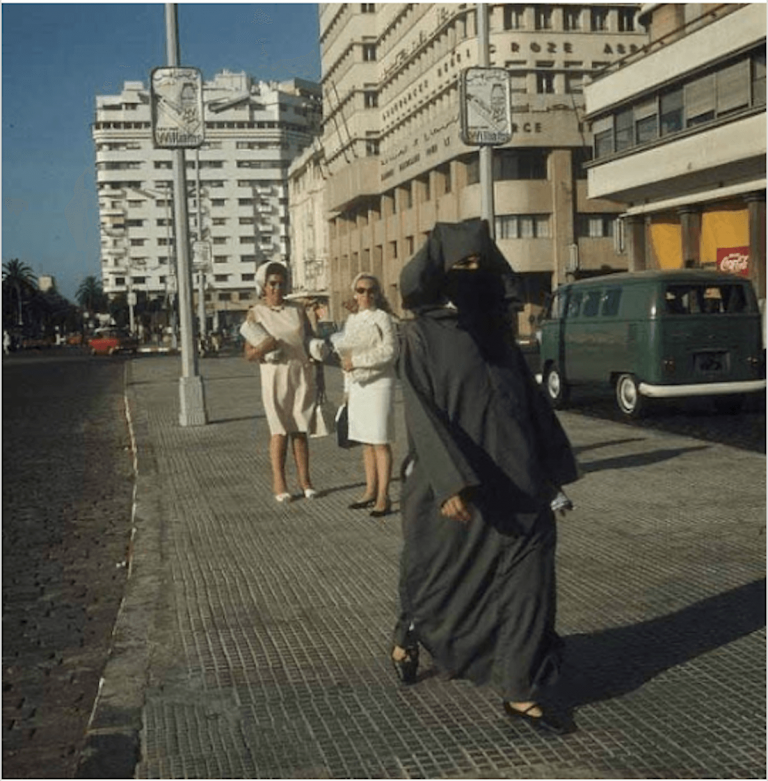
11 Instagram Accounts to Follow Before Visiting Morocco
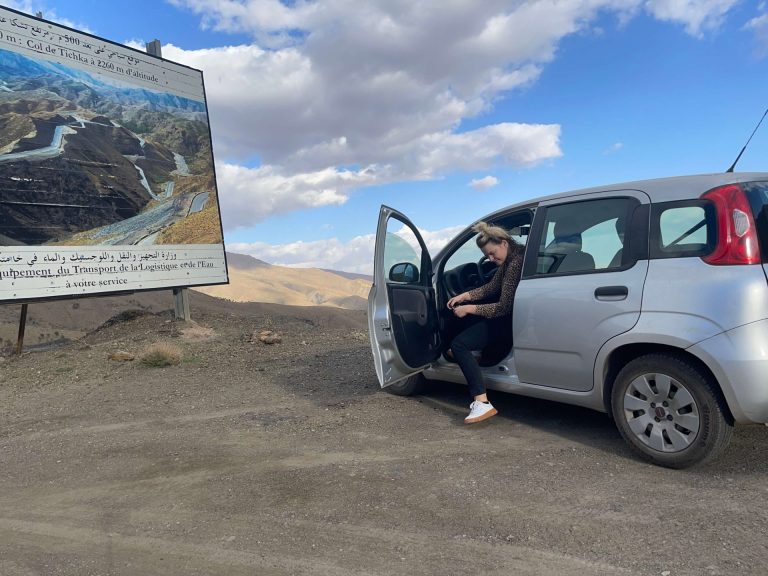
Rent a car in Morocco – shall you or shall not?
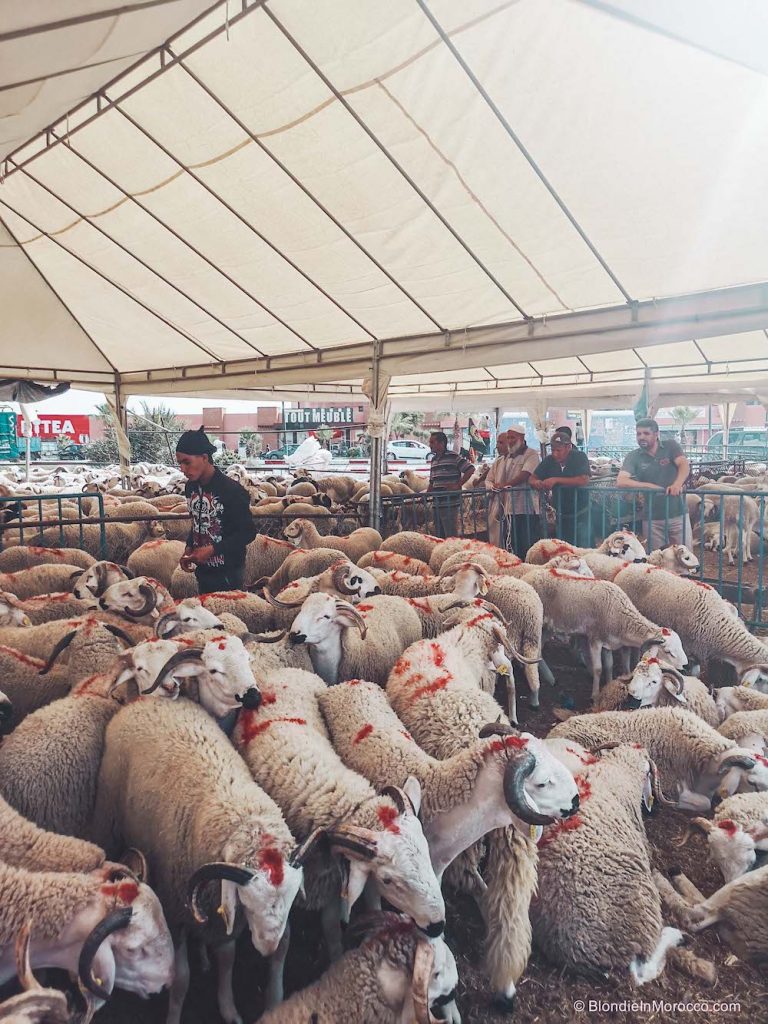
Confusion between Eids: Eid al-Fitr and Eid-al-Adha in Morocco
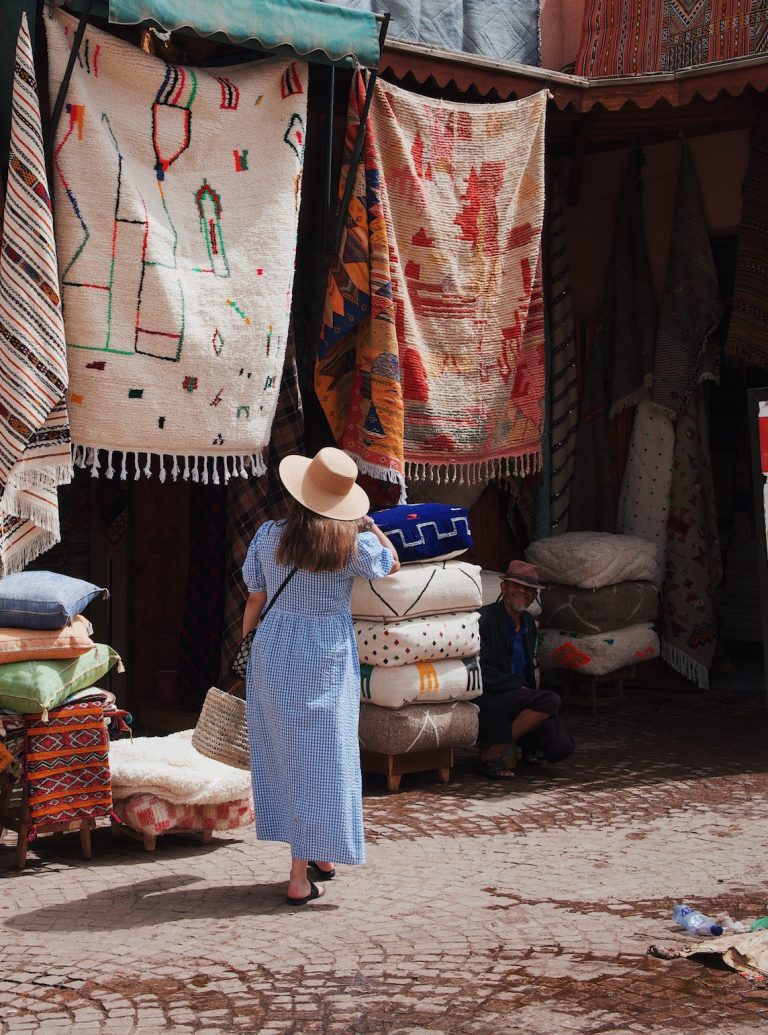
What to Wear in Morocco? Tips for packing
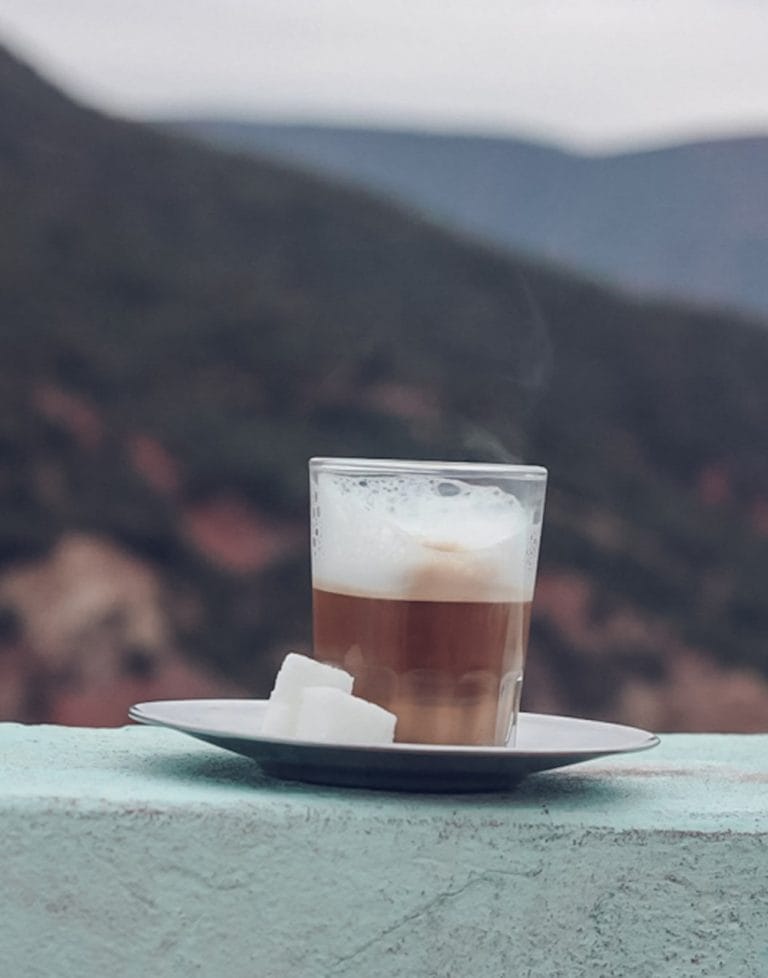
Not a Cappuccino in Morocco, the Nous Nous coffee, please!
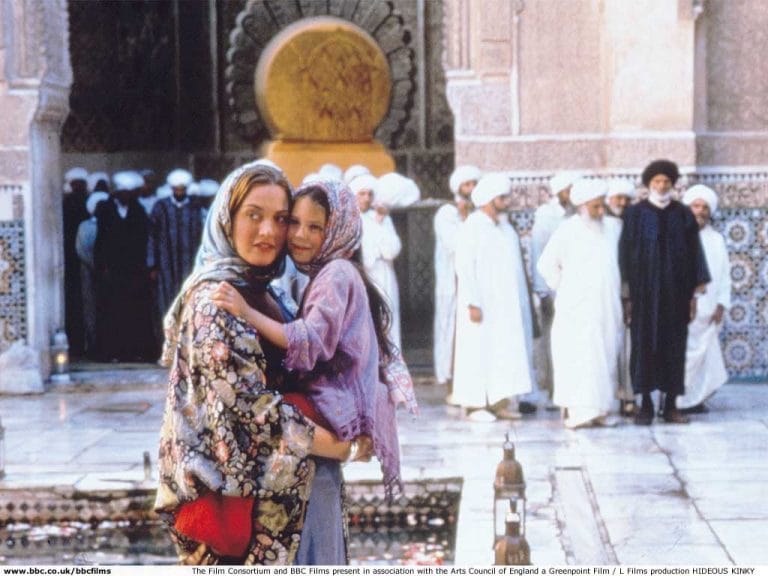
Travel movies for your motivation
Leave a reply cancel reply.
Your email address will not be published. Required fields are marked *

Visiting Morocco in Ramadan: Essential Tips and Insights
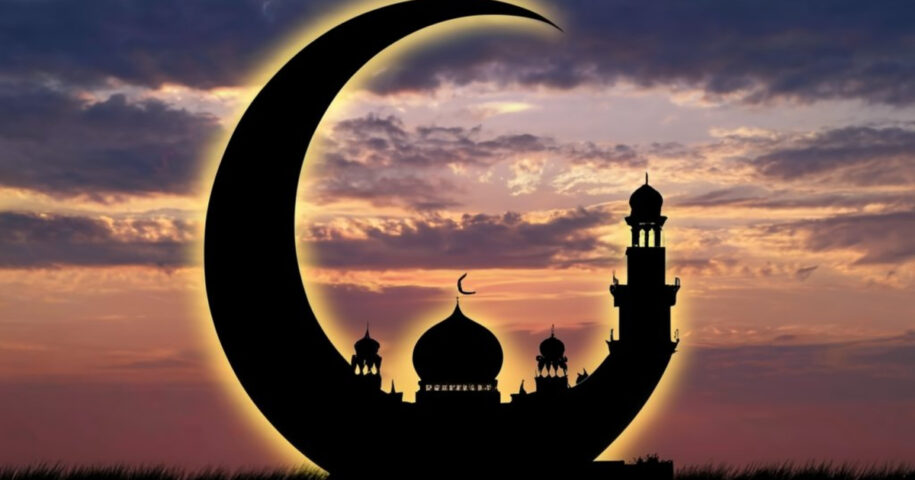
Table of Contents
Are you going to Morocco during the holy month of Ramadan? It is unique. Because it is a religious and cultural holiday, Ramadan is a very important month in Morocco. It’s also a great time for travelers to learn about how people live and what they do. If you visit Morocco during Ramadan, you will have a spiritually rich and culturally interesting time that you will never forget. No matter how the daily iftars are or how the mesmerizing sound of the call to prayer fills the old medinas, you will never forget your trip.
To fully enjoy this holy time, you need to know the rules and traditions of the area, such as when to fast and how to act during events. Let’s talk about some important things you should know about going to Morocco during Ramadan so that your trip is both respectful and fun.
Book Your All-Inclusive Tour in Morocco
Chat With An Expert
Key Takeaways for visiting Morocco during Ramadan
- When planning a trip to Morocco during Ramadan, be sure to respect the ways of life of the people who live there.
- Think about how your faith beliefs might affect your daily life, like how you get to work, what you eat, and how you get around.
- Spend time with people from a different culture and use the time to learn about what Ramadan means to them.
- Take advantage of the unique cultural events and food adventures that you can only find in Morocco during Ramadan.
Understanding Ramadan in Morocco
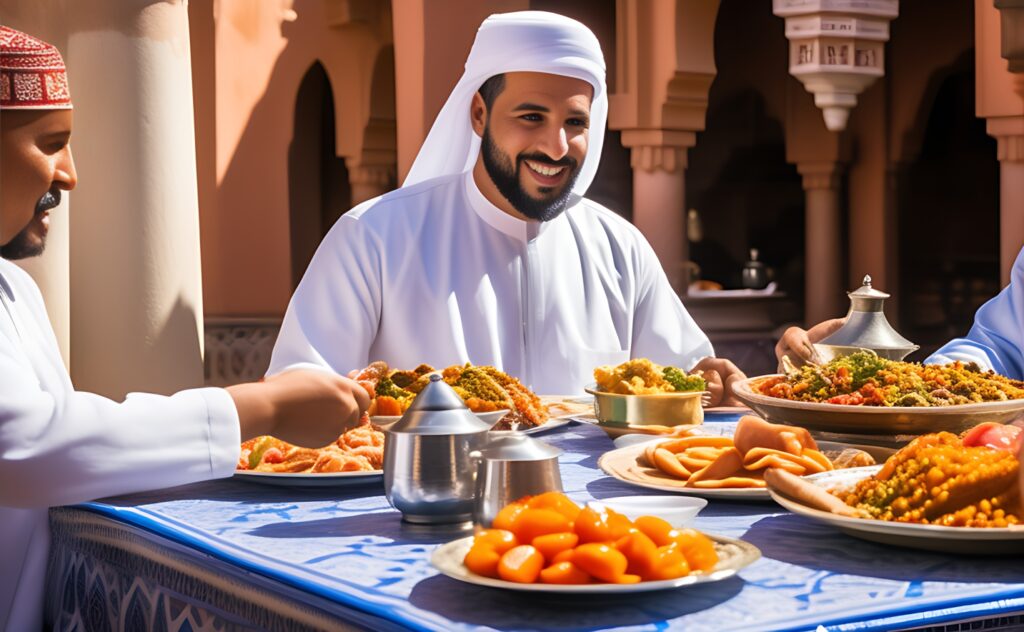
The Ninth Month
Muslims all over the world celebrate Ramadan, which is the ninth month of the Islamic monthly calendar . People fast, pray, and reflect during this time. As an act of worship and self-discipline, Muslims don’t eat or drink from dawn until dusk during this holy month.
You don’t have to give up your physical desires during Ramadan; it’s also a time to focus on spiritual growth. Muslims try to clean up their minds by doing good things, becoming more spiritual, and being more devoted to God.
Purification and Strengthening Faith
The primary goal of Ramadan is to get closer to God and clear your thoughts. People learn more about self-discipline and care more about those who are less fortunate when they fast during the day for a month.
Muslims fast and make an extra prayer every night called Taraweeh during the month of Ramadan. People become more mentally focused and closer to Allah when they pray for a long time.
Preparing for the Trip
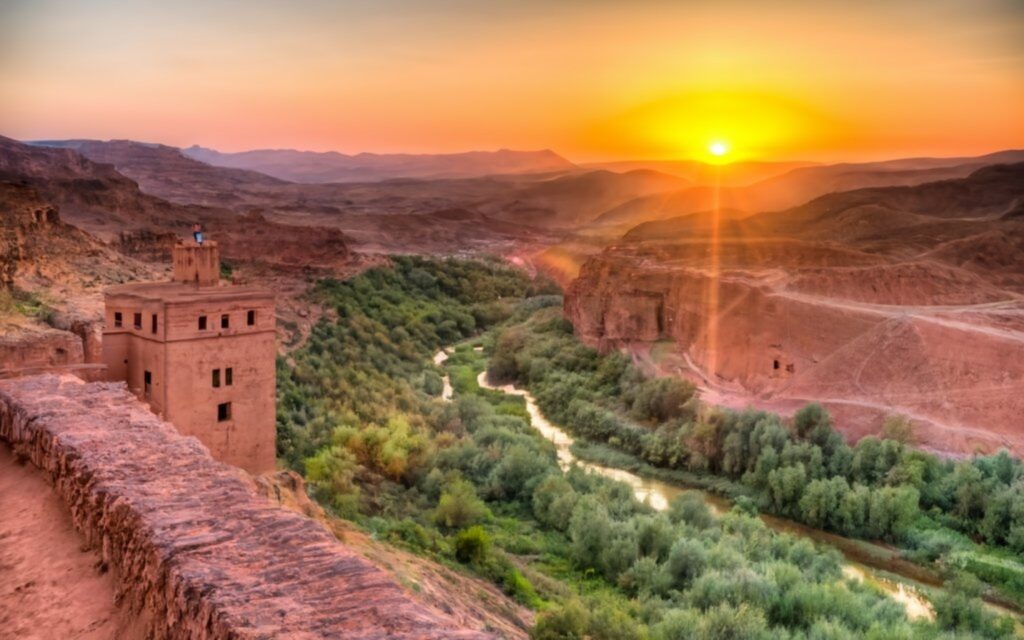
Travel Expectations
Visit Morocco during Ramadan for a unique chance to fully experience the religious and cultural traditions of the country. There is a lot of life in the air during Ramadan. Shops are busy, there are lots of bright decorations, and most people have a strong faith. In the evening, families get together for food and fun. This is a chance to see how kind Moroccans are.
There is no better time than now to learn about real Moroccan practices and see how people in this North African country enjoy Ramadan. There are fun things to do and events to attend during this time, like traditional music shows or charity efforts to help people in need.
Cultural Manners
If you go to Morocco during Ramadan , you need to be aware of the local habits and ways of life. To plan your activities well, you need to know that many businesses will have limited hours or may be closed during the day. This means that you need to change your standards for things like shopping, eating out, and sightseeing.
Also, you should be aware of how you act during Ramadan to honor its holy meaning. In order to respect local customs, this means dressing quietly and not showing love in public. To show respect for people who are fasting during Ramadan, don’t eat, drink, or smoke in public places during those hours.
Weather in Marrakech
It is important to think about the weather when deciding what to do in Marrakech during Ramadan. The temperatures tend to rise quickly this time of year because it is at a lower level between mountains. It’s important to keep yourself fresh. If you want to avoid the heat while still doing things outside like going to markets or historical places, it’s best to plan these trips for early morning or late evening.
Not only can you learn about the habits of the people you meet, but you can also have deep cultural talks that help you understand each other’s views and values.
Daily Life and Transportation
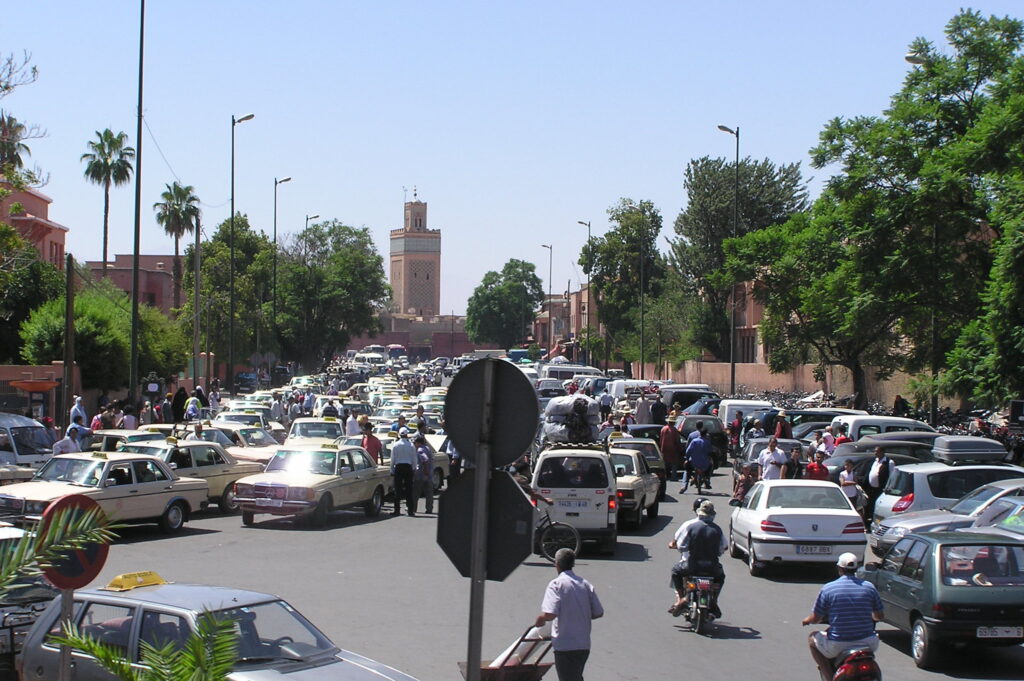
Public Etiquette
It’s important to learn basic Moroccan Arabic words before going to Morocco during Ramadan so you can talk to the people there. It’s important to have cash on hand because some places might not take credit cards at this time. Doing research on the habits and customs of the area ahead of time will ensure a polite stay.
To show respect for people who are fasting, please don’t play loud music or act in a way that bothers others in public places. It’s also important to keep quiet during prayer times. Additionally, following the local rules about what to wear to holy places shows respect for the culture.
Changes in Services
Some places may be closed or have reduced options during the day of Ramadan. This means that tourists should plan their meals ahead of time and maybe even make orders at open restaurants early to make sure they have space.
During Ramadan, work hours and fasting times may change, which could mean that public transportation plans will also change. Travelers should plan their trips ahead of time and be ready for delays when taking public transportation.
Travel and Commute
Visitors to Morocco during Ramadan should be aware that some businesses and services may be closed or offer fewer services during the day. This could affect their daily plans, such as going out to eat or exploring the city. Travelers must now adjust their plans to account for these changes.
For smooth travel within the country, you need to know about any changes that public transportation services make. Travelers can lessen the trouble that comes from fewer services being available by making plans ahead of time to book or reserve what they need.
Book Your Ramadan Tour in Morocco with Experts
Plan Your Itinerary with Expert Locals
Cultural Immersion during Ramadan in Morocco
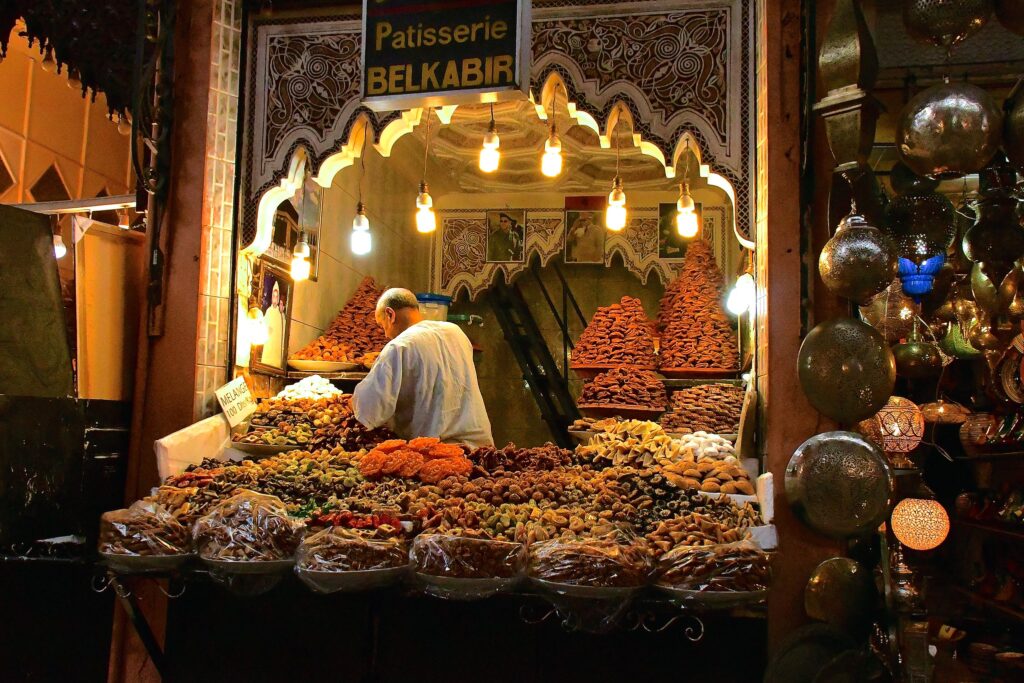
Observing Traditions
It can get very crowded in Morocco during Ramadan , especially at Iftar, the meal that breaks the fast. A good way to escape delays is to think about taking the bus or walking. It’s important to be flexible and give yourself extra time to get where you’re going during rush hour.
One way to get a real feel for the customs of a place is to take a walk through its busy markets and tight alleys during Ramadan. This holy month, the lively mood and bright displays give a glimpse into traditional Moroccan life.
Greeting Customs
One great way to learn about Moroccan customs during Ramadan is to share Iftar with them. Sharing food with neighbors, family, and friends makes memories and helps people understand and respect the way things were done in the past.
There are many spiritual things to do in Moroccan places during Ramadan. One great way is to go to a mosque for evening prayers. The people of Morocco are mostly religious and honor their faith. Through the narrow streets, you can hear the beautiful sound of the call to prayer.
Another great way to connect with Moroccan culture during Ramadan is to do good things, like give to local groups or help people who are in need. It’s at the heart of Ramadan to give back to the community. You can do this by doing community work projects or by adding extra food to meals for poor people.
Dining Experience during Ramadan in Morocco
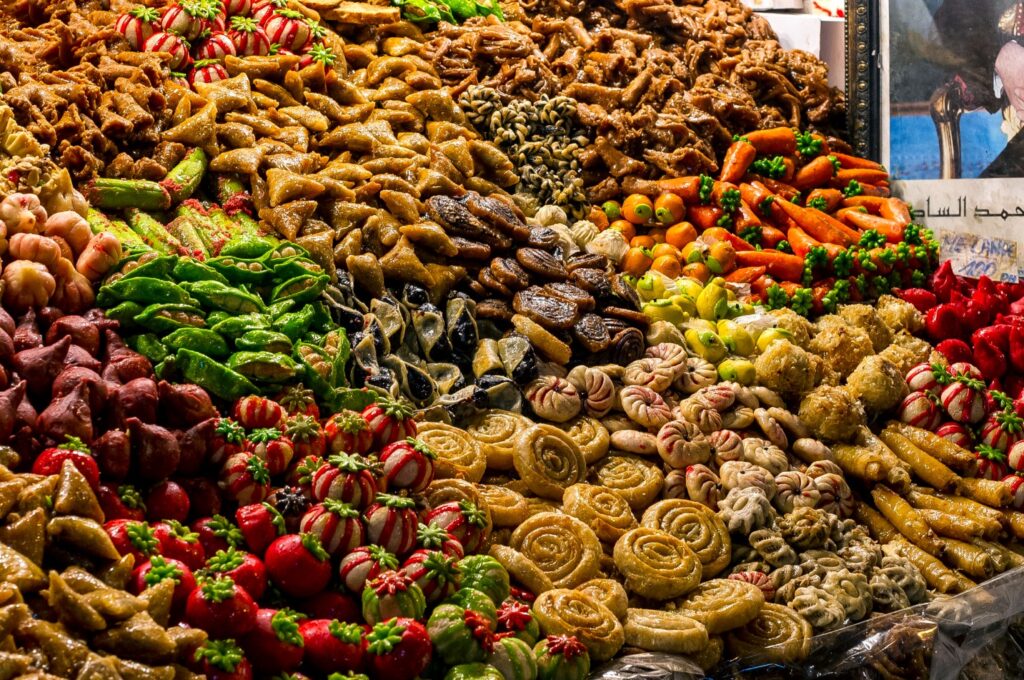
Food Traditions
In Morocco, it’s important to follow the local food customs during Ramadan. Saying “ Ramadan Mubarak ” or “ Ramadan Kareem ” to someone shows that you respect their faith practice. When you meet someone from the area, remember that shaking hands is polite, but always wait for them to make the first move. If Moroccans ask you to join them for food or drinks, please say yes. It’s a sign of friendliness and kindness.
If you go to Morocco during Ramadan, remember that giving and receiving food or drinks are big signs of kindness. It gives you a chance to meet people and become fully immersed in their culture. You can learn more about Moroccan culture and make stronger bonds with the people you meet by taking part in these rituals.
Nightlife Dynamics during Ramadan in Morocco
Moroccan food of all kinds is fun to try during this holy month. Harira soup and dates are very important to Muslims during Iftar , when they break their fast. People get closer when they share food.
When people go to night markets, they can also eat tasty foods that are only available during Ramadan. After the sun goes down, you can eat a lot of tasty treats, from savory ones like Msemen (Moroccan pancakes) to sweet ones like Chebakia (sesame cookies).
Business and Work Hours in Ramdan, Morocco
Local businesses.
During the month of Ramadan , Morocco’s streets may be less busy. Some bars and clubs might be closed or have limited hours. This gives people a chance to fully experience cultural events and enjoy traditional music acts.
People who come to the area should know that many companies change their hours during Ramadan. It’s possible for shops and souks to close or open later than normal. Getting used to these changes can lead to unique experiences, like buying homemade gifts from local artists to support their work.
It’s important to keep in mind that businesses will probably be open at different times than visitors are used to during Ramadan. If someone is used to going to shows late at night, for example, they might need to change their plans during this time.
Religious Observance
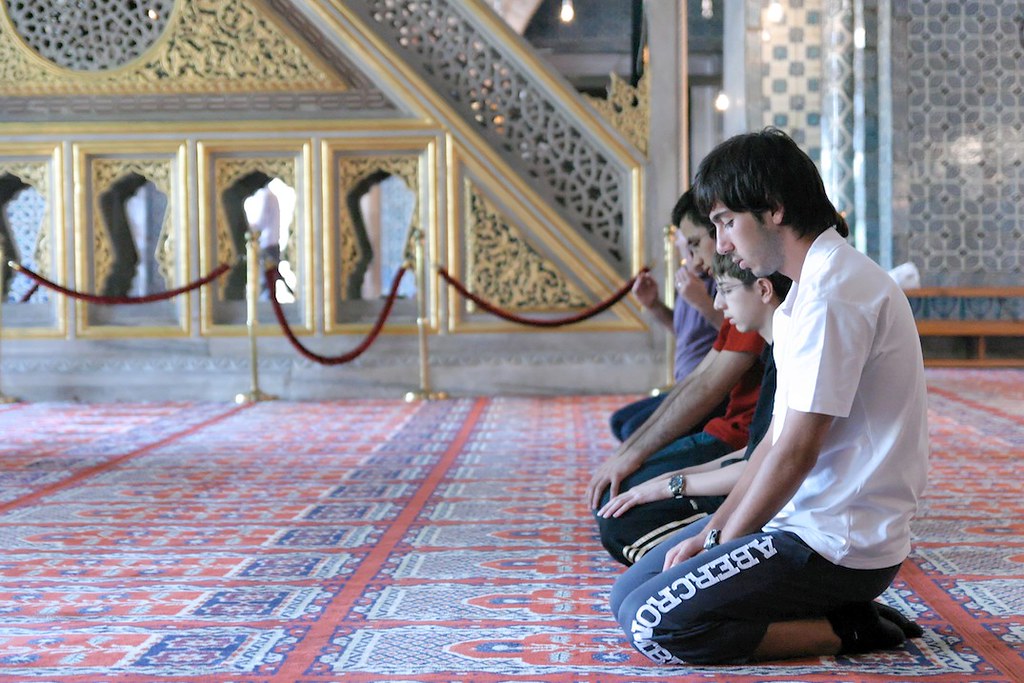
Ramadan Traditions
In Morocco, it’s important to know about the traditions and customs that are followed during the holy month of Ramadan. To make room for people who are fasting, office hours may be changed so that work days are shorter. Because of this, business transactions or responses may take longer than expected, so it’s important to be patient.
It is important to remember that some people may have less energy after fasting. Knowing and recognizing this can help you be more thoughtful when you’re with locals. It shows respect for their religious practices to be aware of their energy levels and not eat or drink in public during the day.
Post-Ramadan Celebrations
One of the most interesting things to do in Morocco during Ramadan is to watch the mosques say Taraweeh prayers. A group of people get together every night to read the Quran. This is a place of faith and community that you should check out for yourself.
During Ramadan, going to shows and cultural events in Morocco is a great way to learn about the past of the country. People play traditional music, and the streets are covered with bright lights. These events let you learn about the culture of the area while having fun at the parties after Ramadan.
Pros and Cons of Visiting Morocco in Ramadan
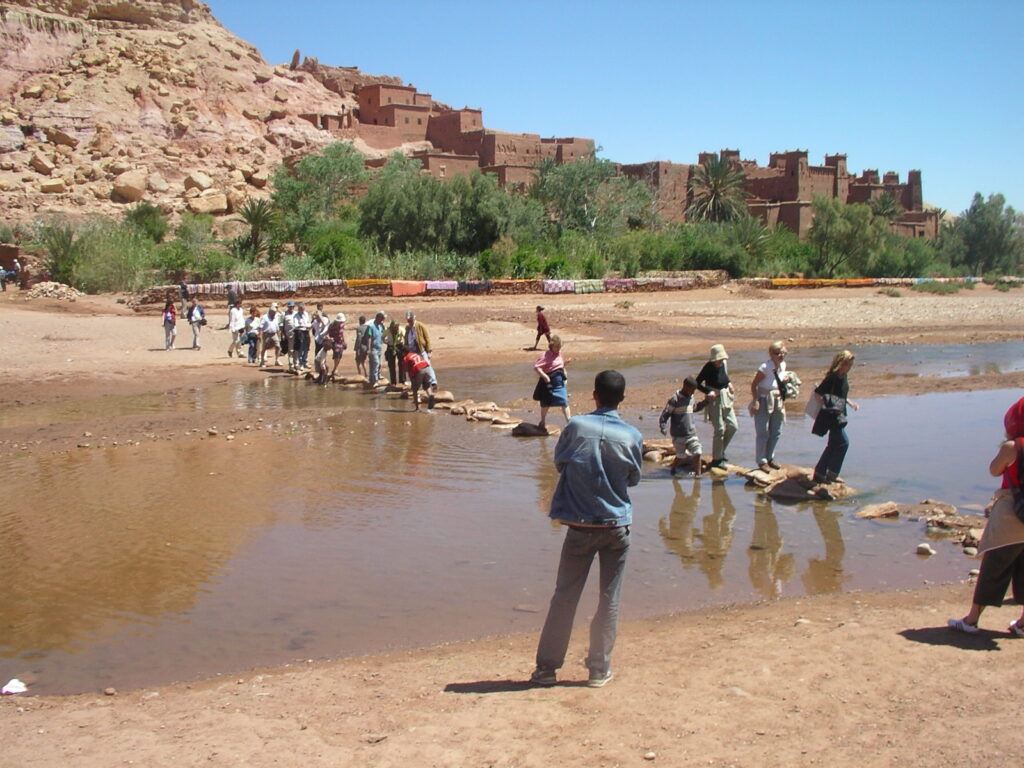
Advantages of Visiting Morocco in Ramadan
If you go to Morocco during Ramadan, you will have the unique chance to see Eid al-Fitr, a party that marks the end of the fasting month. At this time, people in the area celebrate by getting together to eat traditional foods and give each other gifts. People who visit Moroccan places during Eid will always remember how lively the mood is.
The streets are lit up with bright lights, and the air is full of laughter and happiness. Travelers can learn about Moroccan culture and traditions while having fun at these events.
Potential Challenges for visiting Morocco during Ramadan
To get used to the different ways of life in Morocco before Ramadan , it might take some time. Some people might think that not eating for a day is a sacrifice, but it helps keep mosques quiet while spiritual things happen. Going to these events is a great way to read about and learn about Moroccan religion and culture.
Check out how strong the community gets during Ramadan for something else fun to do. If a family lives close together, they break their fast together every night. People in Morocco really care about each other, as shown by their strong sense of community. People can also see how families get together for big events.
Personal Experiences for Visiting Morocco During Ramadan
Traveler testimonials.
During Ramadan , visitors to Morocco may not have many choices for eating during the day, so they need to plan ahead. Since companies may have different hours, it’s important to be able to adapt to new plans and services. To make sure a polite stay, it’s important to be aware of cultural sensitivity.
One visitor said that it was hard to find places that were open during the day, but they were able to do it by stocking up on snacks and eating a full suhoor (meal before dawn). Another visitor said that the times of public transportation had changed, so they had to change how they planned their trips. A traveler stressed the importance of respecting local customs by telling people to dress properly and not eat or drink in public.
Making changes during Ramadan can lead to unique times that make traveling more enjoyable.
Memorable Moments
During Ramadan, going to Morocco is a one-of-a-kind chance to do important things. A lot of tourists say that the warm and friendly Moroccans they met during this holy month made their trip even better. Talking to Moroccans during Ramadan is a great way to learn about their customs.
As a guest, I loved having iftar meals with Moroccan families. Iftar meals are meals that break the fast.
Because of these stories, going to Morocco during Ramadan can help you connect deeply with things and people that make visiting fun.
Closing Thoughts
You did a great job reading this whole thing! If you visit Morocco during Ramadan, you can see how spiritually important and long-lasting the traditions are during this holy month. This can be a unique and interesting experience. Make sure you take this chance with care and understanding and learn as much as you can about the local customs and ways of life. Good luck with this! It will not only help you learn more about Moroccan culture, but it will also give you memories you will never forget.
Remember these tips as you plan your trip to make sure everything goes well and you have a great time. Get into the spirit of Ramadan, eat lots of tasty food, and talk to people who live there to get the most out of your stay. Whether you’re taking the bus or going to a holy ceremony, you will have a better time in Morocco if you go into everything with an open heart and mind. Have a safe trip, and may your time in Morocco during Ramadan be full of joy, learning, and meeting important people.
Frequently Asked Questions
Yes, it is polite as long as you remember the practices and norms. Talk to people there, learn about how they do things, and be respectful during fasting times.
Because of the religious practice, please dress properly. It is best for women to wear clothes that are loose-fitting and cover their shoulders and legs. Men should also avoid dressing too casually.
Because of prayer times and shorter work hours, transportation plans may change. It’s best to plan your trips ahead of time and be ready for possible delays or changes in business hours.
A lot of places will be closed during the day. But after sunset prayers (iftar), there are busy food shops with a lot of traditional meals to help you break your fast.
Important things to do include being respectful and not eating or drinking in public during fasting hours. People enjoy it when you respect local norms by not doing loud things at night.
Leave a Reply Cancel Reply
Your email address will not be published. Required fields are marked *
You may use these HTML tags and attributes: <a href="" title="travel morocco during ramadan"> <abbr title="travel morocco during ramadan"> <acronym title="travel morocco during ramadan"> <b> <blockquote cite=""> <cite> <code> <del datetime=""> <em> <i> <q cite=""> <s> <strike> <strong>
Save my name, email, and website in this browser for the next time I comment.

Destinations > Africa > Morocco
Should You Travel to Morocco During Ramadan?
It seems you’re thinking about a trip to Morocco! Maybe you’re still in the exploration stage, or perhaps you’ve already planned out the details. You’re intrigued by the storied cities, desert landscapes, coastal towns, and mountain villages. You can almost see the mud brick kasbahs, taste the tagine, and smell the turmeric. Morocco, here you come!
Only one problem: you just discovered that your planned travel dates fall during Ramadan, the Muslim holy month of fasting. Morocco’s population is over 99% Muslim. What does this mean for your trip? Can visitors still travel in Morocco during Ramadan? Should you try to reschedule? If it’s the only time you have available, should you go anyway?
I wondered all of these things when planning a recent 1.5-month trip traveling through Morocco by a combination of bicycle and bus. We arrived literally the day after Ramadan began, so our entire first month was impacted by it. We got used to it, but when Eid al-Fitr finally arrived it felt wonderfully novel to eat ice cream in the street and order lunch from a restaurant! In our final two weeks in Morocco we experienced “normal” life, so we saw both sides and the contrast between them.
Ultimately I’m glad we decided to visit Morocco during Ramadan, and it worked out fine. We didn’t have any other time available, and I wouldn’t have wanted to miss this opportunity to experience the country. Thoughtful travel always has an element of challenge and cultural adaptation, and Ramadan amped up that aspect of the trip for us.
Should you travel to Morocco during Ramadan? I think it depends on what kind of trip you have planned and your goals for the visit. Read on to learn how Ramadan may impact your trip to Morocco.
Related: Bikepacking Southern Morocco: Route of the Caravans
Ramadan in Morocco
What is ramadan.
Ramadan is the ninth month of the Islamic lunar calendar, considered a holy month by Muslims around the world. During this month Muslims fast from sunrise until sunset, refraining from eating, drinking (including water!), and other “physical needs” including smoking and sex. Instead they focus on spiritual reflection, prayer, compassion for the less fortunate, and spending time with family and friends.
The month of fasting begins with the sighting of the crescent moon (hilal) – there is literally a moon sighting committee in Saudi Arabia for this purpose – and continues for the duration of the lunar month, either 29 or 30 days depending on the details of the moon sighting.
When is Ramadan in Morocco
Ramadan is observed at the same time by Muslims all around the world, including in Morocco. The Islamic calendar is a lunar calendar, which is 11 days shorter than the solar Gregorian calendar, so the dates of Ramadan shift earlier by 11 days every year. In 2023 Ramadan occurred from March 22 to April 20.
Below are predicted Ramadan dates for the next several years. Keep in mind that these dates are approximate and the official dates will vary by one or two days depending on precisely when the crescent moon is first observed. (Source: ING )
- 2024: March 11 through April 9
- 2025: March 1 – 29
- 2026: February 18 – March 19
- 2027: February 8 – March 8
If you’re thinking about visiting Morocco during Ramadan in future years, you’ll want to understand how the holy month is likely to impact your travel experience. Read on!
How Moroccans Observe Ramadan
In Morocco, as in other Muslim-majority countries, Ramadan is a special time filled with rich traditions. Just before dawn a pre-fast meal called “Suhur” is taken, followed by starting the day or perhaps taking a nap. Each evening the fast is broken at sunset with the “Iftar” meal, which often starts with dates and milk or water, followed by a rich feast of traditional Moroccan dishes like Harira (a tomato and lentil soup), tajines, and sweets like Chebakia.
Evenings are filled with prayer, and special night prayers called “Tarawih” are performed in mosques. Moroccan cities come alive with night markets offering food, clothing, and other items for the festivities of Eid al-Fitr, which marks the end of Ramadan. Moroccan television even airs special Ramadan programming, including series, shows, and spiritual programs.
Ramadan is a special time for family and community in the Muslim faith. The shared experience of fasting and breaking the fast together strengthens family bonds and community ties. Cooking traditional recipes becomes a cherished familial ritual. The act of giving, central to Ramadan, often involves the whole family offering charity to those less fortunate. At the end of the month, family and friends celebrate Eid al-Fitr together with yet more shared meals, prayers, charity, and gift giving.
Do all Moroccans observe Ramadan?
This is a very personal matter. It’s a legal requirement of all Muslim Moroccans, who can be fined if caught drinking or eating in public. We heard a few stories of folks sneaking water during the day, and given the scorching hot temperatures during our visit I personally think this should be excused.
Islam allows for standard exceptions in cases where fasting would be a hardship, traditionally: children; elderly; women who are pregnant, nursing, or menstruating; sick or weak people; and people who are traveling. These people can make up their obligation by fasting later, or if that’s not possible, by donating food to someone in need.
One of our guesthouse owners confided that he doesn’t observe Ramadan except publicly as required, as he believes people can “be good” in a moral sense without following strict religious traditions. A few others told us they appreciated the health benefits of fasting, as if to emphasize the secular benefits of the religious tradition (possibly for the benefit of our secular American sensibilities). On the whole though, it seemed the vast majority of Moroccans do observe Ramadan and are proud of the role it plays in their religious devotion and community culture.
How Ramadan Impacts Travel in Morocco
You’re probably here to find out whether it’s a good idea to visit Morocco during Ramadan. I definitely wondered the same thing when we planned our trip, but couldn’t find much information about the actual experience. I hope these observations will give you a sense of what to expect so you can make your decision.
Tourist Services Continue
If your trip to Morocco is mostly about organized tours and activities, you can expect it to continue as usual. Obviously it’s good to verify essential parts of your itinerary in advance, as smaller operations could potentially reduce their offerings during Ramadan. But we generally noticed that guides, drivers, and instructors were working as usual.
Yes, your guide or driver will likely be fasting. And yes, they are used to tourists eating and drinking in front of them. Though it may feel awkward at first, they will almost certainly encourage you to go ahead. We noticed that many Moroccans liked to talk about Ramadan and what it means to them, so perhaps this is an opening for a good conversation.
We took a week of kitesurfing lessons in Dakhla (technically Western Sahara, but regarded by some as part of Morocco) during Ramadan, and our instructor was fasting. We’ll never know if he might have been a bit more cheerful and patient at other times of the year, but he did his job and we were happy.

Tourist Attractions May Have Shorter Hours
Major tourist attractions in Morocco — museums, palaces, ruins, etc — generally stay open during Ramadan but may have reduced hours . In Marrakech we noticed many attractions closing two hours earlier than usual during Ramadan. You won’t find this change in Google Maps, and it caught us and many others off-guard until we figured out the pattern. Start your exploring early and call to ask about hours if in doubt.

Hotels Are Open, But May Be Quiet
In hotels that cater to tourists you may not notice much difference during Ramadan; everything will operate as usual. Hotels focused on a local clientele may be quieter than usual during Ramadan; in a number of cases it seemed we were the only people there! Though this was mostly not a problem, the staff seemed a bit less available than usual. We waited a couple hours to check out one morning when the person we needed was apparently enjoying a Ramadan-inspired morning nap.

Many (But Not All) Restaurants are Closed Until Sunset
In the most touristy areas of Morocco, restaurants stay open during Ramadan. We saw vendors selling street food and sweets in the souks of Marrakech, and restaurants along the beach in Agadir were open as usual. Guesthouses with kitchens still serve their guests during daylight, though you’ll probably need to wait for the staff to break their fast before they make your dinner. If your activities focus mostly on tourist hotspots, you won’t go hungry.
Outside of the most touristy areas, restaurants will be closed until sunset during Ramadan in Morocco. Restaurants in small towns and villages, cafes at bus stations, even the coffee shops in modern downtown Agadir were always closed before sunset, or at best only serving take-away pastries. If you’re out exploring less touristy areas, prepare to rely on grocery store snacks or food you prepare at your lodging to get you through to dinnertime.
Come sunset we could usually find a restaurant serving iftar, the traditional meal that breaks the fast, and were allowed to join in. This can actually be a benefit in larger towns where some restaurants offer a festive fixed menu of traditional iftar food.

A bit later, after people are finished enjoying iftar with their families, many restaurants reopen from around 9pm until late. Moroccans tend to eat dinner late anyway, but especially during Ramadan we felt like it was almost bedtime before the dinner scene really got going. We could always find something, but our meals were less predictable and not as simple as just walking into any restaurant and looking at a menu.
Grocery and Convenience Stores are Open
Though restaurants may be closed during daylight hours, you can always find food at grocery stores and convenience stores. In big cities this means modern grocery stores full of options, while in a village you might find a single corner shop with some yogurt drinks and other snacks. You can also buy bottled water, fresh produce, bread, and many other items at street stalls which stay open during Ramadan.
The catch is that shop hours may be reduced, especially in small towns. Shops may open later in the day, close during the iftar meal around sunset, and reopen after around 9pm. Another challenge is that after you buy your snacks you’ll want to find a discreet place to eat them.

Tourists Should Be Discreet When Eating in Public
As a non-Muslim tourist, you won’t be expected to fast. Moroccans know you are eating and drinking and won’t begrudge you for it. But basic courtesy says it’s rude to eat and drink in front of people who cannot. As a tourist you should be discreet about eating and drinking in public between sunrise and sunset during Ramadan in Morocco.
Of course you may need a snack or a sip of water while you’re out exploring. This is totally fine, just be polite about it. If you’re in a touristy area where restaurants are open, it’s no problem. But if no one around you is eating or drinking, find a quiet spot and make an effort to be discreet. This is more a matter of manners than rules, so just try your best. The thing to avoid is buying a big juicy sandwich or delicious ice cream in a touristy area and then wandering into a less touristy area while blatantly enjoying your treat.
Early in our trip on a hot day in Agadir, we bought milkshakes from a shop by the beach. There were tourists everywhere and restaurants were open, but we made the mistake of carrying our milkshakes up the hill away from the tourist area. Almost immediately a pair of young men, apparently hungry, shouted some not-so-friendly curse words at us. Realizing our mistake, we scurried back to the touristy beach with our tails between our legs. I felt bad for being rude, and I also felt their response was not aligned with the spirit of Ramadan and probably unusual. Most Moroccans will be more understanding, but we did make a mistake and their reaction served as an important reminder. We never made the same mistake again!
Transportation Still Runs
Moroccans may be fasting, but they still need to get around. Transport generally runs as usual. We took the CTM bus several times during Ramadan in Morocco, including a 20-hour journey from Dakhla to Agadir. It was a minor inconvenience that cafes at the bus stations were closed and we had to be sneaky about snacking, but it was hard to complain knowing our fellow passengers were fasting. We really enjoyed the experience of stopping for Iftar at a roadside cafe and sharing the celebratory spirit of our fellow passengers breaking the fast.
I had read that travelers are exempt from fasting according to Islamic tradition, so I was actually surprised to find people fasting on the bus ride. I don’t know if this is typical or not, but we didn’t see anyone eating or drinking on the bus or at bus stations during Ramadan.
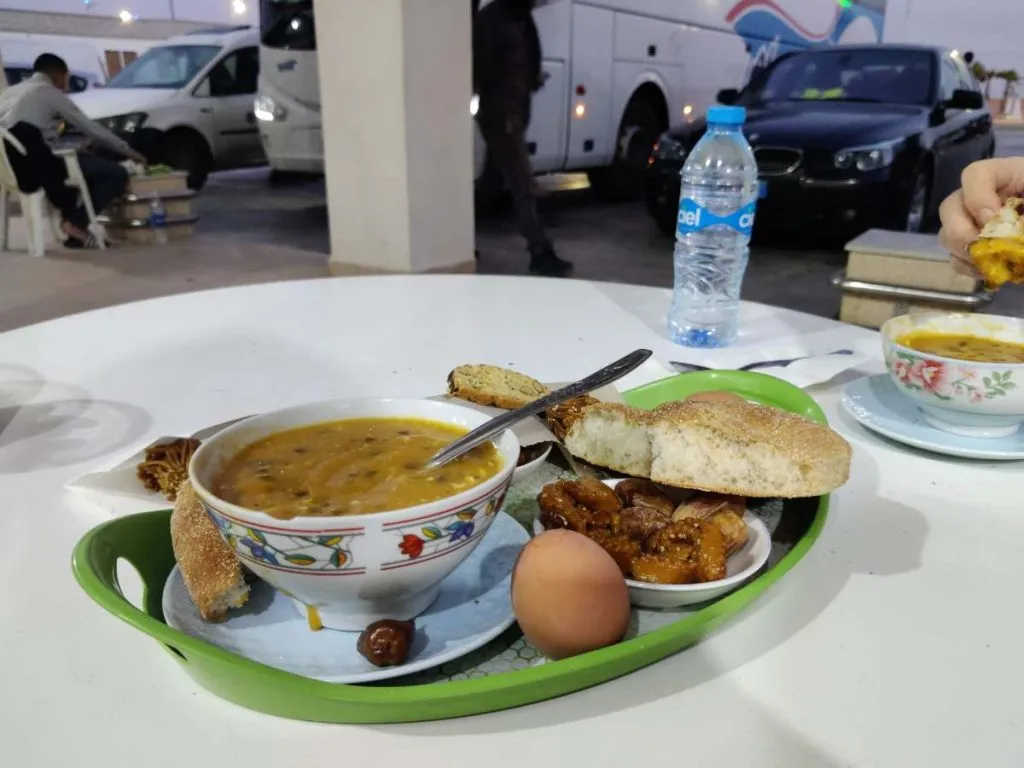
Streets Are Quiet, But Come Alive Later
This is one of the harder factors to quantify, but it can make a difference in the vibe of your travel experience. During Ramadan the late afternoons can feel a bit gloomy in Moroccan towns. The streets are quiet, some shops are closed, and there can be a sense of lethargy as people sit around counting the minutes until they get to break the fast. This isn’t as true in the major cities like Marrakesh and Fes, but we definitely noticed it in smaller towns.
After Iftar, however, the streets come alive as families visit, do their shopping, and go to the mosque for evening prayers. If you’re a night owl and like exploring after dark, you may enjoy Ramadan in Morocco. When the holy month falls during the hotter season it’s especially nice to go wandering as the relentless heat of daylight finally eases.
People May be Cranky
I read about this in advance and was amused to find that it’s actually true: you’re more likely to witness “hangry” outbursts in Morocco when visiting during Ramadan. We saw a handful of minor incidents including a road rage rant between our bus driver and a taxi driver. Of course these things can happen any time, but I wouldn’t be surprised if an entire country of hungry people increases the likelihood. If you travel in Morocco during Ramadan I’d suggest practicing empathy for the people around you who may not be feeling at their best.
After Ramadan: Eid al-Fitr
After a month of fasting, Moroccans and other Muslims around the world celebrate the end of Ramadan with Eid al-Fitr. This three day festival is a time for prayers, celebratory meals, charity, spending time with family and friends, and gifting new clothing and other treats to children. Because the exact date depends on the sighting of the moon, it’s not unusual for the date to be announced just a few days before the festivities begin. When we were in Morocco even the locals were waiting to hear exactly which day would mark the end of their fasting.
We had the pleasure of experiencing Eid al-Fitr in Zagora, and it was indeed a joyous time. In the early evening we wandered around town, soaking up the vibrancy of so many people out strolling the streets in their fancy clothes. The mood was lively and bustling compared to the quieter weeks of Ramadan. People were in a great mood, smiling and greeting us for no particular reason. We ate a meal before sunset at a small local restaurant and sipped yogurt drinks on the sidewalk, a first since arriving in Morocco at the very beginning of Ramadan.
If you’re wondering about traveling in Morocco during Eid al-Fitr, you first need to know that there are two “Eids” in the Islamic calendar; “Eid” just means “celebration” or “festival” in Arabic. So if you see people talking about traveling during Eid, you need to know which one they’re talking about. Eid al-Fitr is actually the smaller of the two holidays, and we didn’t find it particularly disruptive to our travels. Some smaller shops were closed at unusual hours during the first couple days of the holiday, but most things seemed to go on as usual.
Eid al-Adha, the other “eid,” happens about 40 days after Eid al-Fitr. It’s a longer and more significant holiday involving family celebrations and sacrificing of sheep. When you hear that people often travel to be with their families during Eid and thus all the shops and attractions are closed, they are probably referring to Eid al-Adha. During this celebration you may find it hard to travel since the country is focused on their holiday. I imagine it’s like trying to travel during Christmas in America when you don’t actually celebrate Christmas.
Should you visit Morocco during Ramadan?
After reading all of this, perhaps you’re still wondering whether to visit Morocco during Ramadan. I don’t think there’s one right answer for everyone. The best decision for you depends on the type of travel you want to do and what you hope to get out of it. Here are a few cases that come to mind:
Short trip to tourist hot spots : If you’re only spending time in big cities and at touristy attractions, and you don’t particularly care about getting off the beaten path, Ramadan might not impact your trip very much.
Mostly guided and organized activities : If you’re on a guided trip or all-inclusive stay where your meals and logistics are handled for you, the impacts of Ramadan may not be as noticeable to you. If possible, talk to your guide about spending some time exploring in the evenings when the streets are more lively.
Self-contained trip by car, van, or bicycle: If you’re on a long independent trip through less touristy areas, especially if equipped to cook for yourself, you might find the cultural aspects of Ramadan interesting. It will definitely change your experience and will sometimes be inconvenient, but if you’re this type of traveler you can probably handle it. Ideally plan your trip to include Eid al-Fitr so you can experience the contrasts between Ramadan, Eid, and the more typical rhythm of Moroccan life.
Backpacking: If you plan to travel off the beaten path by public transport, Ramadan could be a bit inconvenient. Smaller towns will have a quieter vibe during the day and you might struggle to find satisfying meals. You might consider buying a camping stove (available in hardware stores) so you can cook your own meals on occasion.
For most travelers, if you have the choice between visiting Morocco during Ramadan and at another time, I would lean toward not going during Ramadan. This is especially true if it’ll be your first time in Morocco or this is a once-in-a-lifetime kind of trip for you. But if you don’t have much choice in the timing and you really want to experience Morocco, I think you can still have a great trip during Ramadan.
Some people advocate for visiting Morocco during Ramadan because of the “cultural experience,” making it sound like you’ll certainly be invited to share in an iftar meal or an Eid celebration. I want to note that this is hit or miss. Ramadan and Eid al-Fitr are family-focused holidays for Moroccans, and we visitors cannot expect to be welcomed into their celebrations. Sure, if you are out exploring off the beaten path and happen to connect with a local, you may find yourself with a genuine moment of cultural exchange. But as a tourist, most likely you’ll be watching the festivities from the outside, which is perfectly fine too.
Our experience of Ramadan in Morocco was mixed, but ultimately I’m glad we went. At first we didn’t mind the inconvenience of restaurants being closed since we were traveling with a camping stove. As the weeks wore on, we did sometimes feel frustrated by the challenge of finding a satisfying meal. It was a minor inconvenience to avoid eating and drinking in public, especially when we rolled into a town hungry and thirsty and had to find an isolated spot to enjoy our snacks and cold drinks. When Ramadan finally ended and we got used to eating and drinking in public (which took a few days) our travel experience felt a bit more relaxed.
On the other hand, it was interesting to learn more about such a significant part of Islamic life around the world. I now have an even greater respect for Muslims, their religious devotion and strong sense of community. We enjoyed experiences that wouldn’t have happened at other times of the year: talking with Moroccans about their experience of fasting and their feelings about religion, sharing a celebratory iftar meal with fellow passengers on a long bus ride, and seeing the cheerfulness of Eid al-Fitr on display in the streets of Zagora. It’s hard to know how the trip would have felt at a different time, but I do feel like we experienced what we came for in Morocco both in spite of, and because of, Ramadan.
More Travel Resources
If you enjoy adventurous travel, you might also like these:
- Egypt: Exploring Luxor’s West Bank by Bicycle
- West Africa Travel Essentials
- Checklist: Must-Do’s to Prep for an International Trip
Or visit the travel section for lots more.
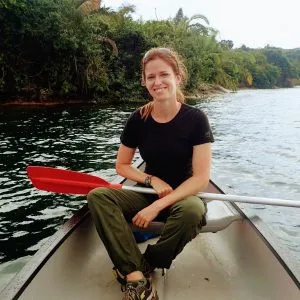
About the Author
Hi there, I’m Alissa, founder of Exploring Wild. I’ve had the pleasure of traveling independently and solo on six continents, including some unusual destinations like Liberia and Sudan, and it has forever changed the way I see the world and myself. Learn more about me here .


Travel resources in your inbox?
There’s more where this came from! If you’re into adventurous, thoughtful, off-the-beaten-track travel, sign up here for occasional emails with my best tips and inspiration.

Share the Adventure
If you found this article helpful, please consider sharing so more people can benefit from it:
Leave a Comment Cancel reply
New in travel.

How to Meet Locals While Traveling (In Any Country)

Taking the Ferry Between Ayamonte, Spain and Vila Real de Santo António, Portugal
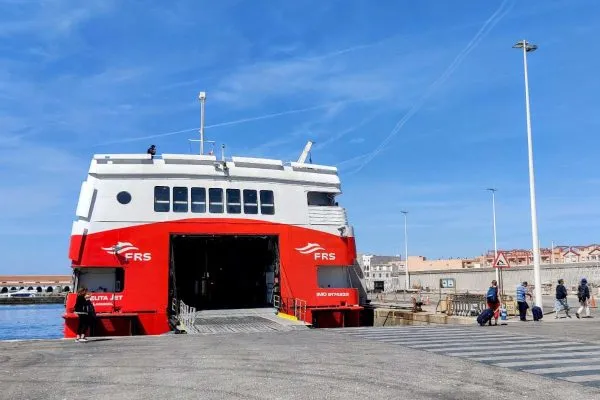
How to Take the Ferry Between Tarifa, Spain and Tangier, Morocco

CTM Buses in Morocco: How to Ride & What to Expect
See all travel.
Bikepacking & Touring Rides and Routes Tips and Skills Bikes and Parts Gear and Reviews
Hiking & Backpacking Trails and Trips Gear and Clothing Tips and Advice Trip Planning Workbook
Adventure Travel Explore by Region Camping and Outdoors Mindful Travel
Donate to Tip Jar
About Exploring Wild
Web Stories
Adventure in Your Inbox?
Resources and inspiration to support your wildest dreams:
Affiliate Disclosure: This site participates in affiliate programs, including Amazon Associates. Sometimes my posts contain affiliate links, and if you make a purchase through these links, I may earn a small commission at no additional cost to you. I only recommend and link to products I know and love. Thanks for reading!
Trust & Transparency Policy
About | Contact | Privacy Policy
Copyright 2024 Exploring Wild, All Rights Reserved
Exclusive Member of Mediavine Home
Privacy Overview
Best Morocco Travel

Ramadan in Morocco: What You Need to Know
Table of Contents

Ramadan in Morocco coincides with the dates observed in the wider Islamic world, occurring during the ninth month of the Muslim calendar, which follows the lunar cycle, in contrast to the solar calendar commonly used in the West. This unique characteristic causes Ramadan to shift to different dates each year. If you are planning to travel to Morocco, Best Morocco Travel recommends considering Ramadan. In the following paragraphs, we will elucidate the essence of Ramadan and provide valuable insights and guidance for travelers.
What Ramadan is Like in Morocco
In Morocco, Ramadan is observed with a strict adherence, particularly in public life. This month-long period requires all Muslims to fast during daylight hours and refrain from various temptations, including sexual relations and the use of substances like tobacco or drugs. This practice, deeply rooted in Islamic belief, is seen as a means of purifying the body and cultivating self-discipline.
As the day turns to night, the atmosphere undergoes a remarkable transformation. Moroccans, often gathered with family and friends, celebrate with great enthusiasm the successful completion of their daily fast. This festive and communal spirit fills the air, especially within the confines of homes.
Notably, Ramadan exerts a profound influence on urban life in Morocco. Cities take on a more subdued character, with many establishments closing their doors, and streets witnessing a notable reduction in activity during the daylight hours. This marked contrast to the lively atmosphere that emerges after sunset is a characteristic feature of Ramadan in Morocco, particularly within the intimate setting of family life.

Traveling to Morocco During Ramadan: Is it Recommended or Not?
Considering these factors, a pertinent question arises: Is traveling to Morocco during Ramadan truly worthwhile? As with many aspects of life, opinions diverge. Here, we present you with reasons both in favor of and against planning your Morocco trip during this unique period.
What Should I Expect in Ramadan?
Every evening, as the time to break the fast approaches, the resonating sound of cannons signals the moment. At this juncture, Muslims partake in a meal known as F’tour or iftar. Traditionally, this fast-breaking begins with a sip of water and a few dates, a gesture in homage to how Prophet Mohammed himself broke his fast. This modest meal marks just the commencement of a night filled with a bountiful feast.
Following F’tour, the streets come alive with the joyful sight of children playing and adults socializing with neighbors and friends. North African Muslims often extend their waking hours well beyond their usual bedtime, cherishing the opportunity to share meals and quality time with their families. It’s a highly social period. Before the break of dawn, they rise for another meal and then return to slumber to replenish their energy.
The culinary experiences during Ramadan are indeed special. This month brings forth a range of traditional dishes that are exclusively enjoyed during this time. Among the customary offerings are Harira (Moroccan soup), dates, and Chebakia, adding to the richness of the Ramadan experience.
Reasons Why it is Not Advisable to Travel to Morocco in Ramadan
In most cases, we do not recommend visiting Morocco during Ramadan , as the entire country adjusts to the rhythms of this sacred observance. Consequently, it’s common to encounter numerous establishments closed during the daytime. Additionally, many Moroccans take advantage of this time to enjoy their vacations, potentially diminishing the traveler’s opportunity to experience the country in its full splendor.
Another aspect to consider is the prevailing mood. Fasting and self-restraint entail both physical and mental exertion, which individuals tolerate differently. Consequently, during these days, it’s not uncommon to encounter Moroccans with a more somber disposition and reduced work enthusiasm. This change in demeanor is understandable given the considerable effort required for fasting. As a result, local people tend to be more sensitive during Ramadan, making it vital for visitors to exercise caution. Actions that might be innocuous on other occasions can be misconstrued as disrespectful during this sacred month.
Reasons to Know About Ramadan in Morocco
Conversely, Ramadan does not dissuade many travelers; instead, they perceive it as a captivating opportunity to delve into a distinctive facet of Moroccan culture.
Moreover, during this period, the country takes on a vibrant nocturnal life. The bustling souks become crowded with people, and an array of products, some of which are rarely seen or in limited supply on other occasions, grace the market stalls. Traveling during Ramadan possesses a unique allure, particularly for those tourists with an adventurous spirit and a keen interest in cultural and ethnographic aspects.
Nonetheless, it is our view that, for the majority of tourists, this season may pose more inconveniences than advantages. Consequently, we recommend that you ascertain the date of the upcoming holy month for Muslims and thoughtfully weigh the pros and cons before planning a trip that coincides with Ramadan in Morocco.
How Do I Respect Moroccan Culture During Ramadan?
You won’t face judgment for not participating in Ramadan, but it’s essential to uphold respect for the culture you are in.
Moroccans are exceptionally hospitable toward tourists and travelers, and they understand and respect different religious beliefs. They do not expect non-Muslims to fast during Ramadan.
Some ways to show respect for local culture during Ramadan:
Considerate Eating and Drinking: Avoid openly snacking or drinking from a water bottle while walking through the streets of Medina, especially during fasting hours. Try to do these activities in a more private setting. Also, refrain from smoking in public areas.
Mindful Dress: Dress modestly, particularly in North African countries, where modesty is highly regarded and emphasized, even more so during Ramadan. Avoid wearing shorts, miniskirts, and clothing that exposes bare shoulders.
Accept Invitations: If a local invites you to join in the breaking of the fast, whether for F’tour or Eid celebration, it’s a gracious gesture to accept. There is no better way to experience Ramadan than in the home of a local family. While this might lead to staying up later than your usual routine, it promises an irreplaceable cultural experience.
Ultimately, the decision to travel to Morocco during Ramadan is yours to make. While it may alter the course of your vacation to some extent, we believe that Ramadan offers a unique cultural experience that can be profoundly enriching.
When is Ramadan in Morocco
Ramadan is universally observed by Muslims worldwide, including in Morocco. The Islamic calendar, being lunar, is approximately 11 days shorter than the solar Gregorian calendar—consequently, the dates of Ramadan shift earlier by about 11 days each year. In 2023, Ramadan took place from March 22 to April 20.
Here are the projected Ramadan dates for the coming years. It’s important to note that these dates are approximate, and the official start may vary by one or two days, depending on the precise sighting of the crescent moon (Source: ING):
- 2024: March 11 through April 9
- 2025: March 1 – 29
- 2026: February 18 – March 19
If you are contemplating a visit to Morocco during Ramadan in the years ahead, understanding how this holy month is likely to influence your travel experience is essential.
After Ramadan Eid al-Fitr
After a month of fasting, Moroccans and Muslims worldwide celebrate the conclusion of Ramadan with Eid al-Fitr. This three-day festival is a time for prayers, festive meals, acts of charity, quality time with family and friends, and the gift of new clothing and treats to children. Because the precise date depends on the sighting of the moon, it’s not uncommon for the announcement of the date to occur just a few days before the festivities commence. Even the locals in Morocco eagerly awaited the official date marking the end of their fasting.
We were fortunate to experience Eid al-Fitr in Zagora, and it was truly a joyous occasion. In the early evening, we wandered through town, absorbing the vibrancy of the many people strolling the streets in their finest attire. The atmosphere was bustling and lively, a stark contrast to the more subdued weeks of Ramadan. People were in high spirits, smiling and greeting others for no specific reason. We enjoyed a pre-sunset meal at a small local restaurant and savored yogurt drinks on the sidewalk, a first since our arrival in Morocco at the start of Ramadan.
If you are considering traveling to Morocco during Eid al-Fitr, it’s important to note that there are two major “Eids” in the Islamic calendar. “Eid” means “celebration” or “festival” in Arabic. Therefore, it’s crucial to ascertain which one is being discussed when people mention traveling during Eid. Eid al-Fitr is the smallest of the two holidays, and we found it to have a relatively minor impact on our travels. Some smaller shops had irregular opening hours during the first couple of days of the holiday, but most things seemed to proceed as usual.
Eid al-Adha, the other “Eid,” occurs approximately 40 days after Eid al-Fitr. It is a longer and more significant holiday characterized by family gatherings and the sacrifice of sheep. When you hear about people traveling to be with their families during Eid, and as a result, many shops and attractions are closed, they are likely referring to Eid al-Adha. During this celebration, it may be challenging to travel, as the entire country is engrossed in their holiday festivities.
WhatsApp Us
Join our Adventure: Get all my insider tips for traveling on a budget
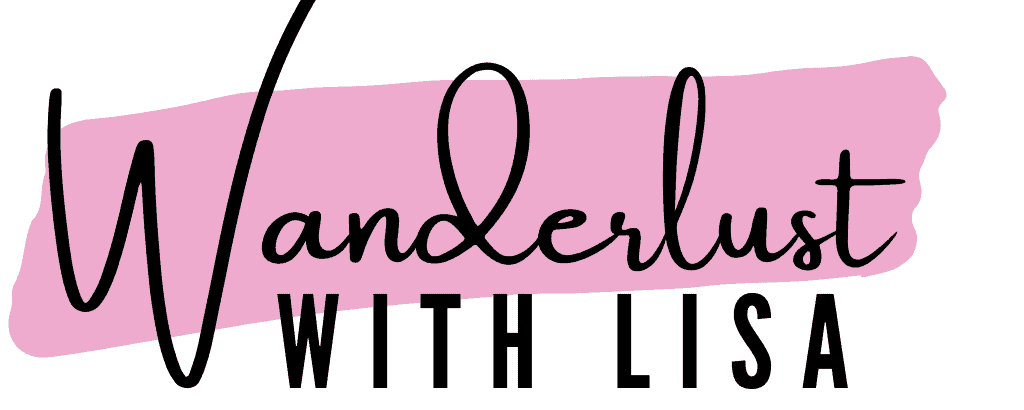
The Truth About Visiting Morocco During Ramadan
Morocco is a breathtaking country with lots of culture, architecture, and food to experience. However, you may be worried about experiencing the food aspect of their culture if you plan to visit during Ramadan.
Speaking from personal experience, there are numerous pros and cons of visiting Morocco during Ramadan. Below I’m outlining my experience of visiting Morocco during Ramadan, best tips and tricks as a tourist, and the pros and cons of traveling to Morocco during this timeframe.
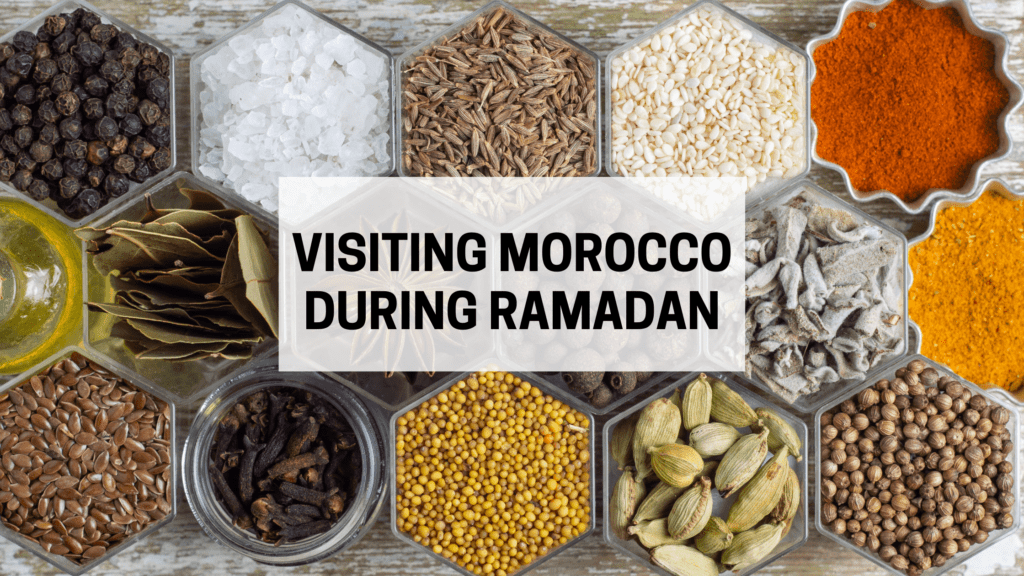
First, a little about Ramadan…
Ramadan is an Islamic holiday that is celebrated for 30 days each year. There isn’t a fix date/time of year that it is celebrated, as the Islamic calendar is based on the lunar pattern. View this Ramadan calendar to see the timeframe for the next 10 years.
During Ramadan, Muslims fast during the day and avoid all food, water, juices, etc. Eating is only permitted when the sun goes down up until the sun rises again the next morning.
Muslims spend this month reflecting on their blessings and experiencing the suffering of those who are less fortunate.
Foreigners Visiting Morocco During Ramadan
There are probably numerous questions running through your mind as you read about Ramadan… Will I have to practice Ramadan as a foreigner? Will restaurants be closed during the day? Is it frowned upon if I eat and drink during the day?
The short answer – Ramadan won’t drastically change your trip. Yes, some restaurants and shops may be closed or have strange hours, but you’ll still be able to find food for lunch, eat in public, enjoy the local cuisine, and more. Below I’m going to break down a standard day in Morocco during Ramadan.
Morning During Ramadan
Many Moroccans will have a slow start to the day. Why is this? They typically wake up around 4AM for their final meal before their fast. After eating and praying, they tend to go back to bed and rest for the first few hours of the day.
As a tourist, this means that some shops may open a little later than normal, the markets may feel quieter in the morning, and restaurant choices may feel limited.
You’ll still be able to find coffee shops and touristy cafes open to serve you breakfast in the morning.
Instead of being frustrated by the delayed start, enjoy the quiet mornings and explore without too much traffic or distraction. I found it to be a perfect opportunity to take pictures without too many people in the background!
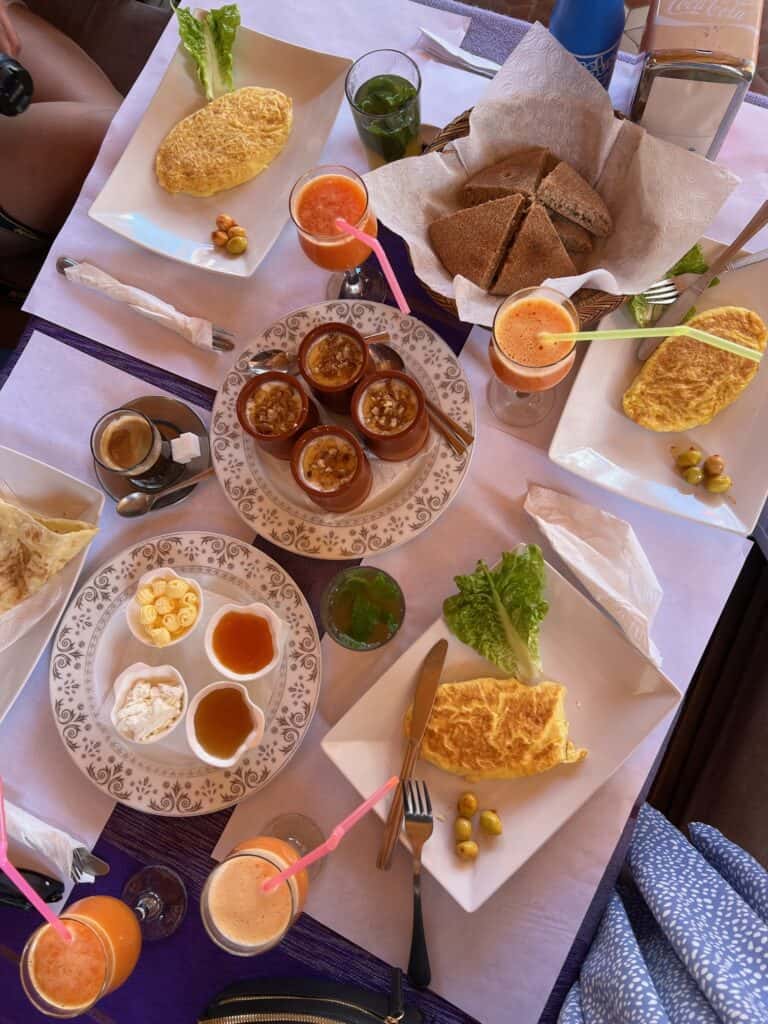
Afternoon During Ramadan
My biggest fear when visiting Morocco during Ramadan was this question: Will I be able to eat lunch?! I was worried that since lunchtime is smackdab in the middle of the fast, all places would be closed.
However, this is far from the truth. Almost all touristy cities (Marrakesh, Fez, Chefchaeoun, etc) had a variety of restaurants open and available for tourists to enjoy.
There was only one day during my 10 day trip where I struggled to find somewhere to eat. This resulted in me having Pizza Hut for lunch (as fast food chains are almost guaranteed to stay open during this time). My other option would’ve been going to one of the grocery stores for a sandwich and chips.
Evening During Ramadan
You’re probably thinking “the fast is over in the evening, everything should go back to normal” — wrong!
Since all Muslims break their fast as the sun goes down (around 6-7PM), you’ll notice all shops and restaurants will close abruptly to accommodate this. The streets feel like a ghost town for the first 30 minutes that the sun goes down as everyone is eating and celebrating with their families.
After 30 minutes to an hour, shops & restaurants will reopen their doors for tourists once again. I would plan on getting a small snack around 4PM and waiting until 8PM for your official dinner.
Later in the evening, you may hear lots of celebrating in the streets. The locals tend to stay awake late into the night since this is the only time they can eat and are now energized with food!
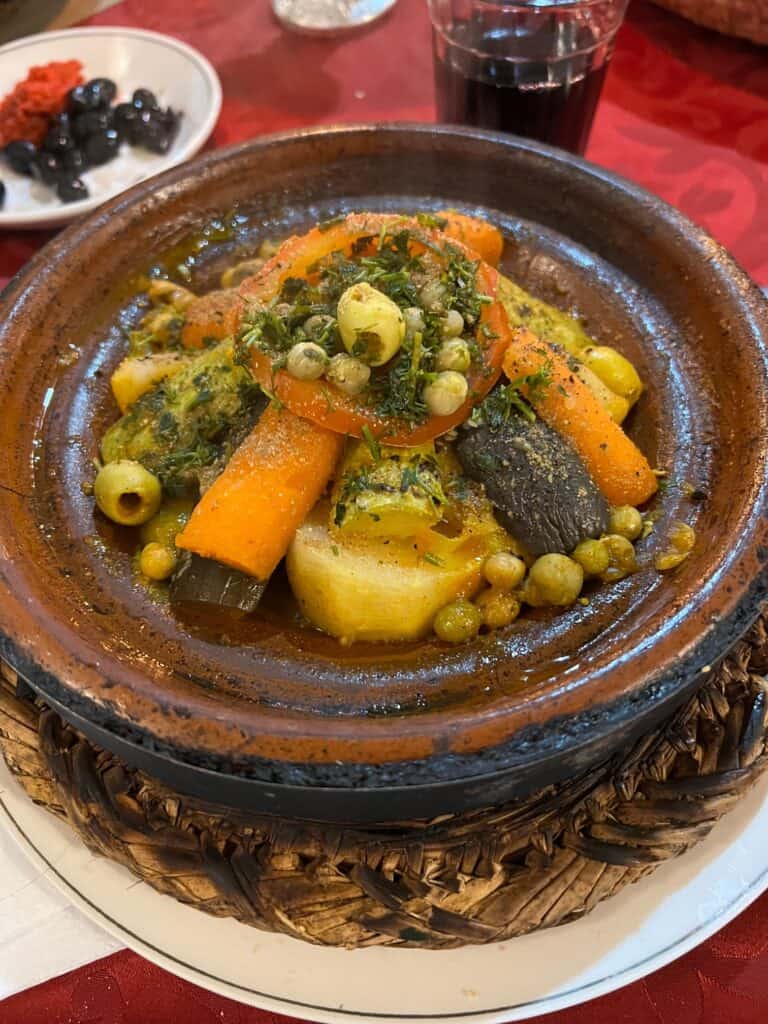
Pros & Cons of Visiting Morocco During Ramadan
Pros of Visiting Morocco During Ramadan
- Unique culture experience
- Added appreciation for the people and their devotion to their religion
- Less tourists visit during this time, making it more affordable
Cons of Visiting Morocco During Ramadan
- Weird hours of operation for restaurants and shops
- Closure of all nightclubs, bars, and liquor stores
- Tramdina – the idea that fasting people can be rude, short tempered, or violent (I personally didn’t experience this at all, but something to be mindful of during Ramadan)
Overall, you’ll need to weigh the pros and cons to decide if visiting Morocco during Ramadan is worth it to you. My answer – it is absolutely worth it! This is a unique experience that you’ll only get once a year and doesn’t drastically affect your overall vacation.
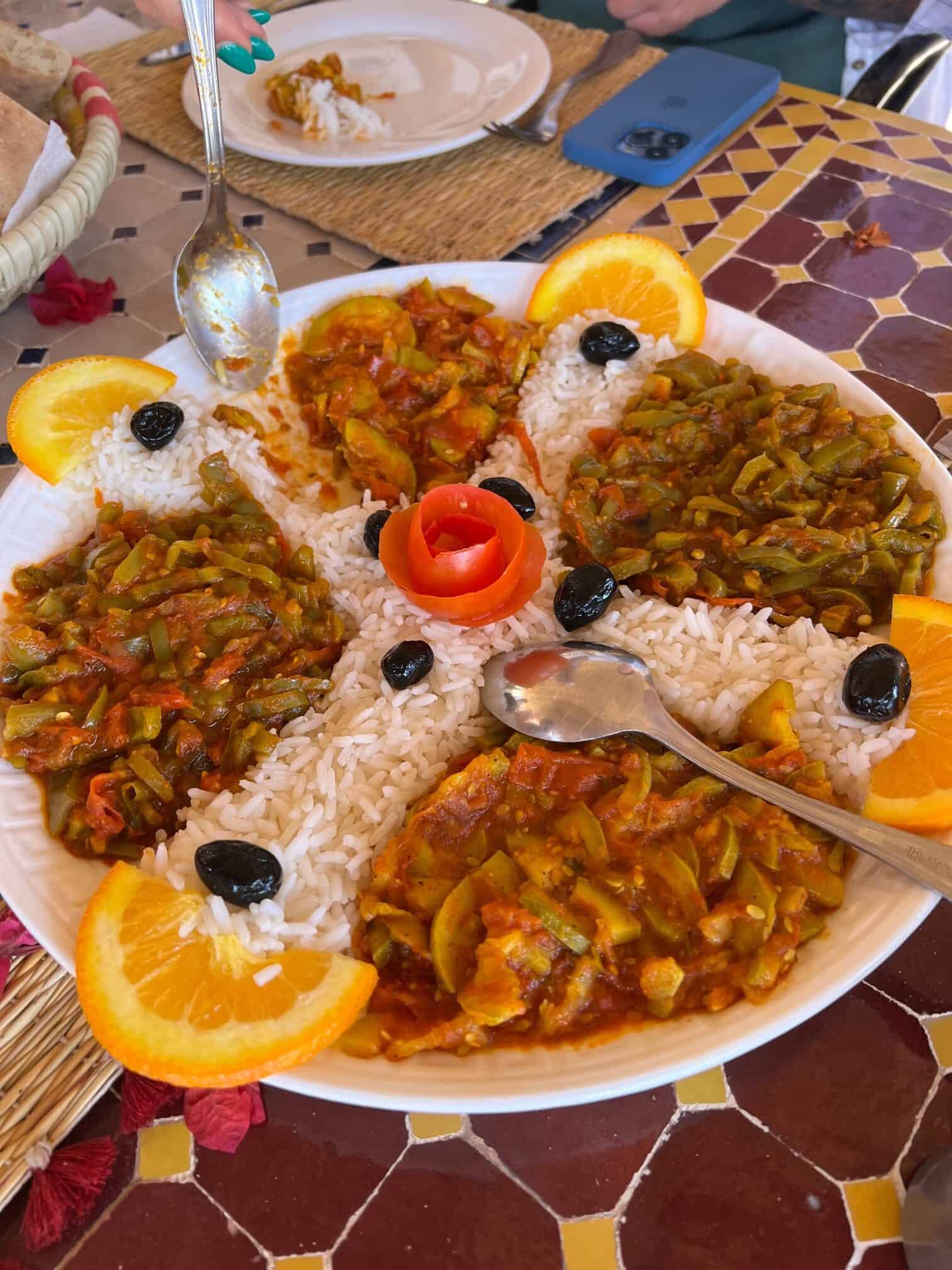
Tips on Visiting Morocco During Ramadan
- Purchase lots of water the night before (to have on hand throughout the day, just in case)
- Stock up on snacks from convenience stores at night
- Stick to the touristy areas for breakfast & lunch
- Alcohol is almost impossible to find as it is incredibly frowned upon during Ramadan – your best chance of getting alcohol is in riads, hotels, or “touristy” restaurants
- Be respectful – don’t blatantly eat food in front of locals during the day
- After the month of Ramadan, locals celebrate Eid al-Fitr (comparable to Western Christmas) – expect even more limited availability this day as locals will spend time with family
- Modesty is important in Morocco, but even more so during Ramadan
There you have it on all the best tips on visiting Morocco during Ramadan! If you have other questions about the experience, please feel free to drop them in the comments below!

Save this post on “ The Truth About Visiting Morocco During Ramadan ” here on Pinterest:
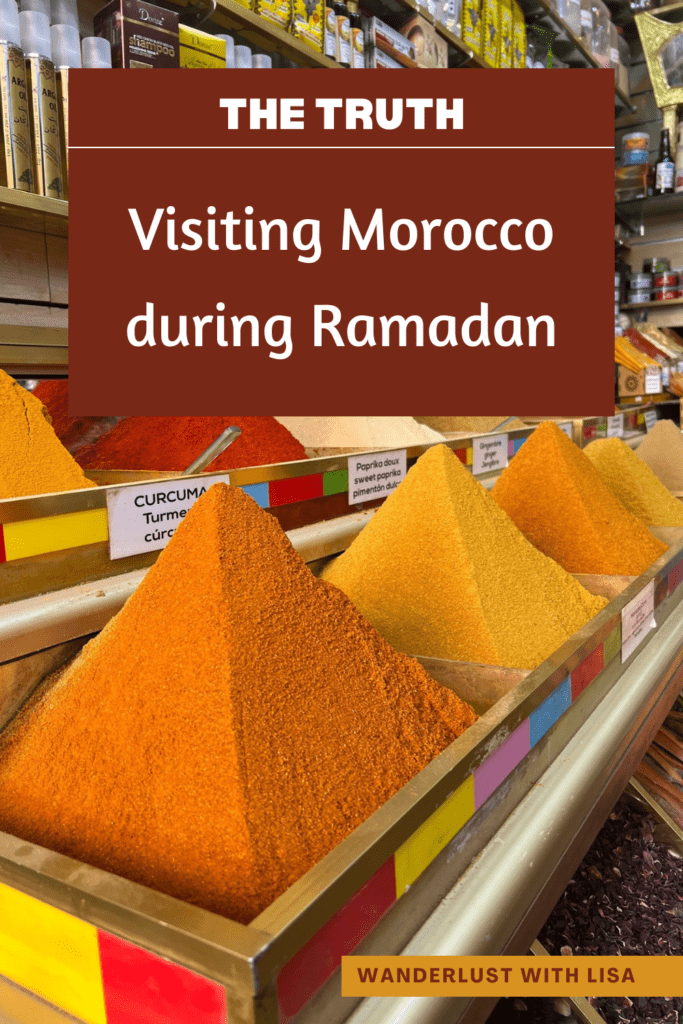
Related Morocco Blog Posts:
- 30 Things To Know Before You Visit Morocco
- 15 Things To Do in Chefchaouen
- Visiting the Sahara Desert
Similar Posts
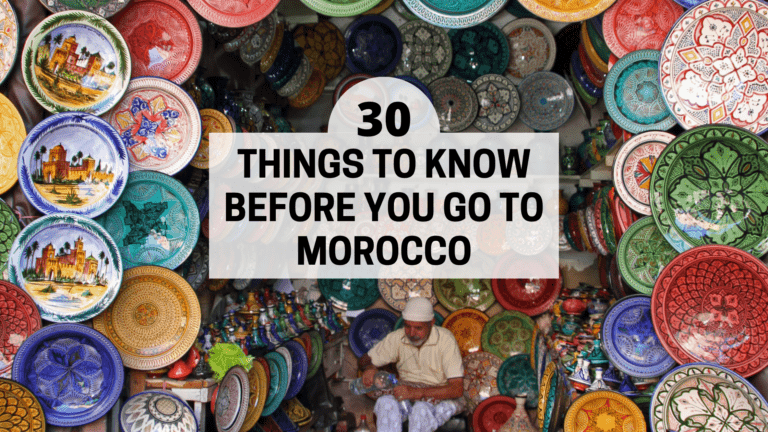
30+ Important Things To Know Before Visiting Morocco
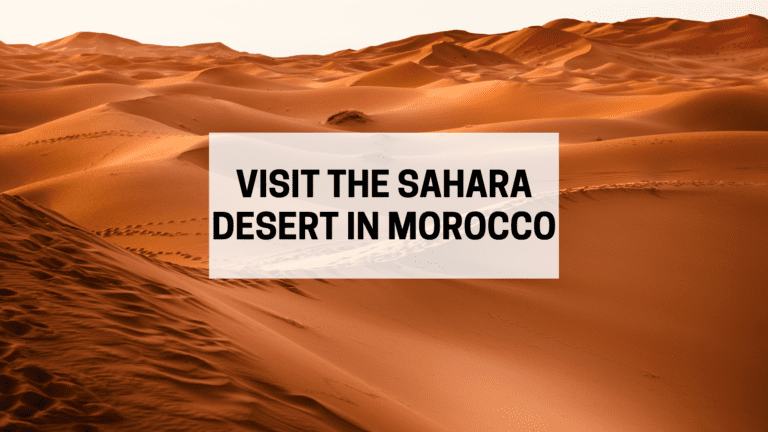
Everything You Need To Know About the Sahara Desert Morocco
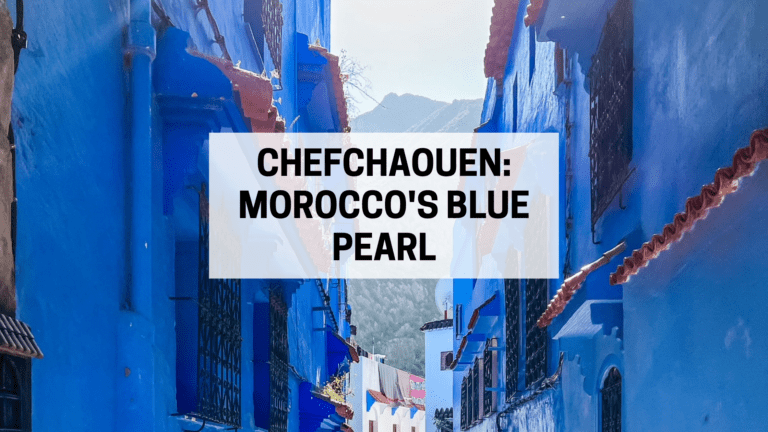
Top 15 Unique Things To Do in Chefchaouen, Morocco
I would most definitely want to visit Morocco during Ramadan, it would be so much better, right? I mean witnessing the beautiful culture is such a rich experience in itself.
I accidentally visited Morocco during Ramadan and agree with your observations.
This is such a helpful guide for planning a trip to Morrocco. It’s good to know that visiting during Ramadam is not too difficult and of course what to do and not to do. Thanks so much for sharing your experiences!
I would love to visit Marocco during Ramadan (or for Eid) and outside of Ramadan. It’s always interesting to see the dynamic of a city during the festive period.
This is such a helpful guide to know what to expect if you visit Morocco during Ramadan. Thanks for writing such an informative post. Morocco is definitely on my list to visit.
Leave a Reply Cancel reply
Your email address will not be published. Required fields are marked *
- Transylvania
- Central Europe
- Central & Eastern Europe
- Christmas Markets
- Sail Turkey
- Croatia Sailing
- Frequently Asked Questions
- Fair Travel Protocols
- Subscribe to Newsletter
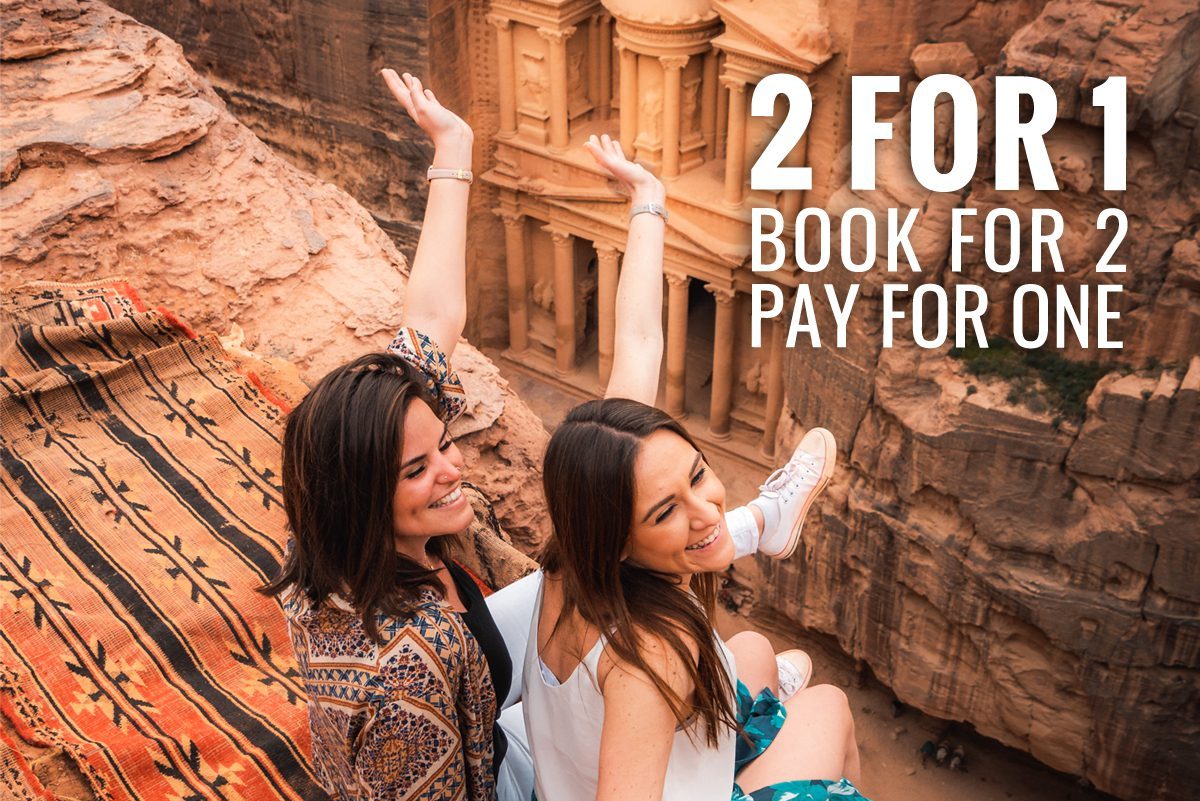
- Booking Terms & Conditions
- Responsible Travel
- Privacy Policy
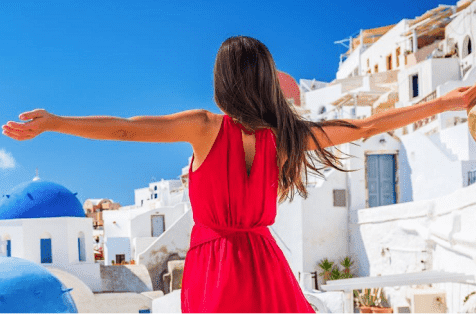
- My Bookings
- Log in/Sign Up
Visiting Morocco During Ramadan
Have you booked a trip to Morocco and now realise it falls in the midst of Ramadan?
Do the cheaper April flight rates to Morocco entice you but you are wary about the Ramadan period? To be clear: yes, you can travel to Morocco, even if it is Ramadan. And no, you do not need to fast, too.
Visiting Morocco during Ramadan is special. There is no reason for you not to enjoy a steaming pot of sugary mint tea, a camel ride in the Sahara under the sweltering sun, or the hubbub of multi-coloured souks and medinas. And to top it off, you are privy to Morocco in a different light. It is an experience that not all travellers can say they’ve encountered. You’ll find yourself part of local celebrations, savouring certain food that is specific to Ramadan, and the cherry on top: hotels and attractions are much less crowded.
Read on to find out what happens during Ramadan in Morocco and why you should consider visiting Morocco during this unprecedented time.
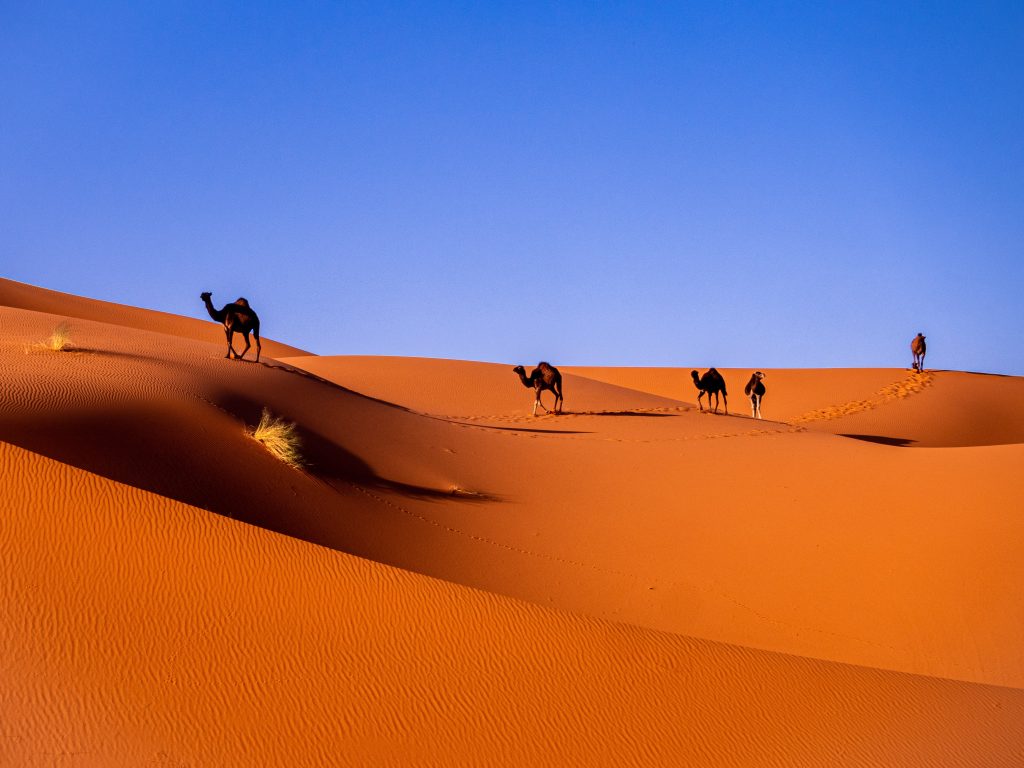
What is Ramadan?
Ramadan is an Islamic period of fasting. From sunrise to sunset, everyday for a month, Muslims will not eat, drink, smoke, and participate in sexual intimacy. It is considered the holiest month in Muslim culture, and there is an extra emphasis on religion during this time. 2022 Ramadan begins on the 2 nd of April, and finishes on the 1 st of May , when the new moon shines bright and high in the midnight sky. To mark the end of Ramadan and the month-long fast, a special festival called Eid al-Fitr, is celebrated for three days.
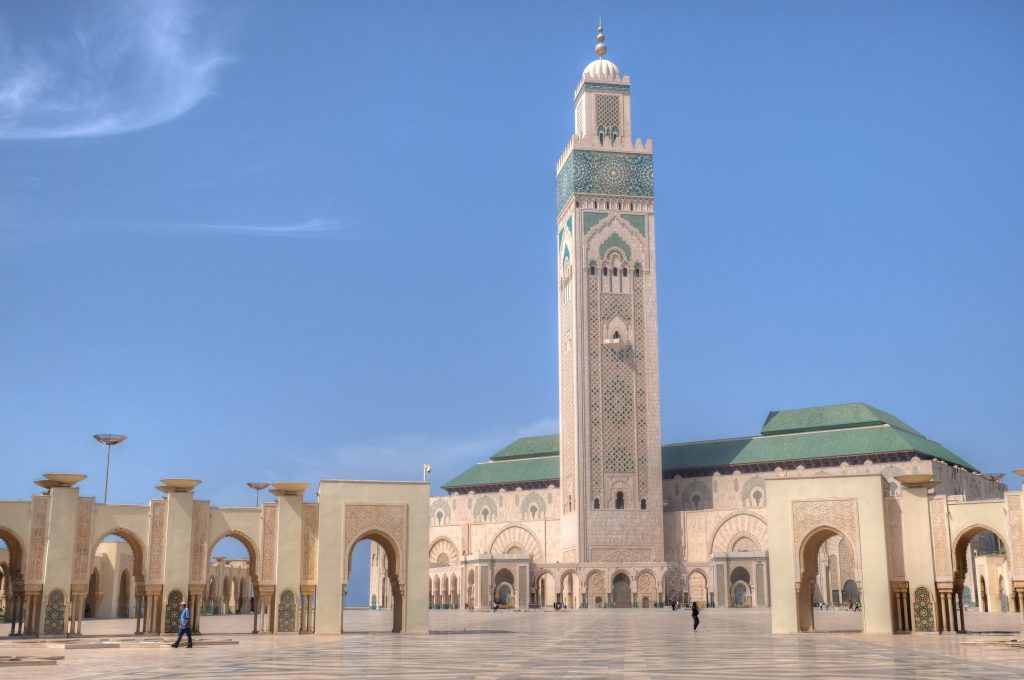
How Does Ramadan Affect Travellers to Morocco?
Morocco experiences few changes during Ramadan. Cafés will typically run as usual, serving food and drinks throughout the day. And the same goes for hotel and chain restaurants in bigger cities. Most tourism activities or tours, as well as sites and attractions, will also function normally. At most, there may be a modified schedule.
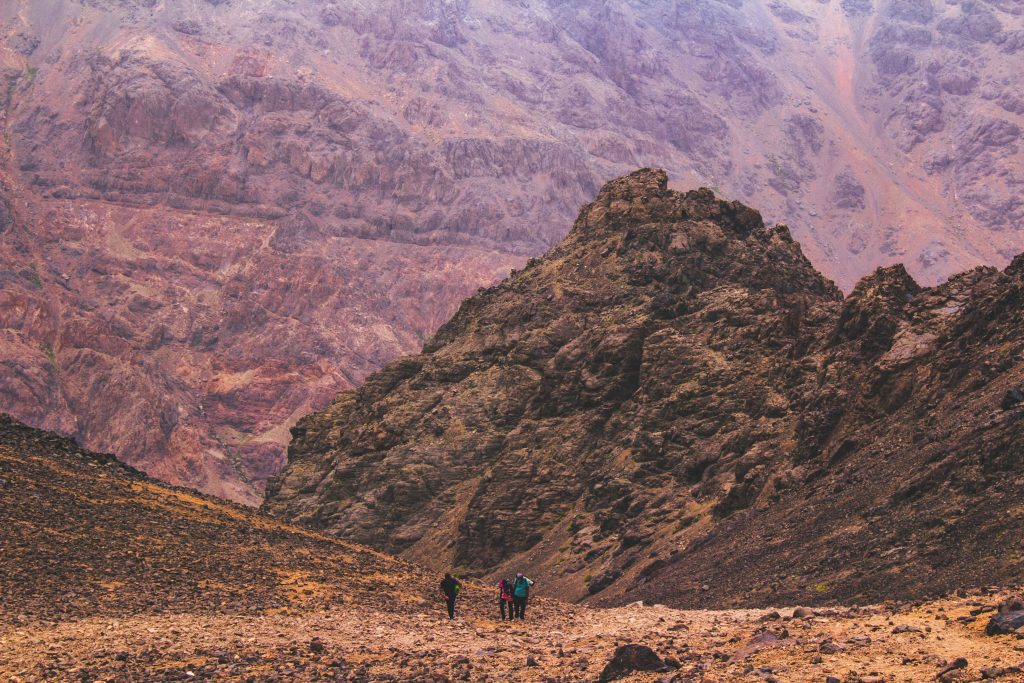
Be aware, many local business such as retail and grocery shops, will adjust their opening times during Ramadan, often opening much later in the day. Most shops and eateries will close for an hour or two at sunset to break their fast with a meal called iftar. You may even be startled by an ear-piercing canon or blaring alarm to signal dusk – don’t be alarmed. A traditional iftar meal can include a warmly spiced harira soup, dates, dried figs, boiled eggs, and plenty of sweet treats such as chebakia, sellou, and fekkas.
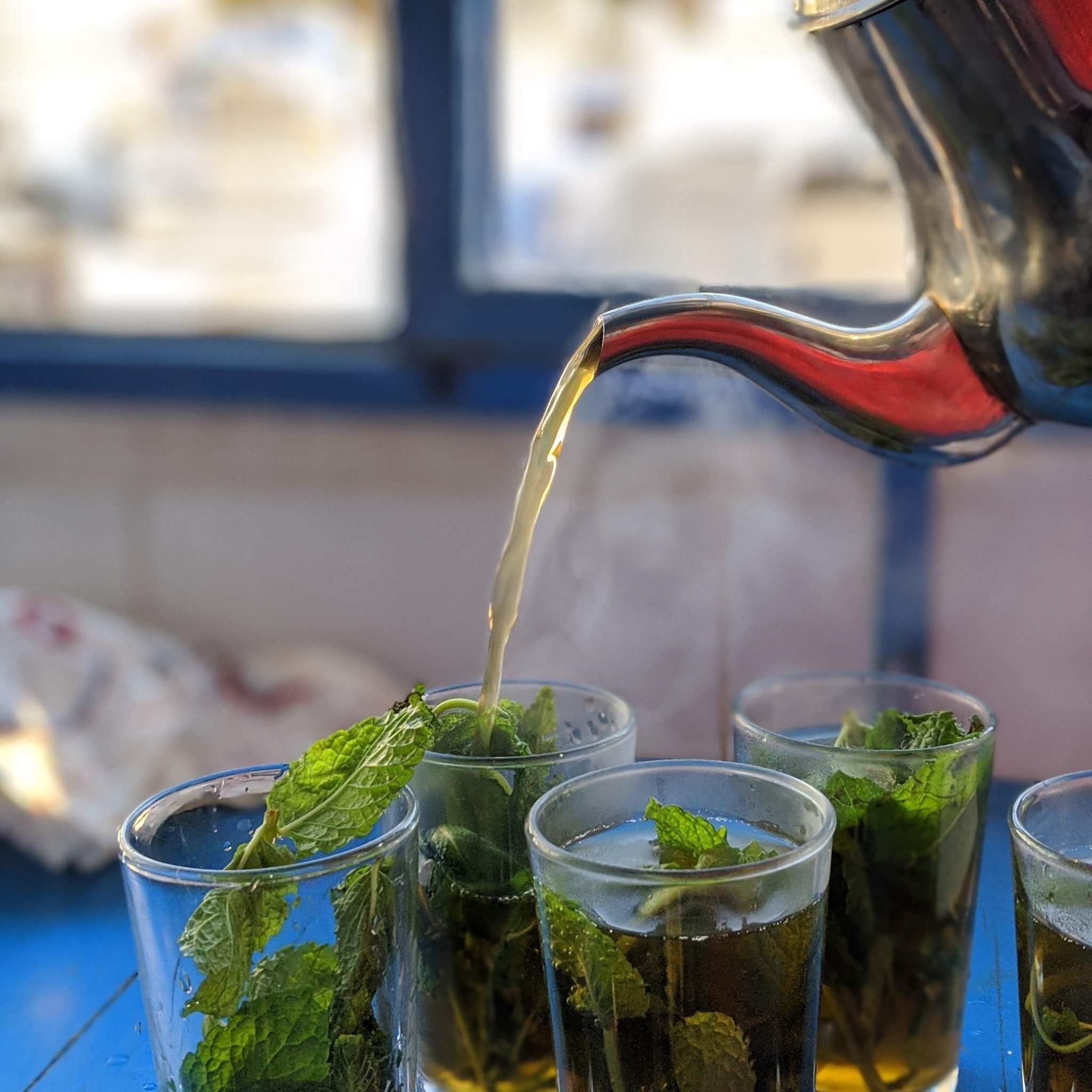
For the ecstatic night owl, you’ll be happy to know that some restaurants and major stores open from 6pm until 1am. During the evening hours, Morocco awakens from its afternoon lethargic state, coming alive under a black sky lit by a myriad of lanterns. Locals flock to the streets, wafts of fresh food permeate the air, and the snake charmers are excited to delight in all their pomp.
The big question most travellers to Morocco will have during Ramadan is: do I need to fast too? You certainly can if you want to. But you can eat and drink as you wish during Ramadan here. However, be respectful to the fasting Moroccans around you. If you’re craving a snack, eat out of sight. The same goes if you need a swig of water. With that being said, remember to buy water the night before, as many grocery stores may not be open in the morning.
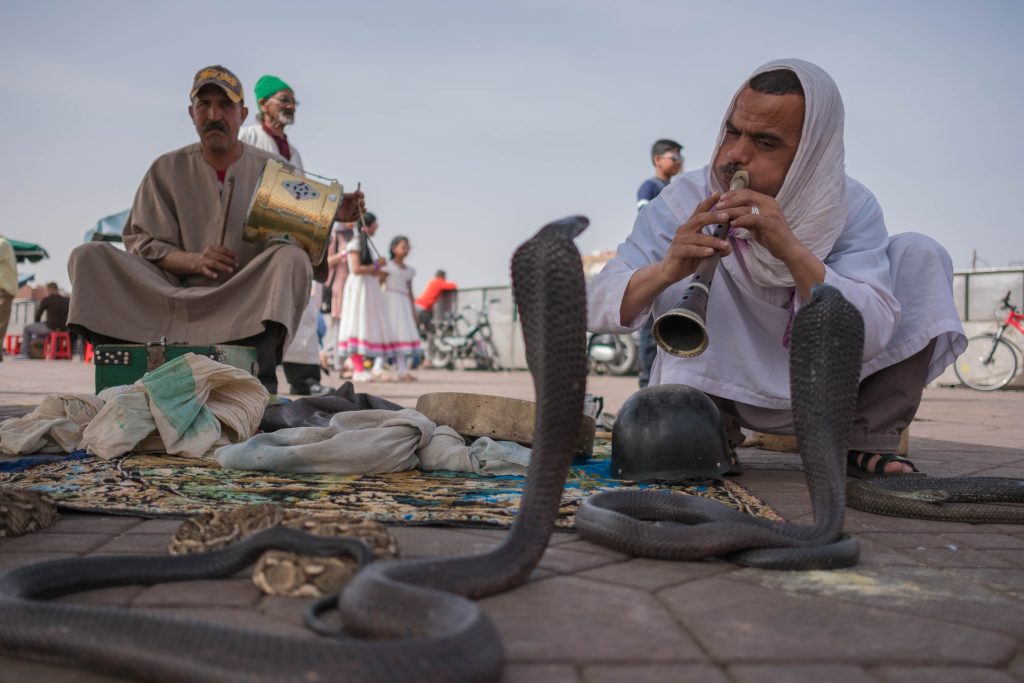
Is Morocco Worth Visiting during Ramadan?
Absolutely. You’re in for a unique cultural experience if you do. As a truly special time in Morocco, there is no reason for you not to miss out on Ramadan. As part of Moroccan hospitality, you may even be invited to an iftar or two. Not only will you be able to taste incomparable cultural cuisine, but you’ll be part of a remarkable ambiance.
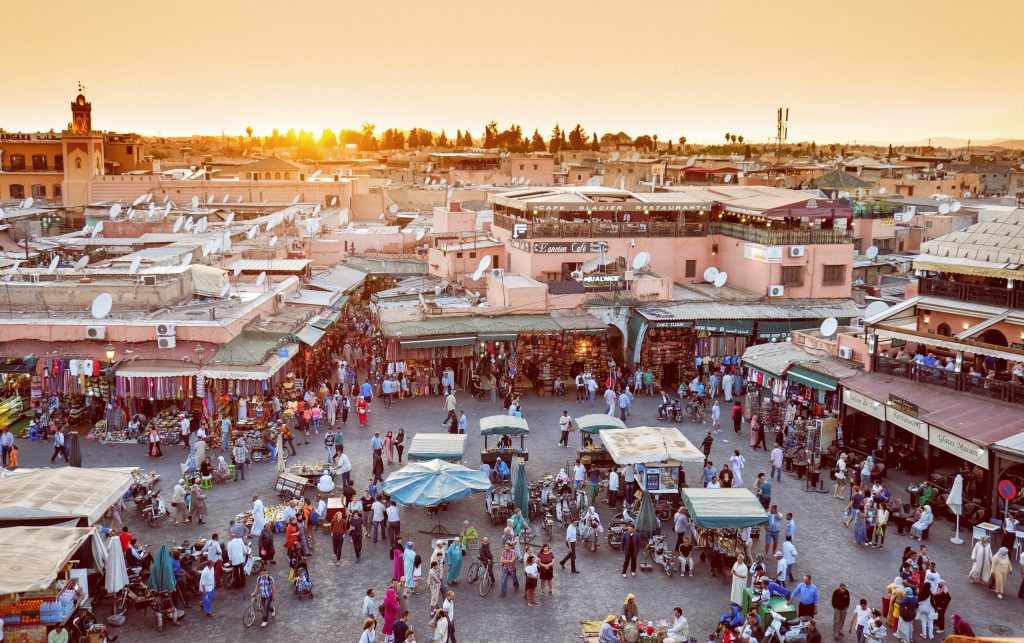
Travel Talk Tours gives you the one-of-a-kind opportunity to experience Morocco during Ramadan this year!
Find out more about our Morocco tours here.
R elated Contents:
How To Haggle In Morocco? Bargain Like a Local in the Markets of Morocco
Chefchaouen’s Culture and Beauty: Discover the Magic of Morocco’s Blue City
Top 10 Instagramable Spots in Morocco
Tangier: Discover Morocco’s Most Unique City
Exotic Morocco: The Know Before You Go
5 Reasons Why You Will Fall In Love With Morocco
19 Photos Of Morocco That Will Give You All The Feels
Embark on a Chromatic Journey: Exploring the Colors of Morocco’s Vibrant Palette
Camping in Sahara Desert, Morocco: The Essential Guide to the Desert and Mountains
Top Beach Destinations in Morocco
- Adventure Travel (17)
- Africa (16)
- Americas (16)
- Anzac Tours (1)
- Balkans (5)
- Cambodia (3)
- Central America (9)
- Costa Rica (6)
- Destinations (34)
- Europe (37)
- Festivals and Events (12)
- Greece (14)
- Iceland (8)
- Indonesia (14)
- Jordan (12)
- Morocco (18)
- New Zealand (16)
- Reasons to Travel (7)
- Sail Croatia (7)
- Sail Greece (2)
- Sailing (4)
- Singapore (15)
- Ski Tours (5)
- Spain & Portugal (8)
- Sri Lanka (4)
- Thailand (4)
- Top Tips (8)
- Transylvania (6)
- Travel & Wellbeing (4)
- Turkey (22)
- Uncategorized (8)
- Vietnam (10)
Recent Posts
- 10 Interesting Facts About the Dead Sea by Eve Edinburgh March 19, 2024
- A Guide to Greek Cuisine for Every Type of Traveller by Eve Edinburgh March 19, 2024
- Facts and FAQs About Hue Imperial City by Travel Talk March 19, 2024
- A Guide to Costa Rica’s ‘Pura Vida’ by Eve Edinburgh March 17, 2024
- Short Guide to Vietnam’s Cu Chi Tunnels by Jessica Julienne March 12, 2024
- You are comparing tours.
Open until midnight
+44 20 809 995 96 [email protected]
Monday - Friday: 09:00 AM - 6:00 PM Saturday: 10:00 AM - 5:00 PM Sunday: Closed W. Europe
THINK MOROCCO
Ramadan in Morocco
The month of Ramadan in Morocco is the month of fasting for Muslims. During these days, they can not eat, drink or have carnal relations, from sunrise to sunset.
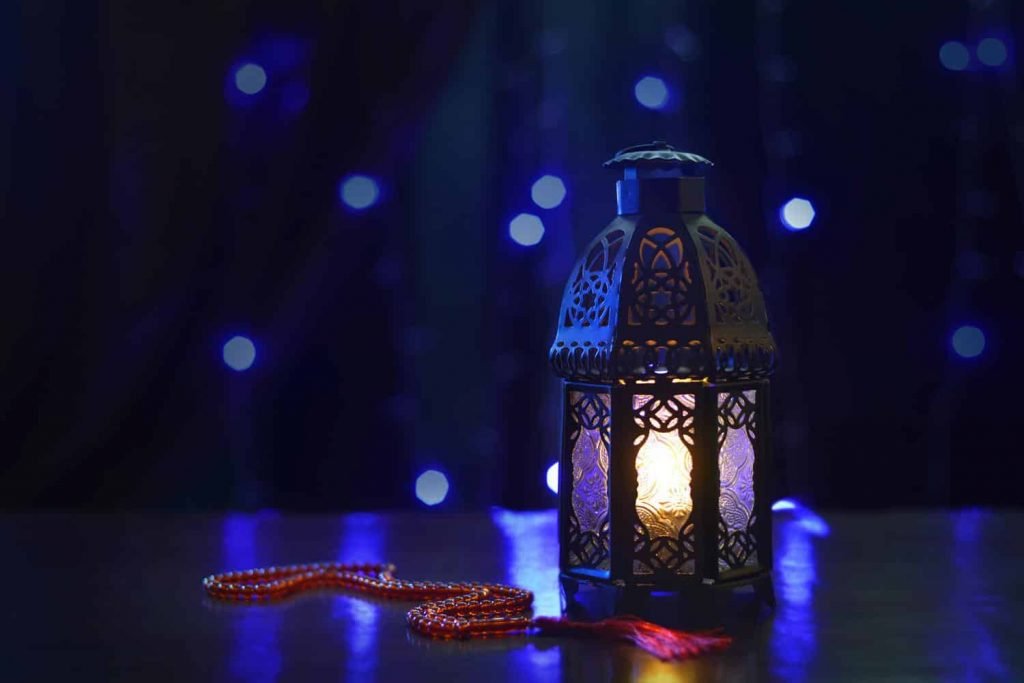
Each year, the dates on which Ramadan is celebrated vary, varying by 11 days per year. The Muslims use a lunar calendar that is not rectified and so the result is that their festivities move throughout the years. The reason why this was done was not out of ignorance of astronomy, but so that Islam would have a different schedule to any other religion.
How is Ramadan in Morocco
In Morocco, Ramadan is strictly observed, at least publicly. It is a period of the year lasting 30 days, during which all Muslims are obliged to fast during the day and to abstain from other temptations, such as sex or drugs, including tobacco.
It is, according to Islamic belief, a way of purifying the body and subjecting it to self-discipline. When night falls, however, the situation changes radically: Moroccans, with family or friends, celebrate with particular enthusiasm the fact that they have been able to overcome the fast of the day.
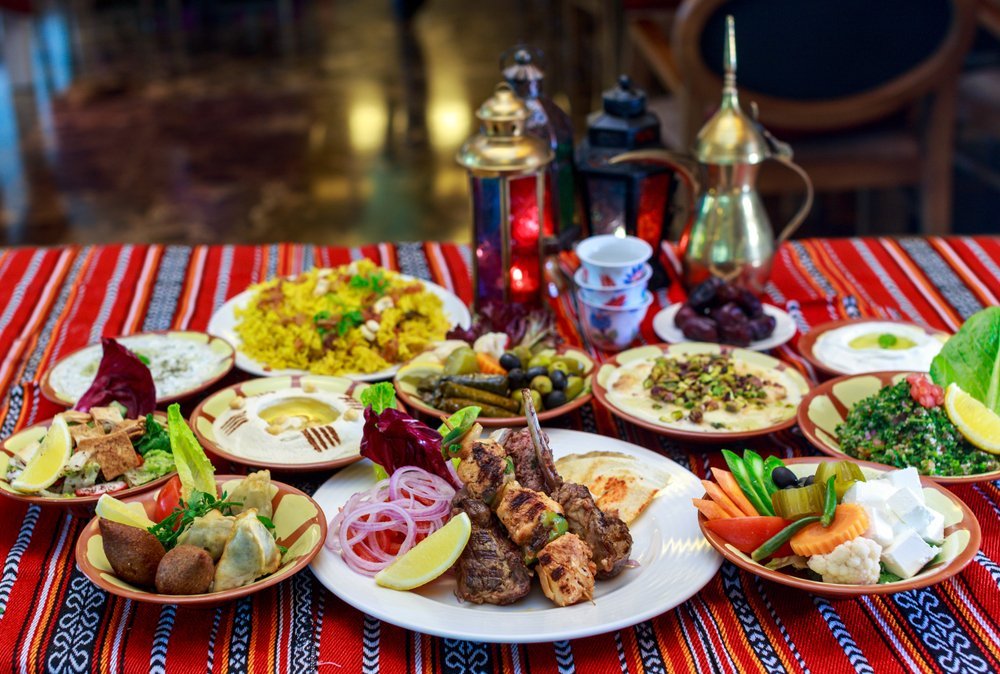
Naturally, Ramadan in Morocco has a strong impact on life in the cities: they enter a state of lethargy, with many establishments closed and much less traffic in the streets, something that often contrasts with the rhythm and atmosphere that is breathed after sunset, especially at the family level behind closed doors.
Read more: The Kasbah of Chefchaouen Where to Eat in Essaouira Why Travel To Larache Talassemtane National Park Gates of Essaouira How to Get From Marrakech Airport to The City Centre

- Imperial Cities Express - 5 days
- Fez and the Desert - 5 days
- Marrakech and Fez by Train - 5 days
- Imperial Cities - 7 days
- Marrakech and the Coast - 7 days
- Fez and the Desert Culture - 8 days
Northern Morocco - 8 days
Complete desert culture - 8 days.
- Northern and Central Morocco - 8 days
- Imperial Cities and the Desert - 10 days
Marrakech, the Coast and the Desert - 10 days
- Total Morocco - 13 days
- From Marrakech
- To the Desert
- Walking Tour of Marrakech
- Horse Carriage Ride around Marrakech
- Hot Air Balloon Ride over Marrakech
- Camel Ride in Marrakech
- Quad Tour around Marrakech
- Chez Ali Dinner and Horsemen Show
- Ouarzazate Day Trip
- Ourika Valley Day Trip
- Ouzoud Falls Day Trip
- Essaouira Day Trip
- Agafay Adventure - 1 day
- Zagora Adventure - 2 days
- Merzouga Adventure - 3 days
- Merzouga Adventure - 4 days
- Tailor-Made Tours
- Blog Home Page
- Before Your Trip
- Chefchaouen
- Contact Information
- Forms of Payment

- Ramadan in Morocco
Last Updated: 2021-04-28
When Ramadan is approaching, people usually ask me if I recommend traveling to Morocco during Ramadan , which is a reasonable question, since it’s completely different from any time, with certain advantages and disadvantages.
But before answering the question, I think it’s better to first explain a little about Ramadan (it will be enjoyable, don’t worry). Let’s get started!
Meaning of Ramadan
Many people often summarize Ramadan in two sentences: starving during the day and binging at night. In my opinion, it’s a simplification that does a disservice to one of the elements that most represents Moroccan religion and, by extension, its culture.
As you know, Morocco is a religious country, and every religion shares a common theme: approach to God through purification of the soul, which has a lot to do with the way we treat others and ourselves. Regardless of your beliefs, I think you’ll agree with me that religion is a way of leading life with certain ethics and conscience.
In that sense, Ramadan, apart from religious issues, proposes self-discipline , i.e. showing yourself that you can live without a series of temptations , that you are able to overcome a series of barriers that your circumstances and your own body puts in front of you. How many times have you been tested yourself, for example, promising not to be so aware of the continuous notifications of your phone? Well, that is similar to Ramadan.
Therefore, we can understand Ramadan as an invitation to a conscious effort to improve behavior and have more self-discipline . And it’s not only restricted to food , but also includes other temptations that may alter the meditation that is practiced throughout the day, such as drinking , sexual intercourse or any type of drug (including tobacco).
But it doesn’t just consist of that ; also, depending on the region or the country, there are other peculiarities; For example, in the time of Ramadan in Morocco it’s common to offer alms to the poor (emphasizing that you don’t need so much money and that, in addition, you can give it to those who need it more).
How then should the nightly feasts be understood? Well, as a way to celebrate as a family that we have been able to pass the test for another day.
Does this help you to see Ramadan from a different angle?
Beginning of Ramadan in Morocco
The dates for Muslims religious celebrations are according to the lunar calendar (11 days shorter than ours), so Ramadan (or any other Muslim date) can happen at any season of the year (imagine it happening in the middle of summer). You can find out more about the Moroccan calendar at this link .
It begins on the new moon, on the last day of the eighth month of the Islamic calendar. But until a few days before no one knows exactly what day it will be on the Gregorian calendar because, although astronomy could help us to predict it, tradition dictates that the imam has to observe the first sign of the crescent moon , which indicates the beginning of Ramadan. This can lead to a margin of error of approximately two days.
For example, in 2019 it was from May 5 to June 3 . And since there is an 11-day lag with respect to our calendar, it’s most likely that in 2020 Ramadan will take place from April 23 to May 23 , or up to two days before or after.

Visiting Morocco during Ramadan: Advantages and Disadvantages
I’ll tell you my personal experience after visiting Morocco on numerous occasions during Ramadan.
What’s most striking is that everything slows down : people walk as if in slow motion and there is hardly any traffic during the day (except one hour before and after the fasting ends). This has a great upside, and is that “amateur guides” (those who kindly offer to help tourists, expecting a tip of course) disappear , so you can enjoy a much calmer experience without the need to say “no, thanks” all the time .
One drawback is that it’s more complicated to eat lunch out . Since most people are fasting most kitchens are closed during the day . So, you’ll need to resort to tourist-oriented restaurants, with food that’s very likely less authentic and surely more expensive .
An alternative is to have a good breakfast and pack some light food (for example, a drink, a snack and a piece of fruit) to have something to snack on throughout the day. Just try to be discreet : keep in mind that they not only can’t eat, but can’t even drink water. So, it’s not nice to eat and drink it front of them, even if they politely pretend not to care.
In addition, as you may have figured out, being subjected to such strict self-discipline for days can cause them to be in a bad mood , and it’s common to see them arguing. So, if by chance you have a problem with someone, my advice is to take a breath deeply for three seconds, then say goodbye politely to avoid conflicts.
Fortunately, as night falls and the sirens sound signaling the end of the fast, the party begins . They usually have a fruit juice with some dates, and then go to the mosque to pray. Later they head home and eat with the family and then go out, celebrating being able to pass the test one more day. The streets and coffee shops fill with people and the children start playing in the street, everyone sharing in the joy .
So, what about daytime during Ramadan? What happens at the shops and places of interest? They follow more or less their usual schedule, but with nuances : if the store is very focused on local customers, it may have a reduced schedule and, on rare occasions, close some days. The places of interest and museums aren’t usually affected or, at most, they might close a couple of hours earlier.

Curiosities and Other Information of Interest
There are those who, for temporary personal reasons, can’t follow Ramadan totally or partially (for example, if they have to make a long journey and must eat and keep hydrated). In those cases, they can make up for those days after Ramadan.
It goes without saying that people with temporary or permanent health problems simply can’t fast (sick people, children, the elderly, women who are pregnant or menstruating). In these cases, they don’t even need to make up the days they couldn’t fast.
Ramadan is also a time that Moroccans use to reflect on all the bad things that have happened throughout the year and turn the page. Of course, it’s not necessary to wait for Ramadan to take advantage of this opportunity; if someone, for whatever reason, wants to fast any day of the year, they can do it.
Beside the religious and spiritual virtues of Ramadan, Moroccans praise its biological benefits: they think it’s good for the body to be subjected to a severe fast for one month a year, and it seems they might be right .
Smokers become particularly irritable during Ramadan. Those of you who were once habitual smokers and who managed to leave it behind (my sincere congratulations) know that most quitters gain some weight, because you compensate by drinking and eating more. Imagine if suddenly you can’t smoke from sunrise to sunset, nor can you eat or drink. So, please, if you run across a smoker, be particularly kind to him during Ramadan, and if you smoke, try not to smoke near anyone.
In Conclusion
The question you’ll all ask yourself at this point in the article is obvious I think: is it worth traveling in Ramadan or is it better to avoid it?
I think it’s tremendously difficult and unfair to answer that question categorically because, as you’ll have figured out by now, Morocco is a completely different country in Ramadan. Is it a time to go to regularly to Morocco? It’s a matter of taste : I have friends who only want to go during Ramadan because they appreciate the calmness in the air; others prefer to avoid it. What I would certainly recommend is to live the experience at least once .
And that’s one more post about the amazing culture of Morocco. If you have any questions or want to share your impressions or curiosities about this celebration, feel free to comment! Much love to all.
This article is part of our information for first time travelers to Morocco. If you want to know more, we invite you to read our basic guide to Morocco .
And if you like it, share it!
About the Author
Leave a comment (it will be published as soon as we have approved it): cancel reply, travel to morocco with us.

- Travel Tips
- Getting Around Morocco
- Haggling in Morocco
- The Islamic Calendar
- Morocco Map
- Money Exchange
- What is a Riad
- Weather in Morocco
- Argan Oil: Benefits, Uses, and Origin
- Moroccan Arabic
- Calendar of Festivals and Events
- Aït Ben Haddou
- Hassan II Mosque
- Travel Guide
- Where to eat
- Kasbah of Chefchaouen
- Medina of Fes El Bali
- Medina of Fes el-Jdid
- Bou Inania Madrasa
- Chouara Tannery
- What else to see
- Jemaa el-Fnaa
- Koutoubia Mosque
- Majorelle Garden
- Menara Gardens
- Chellah Necropolis
- Kasbah of the Udayas
- Tuaregs, the Nomads of the Desert
- Sleeping in the Sahara Desert
- Road of the 1000 kasbahs
- Merzouga / Erg Chebbi
- Erg Chigaga
- Moroccan Cuisine
- Moroccan Mint Tea
- Avocado banana smoothie
- Kefta / Kefta kebabs
- Seafood Briouats
- Moroccan Tomato Soup
- Moroccan Chickpea Salad
- Chicken Couscous with Vegetables
- Kefta Tagine
- Beef, Apple and Raisin Tajin
- Ktefa (Milk Bastilla)
- Arlette Olaerts
- Juana (The Kitchen of Babel)
- Sara (Mon déjà vu)
COMMON SEARCHES Morocco Holidays Morocco Tours Marrakech Tours Morocco Travel
LEGAL INFORMATION Legal Notice Terms and Conditions Privacy Policy Cancellation Policy and Insurance
USEFUL INFORMATION How to Make a Reservation Forms of Payment Passports and Visas FAQ
ABOUT OUR COMPANY About Us Contact Reviews
Privacy Overview
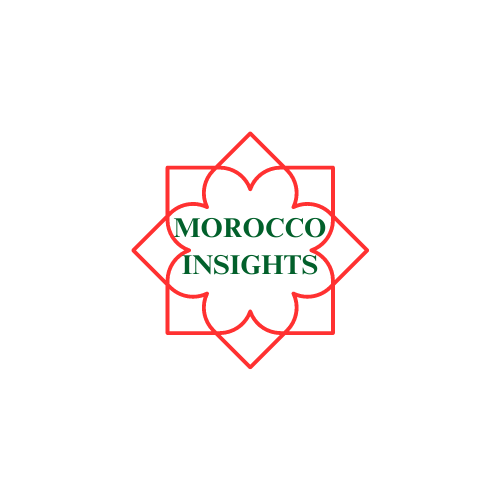
What Are Some Tips For Traveling In Morocco During Ramadan?
Immerse yourself in the enchanting land of Morocco, where vibrant colors, tantalizing flavors, and ancient traditions come together to create a truly unforgettable experience. As you embark on your journey with Royal Air Maroc, get ready to explore a country filled with a rich tapestry of culture, art, and history. However, if you plan to visit Morocco during the holy month of Ramadan, there are a few important tips to keep in mind to ensure a respectful and enjoyable trip. From understanding local customs to navigating the changes in daily routines, this article will provide you with essential insights on how to make the most of your travels in Morocco during Ramadan. So, pack your sense of adventure and get ready to embrace the beauty of this remarkable nation.
Table of Contents
Choosing the right time to visit
When planning a trip to Morocco, it’s important to consider the timing of your visit, especially if you want to experience the unique atmosphere of Ramadan. Ramadan is the holy month of fasting and prayer for Muslims worldwide, and it is celebrated in Morocco with great reverence and devotion. The dates of Ramadan vary each year according to the Islamic lunar calendar, so it’s essential to check the specific dates before making your travel arrangements. Visiting Morocco during Ramadan can provide you with a deeper understanding of Islamic culture and traditions, but it’s crucial to be respectful and accommodating during this sacred time.
Understanding Ramadan customs and traditions
To fully appreciate the significance of Ramadan in Morocco, it’s essential to have a basic understanding of the customs and traditions associated with this holy month. Muslims observe Ramadan as a time of fasting from sunrise to sunset, refraining from consuming food, drink, and other physical needs. It is also a month of heightened prayer, increased charitable acts, and spiritual reflection. Understanding these practices will not only help you respect the local culture but also enable you to engage with the community in a meaningful way.
Respecting the fasting period
As a guest in Morocco during Ramadan, it’s important to respect and adhere to the fasting practices observed by Muslims. While you are not obligated to fast, observing certain guidelines can show your support and appreciation for the local customs. Try to refrain from eating or drinking in public during daylight hours, as it may be seen as disrespectful. Instead, find a private area or restaurant where you can enjoy your meals discreetly. By being mindful of your actions, you will demonstrate your understanding and respect for the significance of fasting during Ramadan.
Planning accommodation in advance
When traveling to Morocco during Ramadan, it’s advisable to book your accommodation well in advance. The demand for accommodation tends to increase during this time, as many visitors come to experience the unique cultural atmosphere. Additionally, prices may rise during Ramadan due to the influx of tourists. Consider booking accommodation that is in proximity to mosques and restaurants, as this will make it easier for you to participate in the daily rituals and enjoy the evening meals (Iftar) with the locals. If you are a non-Muslim traveler, make sure to inquire about options that cater to your specific needs and preferences.
Being mindful of dress code and behavior
In Morocco, modesty in clothing choices is highly valued, particularly during the holy month of Ramadan. It’s important to dress respectfully, especially when visiting religious sites or public spaces. Choose clothing that covers your shoulders, knees, and décolletage, and avoid wearing tight or revealing clothing. It’s also important to be mindful of your behavior in public spaces. Avoid public displays of affection, as they may be considered inappropriate or offensive. By respecting the local dress code and cultural norms, you will contribute to a more harmonious and authentic travel experience in Morocco.
Understanding changes to daily routine
During Ramadan, there are significant changes to the daily routine in Morocco. Business hours may be altered, with many shops and restaurants opening later in the day and closing earlier than usual. Public transportation schedules may also be adjusted to accommodate the fasting period. It’s essential to plan your daily activities accordingly and be prepared for these changes. Additionally, some tourist attractions and activities may have limited availability or altered schedules during Ramadan, so it’s advisable to check in advance and plan your itinerary accordingly.
Sampling traditional Ramadan food
One of the highlights of visiting Morocco during Ramadan is the opportunity to sample traditional Ramadan food. During Iftar, the meal that breaks the fast at sunset, the streets come alive with a wide variety of delicious and aromatic dishes. From savory pastries to hearty tagines and refreshing beverages, the culinary delights during Ramadan are a feast for the senses. Make sure to explore the local markets and street stalls to experience the authentic flavors of Ramadan. Additionally, don’t miss the chance to try Suhoor, the pre-dawn meal before the day’s fast begins, which often consists of hearty and nourishing dishes to sustain fasting throughout the day.
Participating in Ramadan events and festivities
Immersing yourself in the Ramadan events and festivities in Morocco is a wonderful way to embrace the local culture and connect with the community. Nightly Taraweeh prayers at mosques offer a profound spiritual experience, and you are welcome to observe these prayers respectfully. Street festivals and bazaars come alive with vibrant performances, traditional music, and colorful displays of local crafts and goods. Engaging in charity and community initiatives, such as helping in soup kitchens or donating to those in need, is another meaningful way to participate in the Ramadan spirit and make a positive impact on the local community.
Respecting the sanctity of religious spaces
Morocco is home to many beautiful mosques, and it’s essential to approach these religious spaces with respect and reverence. When visiting mosques, it’s advisable to dress modestly and remove your shoes before entering. In some cases, seeking permission from the local imam or mosque officials may be necessary, especially if you wish to take photographs or document your visit. Understanding mosque etiquette, such as maintaining silence and refraining from any disruptive behavior, will ensure a peaceful and respectful visit. Remember that mosques are sacred places of worship, and it is important to treat them as such.
Staying hydrated and adapting to the heat
Visiting Morocco during Ramadan also means experiencing the summer heat. Staying hydrated is crucial during this time, even if you are not fasting. Make sure to drink plenty of water during the evening hours and early morning to help your body cope with the heat. It’s also important to conserve your energy during the day, as the fasting period can be physically demanding. Plan your activities accordingly, opting for more relaxed and indoor pursuits during the hottest parts of the day. Be mindful of potential heat-related challenges, such as fatigue or dehydration, and take necessary precautions to ensure a safe and enjoyable journey in Morocco during Ramadan.
Traveling to Morocco during Ramadan offers a unique opportunity to immerse yourself in the country’s rich cultural and religious traditions. By understanding and respecting Ramadan customs, planning your accommodation and activities in advance, being mindful of your dress and behavior, sampling traditional food, and participating in Ramadan events and festivities, you can have a meaningful and unforgettable experience. Remember to always approach religious spaces with reverence and stay hydrated while adapting to the heat. With these tips in mind, you are ready to embark on a captivating journey through the enchanting world of Morocco during Ramadan.

Should I Travel To Morocco During Ramadan?
Are you wondering if ramadan will affect your trip to morocco, here is an explanation of ramadan, how it will influence your trip and what you should expect when you travel to morocco during ramadan., when is ramadan.

Ramadan is the ninth month of the Islamic calendar. The Islamic calendar follows a lunar year, so every year the exact dates change. In the year 2019, it will be from the beginning of May to the beginning of June.
What is Ramadan?
Ramadan celebrates the month that the Qur’an was revealed to the Prophet Mohammed. Mohammed was by Mecca when the angel Gabriel revealed the verses of the Qur’an to him. This revelation took place during the 9th month of the Islamic calendar.
This month is deemed the most holy month of the year. During this time, Muslims all over the world join in a period of fasting as an act of intensive worship to Allah.
Ramadan is one of the 5 Pillars of Islam. The other 4 pillars include giving to the poor, saying the Shahadah, making the pilgrimage to Mecca, and daily prayers.

What Does Ramadan Mean For Muslims?
The Qur’an requires that during Ramadan nothing must pass the lips from sunrise to sunset. This includes both food and water. Those who suffer from illness, women who are pregnant or breastfeeding, and children are all exempt from participating in Ramadan, but are encouraged to make it up later.
Children under age 16 are not required to participate in the fast. As children grow up and learn more about their religion, they often choose for themselves when they want to begin fasting. Some parents will teach their children about the fast by letting them fast for a few hours a day to understand the practice. Children often choose their first day to fast on “The Night of Power” (translation). “The Night of Power” is a special night of prayer and is usually the 27th night of Ramadan in the Moroccan culture.
In addition to refraining from food and drink, Muslims are to refrain from entering any sinful or unclean activities, purifying their behavior and only doing good. They also give up smoking, cursing and gossiping.
The purpose of Ramadan is to remind Muslims of their personal good fortunes and call attention to those who are suffering. Muslims strive to be extra charitable during this month as their fast reminds them of those who do not have the same abundance as they do. Ramadan is also a period of cleansing – not just of the body, but of the soul as well.
Ramadan ends with a three day Eid with special feasting and celebration. It is called Eid el-Fitr. Children are often given presents or money during this time.
Should I Travel to Morocco During Ramadan?
Tourists often ask if it is a good idea to travel to Islamic countries during Ramadan. In North Africa, tourists continue to be welcomed with open arms and still enjoy the same sights and places of interest as one would during other months of the year.
It’s true that in the hours between sunrise and sunset, life in these countries may seem a bit barren and slow since most Muslims stay home to sleep and enjoy friends and family. However, as soon as the last call to prayer has sounded, the cities come to life!
Traveling to North Africa is always an exotic adventure! It is home to a unique culture and people that has formed from years of influence from multiple other countries. The month of Ramadan does not diminish this fact.
In fact, it could be argued that Ramadan enhances the encounter with the cultures of North Africa.
Experiencing this special month in a Muslim setting will give you an added appreciation for the people and their devotion to their religion. You will get a glimpse of the culture firsthand that cannot be duplicated.
What Should I Expect In Ramadan?
Every night, when it is time for the fast to be broken, cannons sound. After this, Muslims break the fast with a meal called f’tour or iftah. Customarily, the fast is broken with a sip of water and some dates, in honor of how the Prophet Mohammed broke his fast.
This meal is only the beginning to a night full of food to feast on.
After f’tour has been eaten, children can be found playing in the streets and adults out roaming and visiting with neighbors and friends. North African Muslims usually stay up for hours past their typical bedtime to eat and visit with their families. This is a very social time. Before sunrise, they will awake to have a meal, and then go right back to bed to get more sleep.
Food during Ramadan is a special experience. During this month, there are some different traditional foods that are only served during this time. Some traditional foods served during this time are harira (Moroccan soup) , dates, and chebakia.

Here are some additional things that you should be aware of so that your expectations meet reality!
- Many shops open later than usual during this holy month as shop owners try to recover from their late nights of feasting and family. This also includes post offices and banks.
- Some shops and restaurants will often give their employees the month off to spend time with their families, and many of them are closed throughout Ramadan. Nonetheless, the restaurants and shops that cater to foreigners remain open, though it will be hard to find any local Muslims there.
- Because of the adjustments of eating schedules, your main meal at night will probably be pushed a little later than normal. Be expecting to eat a bit later than you are used to.
- Muslims do not commonly consume alcohol because the Qur’an forbids it. You may find it difficult to buy alcohol even in the local supermarkets as they stop selling alcohol a week before Ramadan, during the whole month of Ramadan and around 3 days after Ramadan. You can still find some alcohol being served in tourist restaurants owned by foreigners, some larger hotels and some riads, but your options will be more limited.
- There is a large celebration at the end of Ramadan called the Eid al-Fitr. This holiday marks the end of the fast and is accompanied by large feasts with family and friends. It is comparable to the Western celebration of Christmas as many shops, stores, banks, etc. close for the few days before the holiday to accommodate extensive traveling.
- Because families will be traveling during the Eid, it is important to reserve your own local traveling in advance.
- Public transportation continues with a relatively normal schedule. However, it will be practically impossible to find a taxi at the time of the f’tour.
- Most people will still be completely friendly and hospitable. Many Muslims look forward to Ramadan as a special spiritual experience. However, you may meet some people who are tired or grumpy during the day. Be understanding-it is a very difficult thing to abstain from food and water for an entire day. It is also very difficult to quit smoking if you are accustomed to it, which could affect people’s behavior.

How Should I Respect The Moroccan Culture During Ramadan?
You will not be looked down upon for not participating in Ramadan, though it is important to remember to respect the culture you’re in.
Moroccans are extremely welcoming towards tourists and travelers and understand if you do not follow the same religion as them. They will not expect you to be fasting if you are not Muslim.
Some ways to respect the culture you are in:
- Don’t walk through the streets of the medina openly snacking or drinking from a water bottle out of respect for the people fasting around you. Try to do these things in private as much as possible.
- Avoid smoking in public.
- Our drivers and guides are aware that you will probably not be participating in the fast. They are completely used to tourists eating in front of them, and will not be offended at all.
- Be aware of how you dress. Modesty is key in North African countries, and is emphasized even more during Ramadan. Stay away from shorts, miniskirts, and bare shoulders.
- If you’re invited by a local to join in the breaking of the fast – whether the f’tour or the Eid celebration – take advantage of this offer! There is no better place to experience Ramadan than in the home of a local family! Though you might be staying up a bit later than you are used to, we guarantee that this experience will be irreplaceable.
It is up to you whether you would like to travel to Morocco during Ramadan. While it will certainly change your vacation to some degree, we believe that Ramadan offers a unique cultural experience that can be very enriching.
What it’s like to travel in Morocco during Ramadan
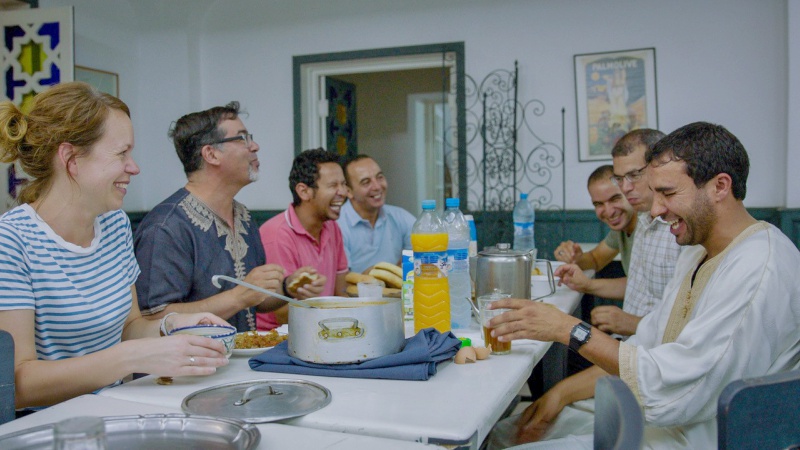
One of the first things I do when I arrive in Morocco is ask my tour leader if I can buy him an ice cream. He gives me a bemused look and shakes his head. My initial thought is “What’s wrong with him? Maybe he’s lactose intolerant? Maybe he’s got really sensitive teeth? It’s so hot!” until it dawns on me: I’ve just made the ultimate faux pas. I’ve offered my fasting Muslim tour leader an ICE CREAM during Ramadan, the holiest month of the Islamic calendar. Idiot.
I knew a little about Ramadan before travelling through Morocco with a small group of equally foot-in-mouth travellers (one offered Hamid, our very tolerant and forgiving leader, a handful of chips as a bag was passed around our van; another asked where we could go for a few beers one evening – Morocco being a dry country where drinking alcohol is forbidden among Muslims). I knew that Ramadan lasted for around a month and involved fasting – no food, no water – from before dawn until sunset. I knew that smoking, gossiping, kissing and swearing were big no-nos, and that it was a time to practice restraint, patience, and spiritual reflection. But that was about it.
On the drive to Chefchaouen from the ferry terminal in Tangier, I rattle off approximately 80,000 questions to Hamid and our driver, Mousa. “What time do you eat? WHAT do you eat? Don’t you get tired? Hungry? Thirsty? It’s over 40 degrees! But seriously, DON’T YOU GET HUNGRY????” (This becomes my second faux pas. Admitting you’re hungry during Ramadan is a sign of weakness.).
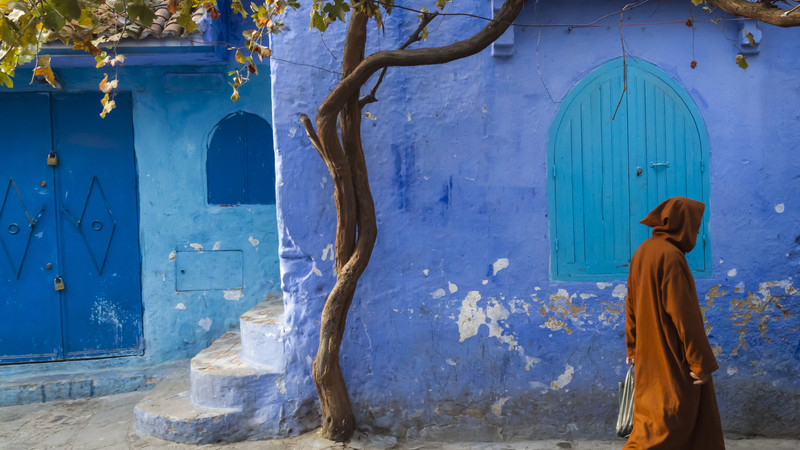
Djellaba-clad local in the blue city of Chefchaouen. Image c/o Shutterstock.
Hamid, ever so patiently, explains.
The fast is broken just after the Maghrib call to prayer (the fourth of five daily prayers), which happens at sunset. When the call to prayer rings out across the city from the mosque, it’s always read by an imam; the prayer is never recorded. And because of the varying sunset times across Morocco (and other Muslim countries around the world), the five calls to prayer throughout the day and night – Fajr at dawn, Dhuhr at midday, Asr in the afternoon (which starts when the shadow of an object becomes the same size as the object itself), Maghrib, and Isha’a at midnight – become continuous.
Traditionally, the first thing you eat after fasting all day is a date; it’s said that Mohammad broke his fast with dates. Along with being delicious, they’re also a pretty powerful energy boost which, let’s face it, everyone needs after a day of NO FOOD. During the iftar (aka the meal at the breaking of the fast aka breakfast), harira soup, eggs, bread, mint tea and water is served.

Our Moroccan tour leader Hamid.
Yes, no food, nothing to drink and stifling heat does make people pretty tired – and cranky too – which is why you see so many people sitting around in the shade during Ramadan. Most restaurants will stop serving meals to customers between 7.30 and 8.30 in the evening so they can share the iftar with their staff (and some shops and restaurants close completely for the duration of Ramadan), but otherwise it’s pretty much business as usual if you’re keen to travel in Morocco during this time.
Do we get hungry and thirsty? No comment.
A couple of days into our trip , Hamid invites me to join the iftar with him, our driver, another trip leader, and some friends. I jump at the chance.
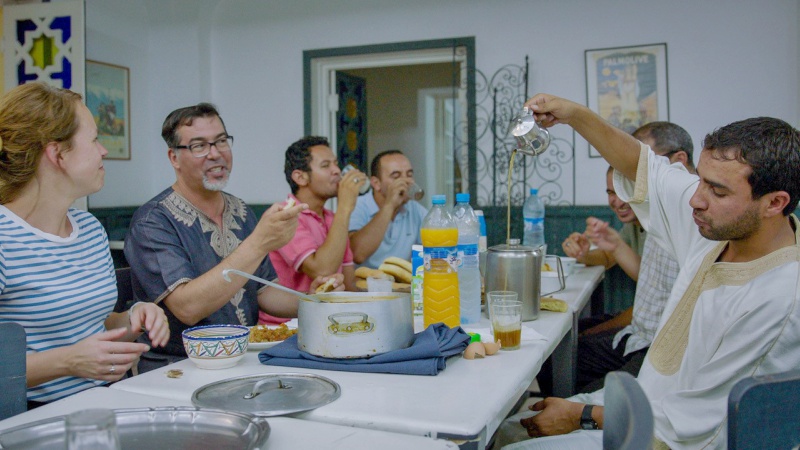
Iftar: breaking the fast together.
At 7.30pm, I head into the dining room at our hotel in Fes. The table is set with an impressive spread: a bowl of dates, bottles of fresh-squeezed orange juice, two plates of msemen (square, flaky, roti-like pancakes, enjoyed plain or stuffed with minced meat), a plate of hard-boiled eggs, halwa chebaki (a sweet, syrupy sesame biscuit), and a large silver pot of mint tea. Hamid enthusiastically pours tea into a small glass from a great height, then tips it back into the pot, then back into the glass – three times for good luck. The higher the tea is poured, the more froth appears on the head of the drink, which is what you want in a mint tea. The centre of the table is filled with bottles of water and milk, and cartons of banana smoothies and avocado milkshakes. Let’s be real: there’s a LOT of dairy on this table. Someone emerges from the kitchen with a huge pot of harira, a fragrant Moroccan soup of tomato, lentils, chickpeas, noodles and spices.
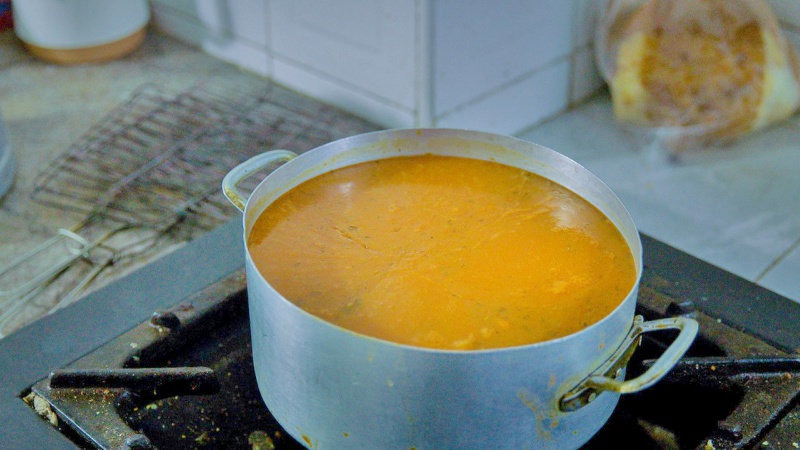
The fragrant pot of harira.
There’s a genuine buzz in the air. This meal is not just food. It’s not just gorging on biscuits and juice and water after a day of not eating. It’s a celebration: friends and strangers coming together and sharing something that seems to go beyond soup and bread. I feel incredibly honoured to be here.
We hear the call to prayer, and everyone springs into action. The bowl of dates is passed around the table, and we pop the sweet dried fruit into our mouths. Water is poured and the room falls silent as my new friends chug glass after glass, which is soon followed by milk, juice, and whatever other dairy concoctions people feel like. Soup is ladled into bowls; I’m offered a spoon, but told “we drink it from the bowl” so do the same. Samir, another Intrepid tour leader, liberally seasons a hard-boiled egg with salt and cumin and gives me half. I’ve never been a fan of boiled eggs, but this is one of the best things I’ve eaten. I put it down to the company and experience of actually being here.
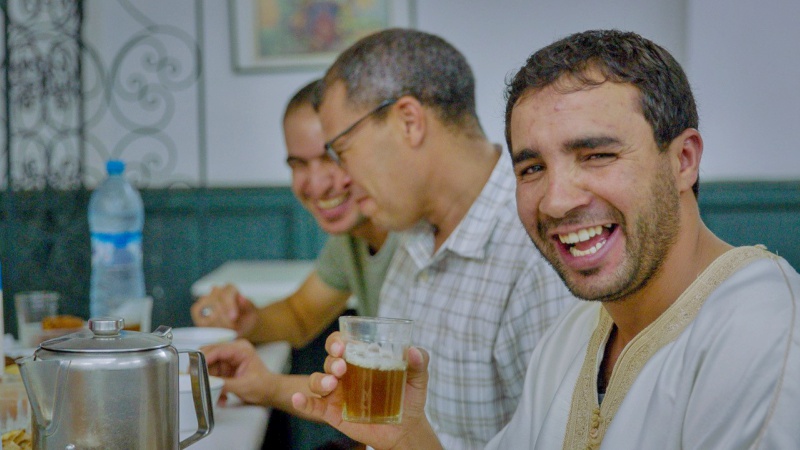
Joy around the dinner table.
The chatter, laughter and jovial atmosphere of the room starts to crescendo; it’s fascinating to see the energy levels rise. It’s the human equivalent of plugging in your phone and feeling that relief as the battery bar goes from red to green, only – you know – considerably more important.
I finish my soup and leave my friends to enjoy their meal. Outside the hotel, the streets are empty; there’s a hush over the city. In 45 minutes, Fes – and the rest of Morocco – will be bustling again with traffic and excited voices and laughter, but for now the country is enjoying its first meal of the day.
Ready for a Moroccan adventure? Check out our range of small group adventures here .
Feeling inspired?
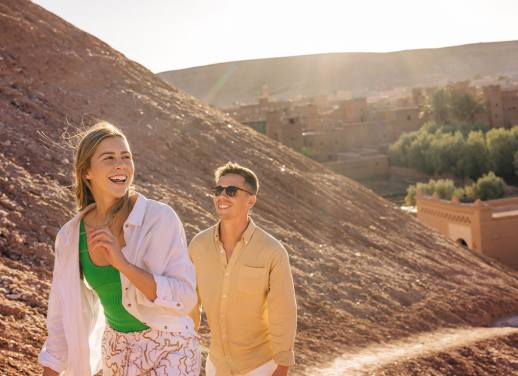
Emily Kratzmann
When I'm not riding a camel into the desert, robot dancing in a Venezuelan bar or kayaking through dugong-filled waters in the Philippines, you'll find me writing about travel, reading about travel, and planning my next travelling escapade.
You might also like
Galapagos or madagascar which unique destination should be..., travelling to chile here’s the best time to..., 10 reasons to visit samoa, the 10 antarctica questions you want answered, australia or new zealand where to go on..., 10 epic spots to stop at on your..., small group travel vs coach tours: which style..., costa rica or mexico: which country to check..., 7 of the best destinations for solo travellers..., machu picchu or chichen itza which historical site..., the people you meet: the art of connecting....
Travel to Morocco during Ramadan
- December 23, 2023
- No Comments

Most people might say ‘I do not want to travel to Morocco during Ramadan’. Would I feel comfortable eating my lunch at the beach, while others can’t eat yet at all? In this travel blog I write about what the pros and cons are of traveling to Morocco during Ramadan.
Beaches don’t change much during Ramadan, the surfspots are less crowded”

What is Ramadan and why is there Ramadan?
Most people will know that Ramadan exists, but what is Ramadan exactly? Ramadan is the 9th holy month of the Islamic lunar calendar. It is a month of fasting, worship and spending time with family and friends. It is a month where Islamics can get closer to Allah.
Ramadan occurs from the year A.D. 610. When the Angel Gabriel presented the Islamic holy book, the Quran, to prophet Mohammed for the first time. This ‘night of power’ as it is being named now, occurred in the 9th month of the Islamic calendar. Muslims fast during the ramadan to recall and show respect to the revelation of the Quran.
The fasting during Ramadan is from sunrise to sunset. After the sunset you are allowed to eat and drink again. You will see that this will be done with much pleasure in great gatherings of friends and families. But, Ramadan is more than just fasting. Ramadan is a month of devotion, reflection and celebration. It is a month to be selfless and caring for others. By fasting, sharing and caring during Ramadan, you will get closer to Allah.
When does Ramadan start in 2024?
As mentioned before, Ramadan is held during the 9th month of the Islamic lunar calendar. Ok, Yes. But then still the question; When does Ramadan start?
Coming year (2024), the month of Ramadan is expected to start in Morocco on the 10th of March. Ramadans’ exact starting moment, is the start of the new moon. This means that the starting date of Ramdan might still vary one day.

Pros & Cons of traveling to Morocco during Ramadan
If you are planning your surf trip to Morocco during Ramadan, you might think about this travel date twice. That is why we write in this blog the pros and cons of traveling to Morocco during Ramadan.
The first time I (Nina) traveled to Morocco, was in 2015. This was as well during Ramadan. At first sight, you don’t feel any difference about the time you spend in Morocco during this holy month. But sometimes there are some cons.
Opening hours
If you like to go shopping or explore the Medina in the mornings, expect the shops and breakfast spots to be closed until 11am. Most probably you will find the tourist areas to be open from the morning, but local shops stay shut a little longer to have a good sleep-in. Luckily, if you are staying at Ilyana Surfhouse, breakfast will be prepared for you at your accommodation so no need to find food in the streets.
To find a good lunch in the city, there are plenty of restaurants in Rabat open during the day.
In the afternoon you can expect shops to be closed from around 4 to 8pm. This is the moment for people to start preparing food and enjoying their first meal of the day.
For dinner, all restaurants are open and will even serve a special Ramadan-menu. You enjoy first Harira-soup with dates and a boiled egg, followed by a main course and Moroccan tea as dessert.
From 9 or 10 pm shops start opening and the streets become busy and lively again. There are mostly good vibes as everyone has a full and happy tummy.
For visiting museums or other sights around the city, the opening hours might be unclear and also not communicated well via Google.

Respect for the locals
During your holiday, you do not need to join Ramadan. At the first moment you might feel a little bad eating your lunch outside, but this is all good. No worries about making people angry or upset. Everyone is used to fasting and nobody expects a ‘tourist’ to join Ramadan while enjoying a lovely holiday at the beach. All we (including myself as a non-muslim in Morocco) can do, is show respect for the ones who do Ramadan. So for example, we have our lunch outside and find a nice spot on the beach, instead of eating lunch in front of the surfschool.
Empty Surfspots
As said before, shops might be closed in the mornings. Luckily most of you will come to Ilyana Surfhouse to SURF! Here comes a fun pro of traveling to Morocco during Ramadan. Beaches don’t change much during Ramadan, only surfspots are less crowded! This means more waves for us! Especially during the morning people will still be sleeping. In the afternoons or after sunset, people will enjoy their meals at the beach and good evening vibes start.

Altogether, my opinion on traveling to Morocco during Ramadan, is that it all depends on your intentions of the trip. If you come to Morocco to visit museums and sights; I would not highly recommend it. When you book a surf trip at Ilyana Surfhouse and go to the nature, or spend most of your time at the beach; Why not travel during Ramadan!
Quick Links
Get in touch.
- [email protected]
- +31681805568
- Whatsapp directly

Ilyana Surfhouse
Discover more from Ilyana Surfhouse
Subscribe now to keep reading and get access to the full archive.
Type your email…
Continue reading

Tachfin Travel Blog
Travel Tips
Travel to Morocco in Ramadan: Useful Guide for Non-Muslims

Travel to Morocco in Ramadan and dive into an extraordinary adventure! Experience the country’s remarkable transformation during this sacred month. Our guide for non-Muslims ensures you blend in respectfully. From navigating schedules to savoring Ramadan cuisine, let’s make your journey unforgettable! Don’t forget to greet with ‘Ramadan Karim.’ Let’s explore!
Why Travel to Morocco in Ramadan?
Traveling to Morocco during Ramadan is an experience like no other. Throughout the month, the country undergoes a remarkable transformation: work hours shorten, public spaces buzz with activity late into the night, and communities unite through acts of charity.

Ramadan holds deep spiritual significance for Muslims who fast from sunrise to sunset as a means to renew and increase religious devotion. The month is a time for reflection, prayer, and generosity, as individuals strive to strengthen their religious bond and extend compassion to others.
To fully immerse yourself in this enchanting atmosphere while remaining respectful to local customs and the spiritual essence of the month, we’ve compiled a practical Ramadan guide for non-Muslims.
Adapt to Changing Time Schedules
During Ramadan, working hours change significantly throughout Morocco. Nearly all businesses and public administrations shorten their operating hours, with many closing earlier in the day as activities wind down in the hours leading up to sunset.

Mornings also tend to start later, and business activities may be slower during fasting hours. If you require services from public administrations or businesses, it’s advisable to plan your visits for midday when operations are likely to be more accessible.
Consider Wearing Respectful Attire
Morocco is generally known for its liberal approach to public dress codes. However, during Ramadan, there’s a noticeable shift as Muslims become more mindful of how they dress.
You will notice that people wear traditional garments, particularly as they are more likely to frequent mosques and engage in religious practices.
As a foreigner, you will not be expected to adhere to the same standards, but it’s advisable to dress modestly out of respect for local customs.
It’s also a good idea to avoid wearing revealing clothing, especially when visiting religious sites or participating in communal events such as public Iftars, the communal meals Muslims share to break their fasts.
Avoid Public Displays of Affection, Eating, or Drinking
Locals in Morocco will not expect foreigners to fast, but it’s better to refrain from eating or drinking in public during daylight hours.
Even Muslims who are exempt from fasting due to health reasons refrain from consuming food or beverages in public, as it is considered impolite and insensitive to those observing the fast.

Also, public displays of affection should be avoided, as they are considered rude in Muslim countries, particularly during Ramadan.
It’s important to note that during daylight hours, almost all restaurants in Morocco are closed. Alcohol shops close for the whole month, even in the 40 days leading up to Ramadan.
While some food delivery applications may offer limited options, it’s advisable to plan your meals ahead. Shops also tend to open late, so be sure you have everything you need when shops are open.
Don’t Assume Muslims Lose Weight in Ramadan
In Western cultures, fasting is often associated with weight loss, leading foreigners to assume that Muslims shed pounds during Ramadan. This couldn’t be further from the truth.
In reality, weight is a sensitive topic during Ramadan. Due to excessive eating habits during Iftar, many Muslims actually gain weight during the holy month rather than lose it.
So, it’s important to avoid discussing fasting and weight loss when engaging in conversation with locals.
Enjoy Morocco’s Ramadan Cuisine
Public Iftars in Morocco offer a delightful culinary experience that shouldn’t be missed. Beyond the mouthwatering food, these events serve as one-of-a-kind gatherings that bring entire communities together in a unique atmosphere of solidarity.
Travel to Morocco in Ramadan offers an opportunity to partake in the spirit of generosity and hospitality that defines Ramadan.
After Iftar, communities engage in extended prayer sessions, followed by lively activities that illuminate the streets.
- 12 Pack Scented Candles Gifts Set for Women Learn More…
- Casablanca: My Moroccan Food Book Learn More…
- The Lioness of Morocco Book Learn More…
- HT2 Hybrid Active Noise Cancelling Headphones Learn More…
Frequently Asked Questions
Is it okay to visit morocco during ramadan as a non-muslim.
Absolutely! Morocco welcomes visitors of all backgrounds during Ramadan. Just be mindful of local customs and traditions, and you’ll have a respectful and enriching experience.
Are there any changes in the operating hours of businesses and attractions during Ramadan?
Yes, there are. Many businesses and public places may have adjusted hours during Ramadan, with some closing earlier in the day. It’s advisable to plan your activities accordingly, especially if you need services from public administrations or businesses.
Is there a dress code to follow during Ramadan in Morocco?
While Morocco is generally liberal in its dress codes, it’s respectful to dress modestly during Ramadan. Locals may be more conscious of traditional attire, especially when frequenting mosques and engaging in religious practices.
Can I eat or drink in public during Ramadan as a non-Muslim?
It’s best to refrain from eating or drinking in public during daylight hours out of respect for those observing the fast. Even though non-Muslims are not expected to fast, it’s considered polite to avoid public consumption during fasting hours.
Are restaurants open during the day in Morocco during Ramadan?
Most restaurants remain closed during daylight hours in Ramadan. While some food delivery options may be available, it’s advisable to plan your meals ahead and be aware that shops may also open late.
What is the significance of public Iftars in Morocco?
Public Iftars offer a delightful culinary experience and a unique opportunity to witness communities coming together. These events showcase the spirit of generosity and hospitality that defines Ramadan.
You may also like

How to Get to Casablanca from Marrakech?

Your Guide to Avoiding Scams in Morocco: 5 Tips for First-Time Tourists

How to Get from Marrakech to Agadir?
Leave a reply cancel reply.
Your email address will not be published. Required fields are marked *
Save my name, email, and website in this browser for the next time I comment.

Traveling to Morocco During Ramadan

What is Ramadan?
What is the meaning of ramadan, how can i participate in ramadan.
Your Morocco Travel Agent or Boutique Riad can arrange for you to participate in a ’Ftour – Ramadan Breakfast with a Moroccan family so you can experience Ramadan first hand.
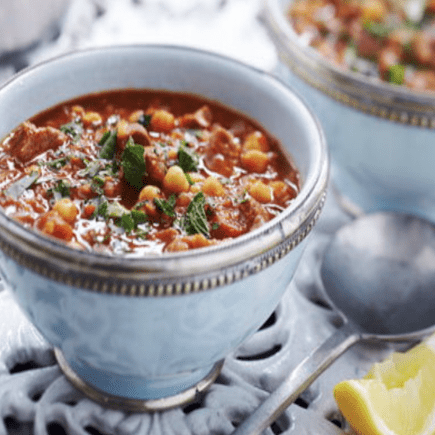
What Special Foods do Moroccan’s eat during Ramadan?
Ramadan soups and sweets: harira and chebakia .
Moroccan soups are tasty and fortifying and are accompanied during Ramadan with an assortment of sugary sweets to boost energy levels after a day of fasting The Ramadan fast is broken with harira a lentil and tomato based soup. dates and dried figs and chebakia , which are flower-shaped cookies soaked in honey and sprinkled with sesame seeds. Sweets are an integral part of the social aspect of Ramadan and the ftour meal.
Stuffed Dates include Orange flower water and cinnamon which are used to flavor the almond paste filling. Makrout with Dates and Honey is another special occasion sweet which is popular in Ramadan . A mild date paste is enclosed in a log of semolina dough, then the cookies are sliced, fried and dipped in honey. Almond Briouats are made by folding almond paste flavored with orange flower water and cinnamon within warqa dough. The pastries are fried and then soaked briefly in honey. Cheese briouats are foiled with cream cheese filling. Herbs or hot peppers can be added for more flavor.
Hssoua Belboua is barley soup with milk. It combines barley grits with milk to yield a rich, creamy soup that’s both nutritious and satisfying. There is also Semolina soup with milk, anise seeds and honey.
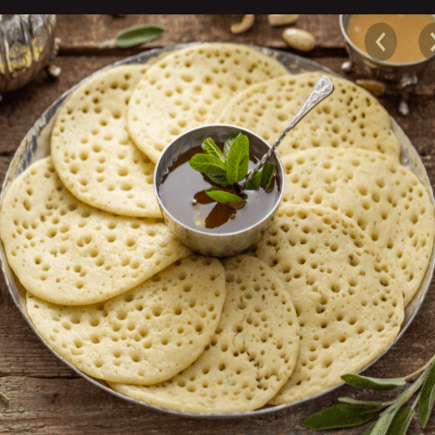
Ramadan Breads, Msemen, Rghayif, Harcha and Baghrir
After the soup comes a variety of breads such as msemen and rghayif (layered flatbreads cooked in a skillet); puffed, pita breadlike rounds called batbout; and perhaps some harcha , an unleavened flatbread, sometimes made with cornmeal. Arrayed with them on the table are marmalades, butter, and cheeses, often including the fresh cheese jben . There are bowls of olives and others of hard-boiled eggs, which are peeled and then dipped in ground cumin or black pepper. Moroccans living along the Atlantic coast will also serve fried fish, usually sardines.
Ramadan Fried Appetizers: Briouats
Another favorite are triangular or cylindrical phyllo briouats . Briouats , are pan-fried—not baked—to golden deliciousness. Some are savory, stuffed with fresh cheese and finished with a drizzle of honey, while others are sweet, filled with crushed almonds, sugar, and spices.
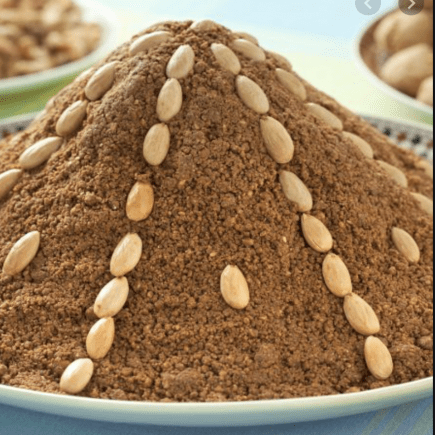
Sweets reappear at the end of the ftour meal. Platters are piled with cookies, among them twice-baked Moroccan Tea Biscuits known as fekkas with their lovely scent of orange-flower water.”Treats such as m’hanncha , called “snake cake” for its concentric circles, are another representative dessert. Dates reappear on the table, this time stuffed, often with a homemade almond paste.
Sellou is a Moroccan sweet served during Ramadan made from toasted sesames, fried almonds and flour that has been browned in the oven
Moroccan Director Hicham Lasri Films Louis Vuitton 2020 Mens Collection in Chefchaouen
Buying moroccan handicrafts, artisan weavers and embroiderers in tameslouht.
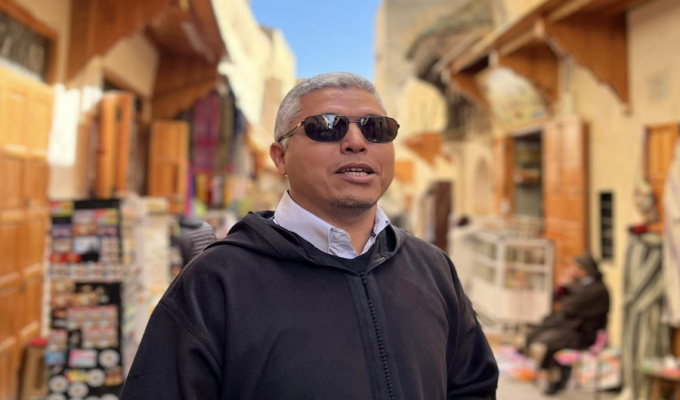
Top 5 Reasons to Discover Morocco on a Luxury Tour with Private Guides
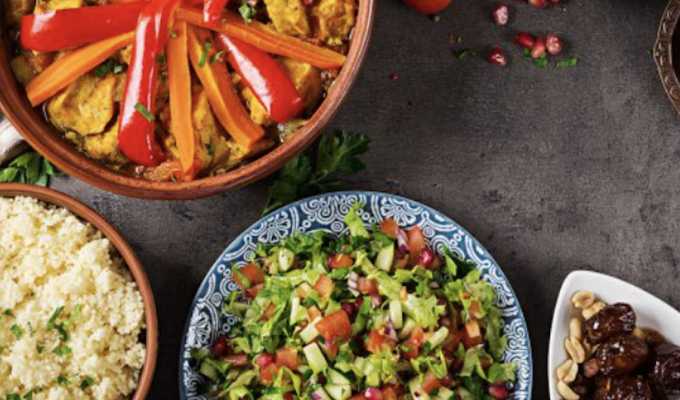
Top 10 Morocco Kosher Restaurants – Where to Dine
Hiking in morocco, morocco’s best kept secret treks.
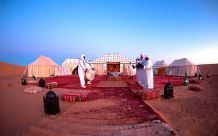
Up Close: Vacation in Marrakech, Fes, & A Berber Village, Come Travel to Morocco With Us.
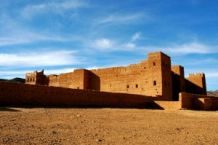
The Draa Valley & Berber Villages, Your Morocco Tour Guide
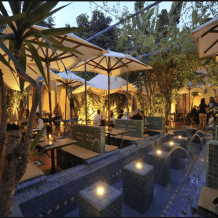
Virtual Tour Top 8 Secret Places in Casablanca
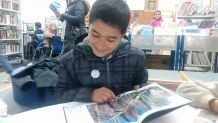
A New Children’s Library Opens in the Fez Medina
Click allow to get notifications on every article we post.


Travel to Morocco and Save on Ramadan with Barceló
Going to Morocco in Ramadan is something you won’t forget, especially if you want a place that has everything: culture, adventure and it’s also cheaper. This country is full of history, has jaw-dropping buildings and lively markets that you are sure to love.
The magic of Morocco in Ramadan
Ramadan in Morocco is a special time. Cities dress up in festivities, and the atmosphere is filled with spirituality and community. During the day, the streets may be quieter, but as night falls, life bustles with Iftars (fast-breaking meals) and cultural events.
Charming accommodations: Barceló in Morocco
To live this experience to the fullest, finding the right accommodation is key. Barceló hotels in Morocco stand out for their excellent location, first-class service, and above all, for the special offers during Ramadan.
Discover the exclusive benefits!
By joining the myBarceló program, unique offers await you, allowing you to save up to 20% more on your bookings. Take advantage of these discounts to invest in other experiences during your trip.
Best rate guarantee
At Barceló, we make sure you always get the lowest online rate. If you find a lower price elsewhere, we promise to match it and give you an additional 10% discount. This way, we guarantee you the best price for your accommodation.
Promotional codes
From time to time, Barceló makes promotional codes available for you to enjoy your reservation even more. These codes can give you direct discounts or extra benefits, such as room upgrades or access to exclusive services.
Don’t miss the opportunity to make your reservation through the hotel offers in Ramadan where you will find options that combine comfort, culture and prices adjusted to your budget. You can access to the offers through their web site https://www.barcelo.com/en-ae/offers/ramadan/
Gastronomy to Try in Morocco
Moroccan cuisine is a feast for the senses, full of aromas and flavors that reflect the country’s rich cultural history. Here are some dishes you must try:
Tagine: This is arguably Morocco’s most iconic dish. Simmered in its signature clay pot, tagine combines meat, vegetables and spices, resulting in a savory and succulent stew.
Couscous: Considered Morocco’s national dish, couscous is usually prepared on Fridays for family meals. Small semolina dumplings are served with vegetables, chickpeas and meat, all steamed and full of flavor.
Harira: This rich and nutritious soup is a staple during Ramadan, but is enjoyed year-round. Made with tomatoes, lentils, chickpeas, and meat, it is seasoned with a fragrant blend of spices and herbs.
Pastilla: A fascinating dish that mixes sweet and savory, pastilla combines layers of thin puff pastry with pigeon or chicken meat filling, almonds and spices, all sprinkled with sugar and cinnamon.
Mint Tea: Not just a drink, but a symbol of Moroccan hospitality. Green tea is served with fresh mint leaves and a generous heap of sugar, offering a sweet and revitalizing refreshment.
Places to Tour in Morocco
Morocco is a country full of contrasts, from bustling cities to quiet desert landscapes. Each place has its own charm and I will tell you about some of them that you should not miss. The Serenity of Essaouira Essaouira, with its ramparts overlooking the Atlantic, is the perfect place for those looking to relax. You can walk through its medina, enjoy its beautiful beaches or even try surfing. The sea breeze and the more leisurely pace of life here are a delight. The Charm of Chefchaouen Chefchaouen, known as the blue city, is one of those places that looks like something out of a fairy tale. Its streets and houses painted in different shades of blue create a magical atmosphere. Strolling through its medina is like stepping into a different world, quiet and very photogenic. The Desert Gates in Merzouga Merzouga, near the impressive dunes of Erg Chebbi, is your gateway to the Sahara desert. You can experience a night under the stars in a Berber camp or explore the dunes on the back of a camel. The immensity of the desert and its changing landscapes are something you will never forget.
Activities to do in Morocco
In Morocco, the entertainment options are as varied as its landscapes. If you like adventure, a trip to the Sahara desert is a must; you can ride camels and spend the night under the stars in a Berber tent.
For culture lovers, exploring the medinas of cities like Fez and Marrakech immerses you in their rich history. If you prefer to relax, the beaches of Essaouira offer a tranquil atmosphere ideal for unwinding. And for those looking for unique experiences, attending a local cooking workshop is a fantastic way to take a little piece of Morocco home with you.
Tips for traveling in Ramadan
Traveling to Morocco during Ramadan can be an enriching experience, but also different from what many travelers are used to. Here are some tips to make your trip during this holy month comfortable and respectful of local traditions. Understand Ramadan Ramadan is a holy month for Muslims, dedicated to fasting, prayer and reflection. From sunrise to sunset, Muslims fast without eating, drinking, smoking or engaging in worldly activities. Understanding this will help you respect local customs. Changing hours During Ramadan, many businesses, including restaurants and stores, may adjust their hours, opening later and closing during fasting hours. Be sure to check the hours of the places you plan to visit and be flexible with your plans.
Dress appropriately During Ramadan, it is particularly important to dress modestly. This shows respect for local traditions and culture. Covering the shoulders and knees is a good rule of thumb for both men and women. Experience the Traditions Ramadan is full of traditions and cultural events. Take the opportunity to experience some of these traditions, such as the night prayers (Tarawih) or the special Ramadan markets (Ramadan nights).
Going to Morocco during Ramadan with Barceló is a blast. You get to immerse yourself in a super interesting culture, you see places that look like something out of a fairy tale and the people are friendly. Plus, you save a lot of money. It’s not your typical tourist trip; it’s like opening a door to new customs, food and music that you won’t forget even when you return home.
Also published on Medium .
ADVERTISEMENT
Ex-officers face justice for brutal torture of black men, igc completed acquisition of deep neural computing, to promote trading technology’s r&d and service scope’s transformation, related posts.

Volvo Cars taps TDCX to enhance customer experience for Europe

The Chinese University of Hong Kong (CUHK) Shines as a Beacon of Excellence for International Students
Best mart 360 announces results for the 9 months ended december 2023.

Southco Introduces new R4-50 Heavy-Duty Electronic Rotary Latch with Integrated Sensor

DeepL Pro Empowers Singapore Businesses Going Global with Unmatched Translation Accuracy

Leung & Hedou Crowned Champions of the Goodman Healthy Hike & Run
- India Politics
- SocialKrowd News
- MarketersMEDIA
- Mobile Home
- Advertise on Arabian Post
- Google News
- Submit Press Release
- System Status
- Buzz | Arabian Post
- Crypto News
- Featured Blogs
- Faking Daily
- Top Gadgets
- The Netizen Report
- Even More News
- Islamic Coin x Haqq
- Newswire by MarketersMEDIA
- Satyen Raja
- Ole S. Hansen
- Ben Beckett
- Hani Abuagla
- James M Dorsey
- Kalyani Shankar
- K Raveendran
- Matein Khalid
- Nantoo Banerjee
- Nigel Green
- Sushil Kutty
- Saifur Rahman
- Nitten Nair
- 1arabia.com
- Gulf Property – Pan Asian Group
- India Press Agency
- Social Krowd – Dubai
- StockieDokie!
What is Ramadan and how do Muslims observe the Islamic holy month?
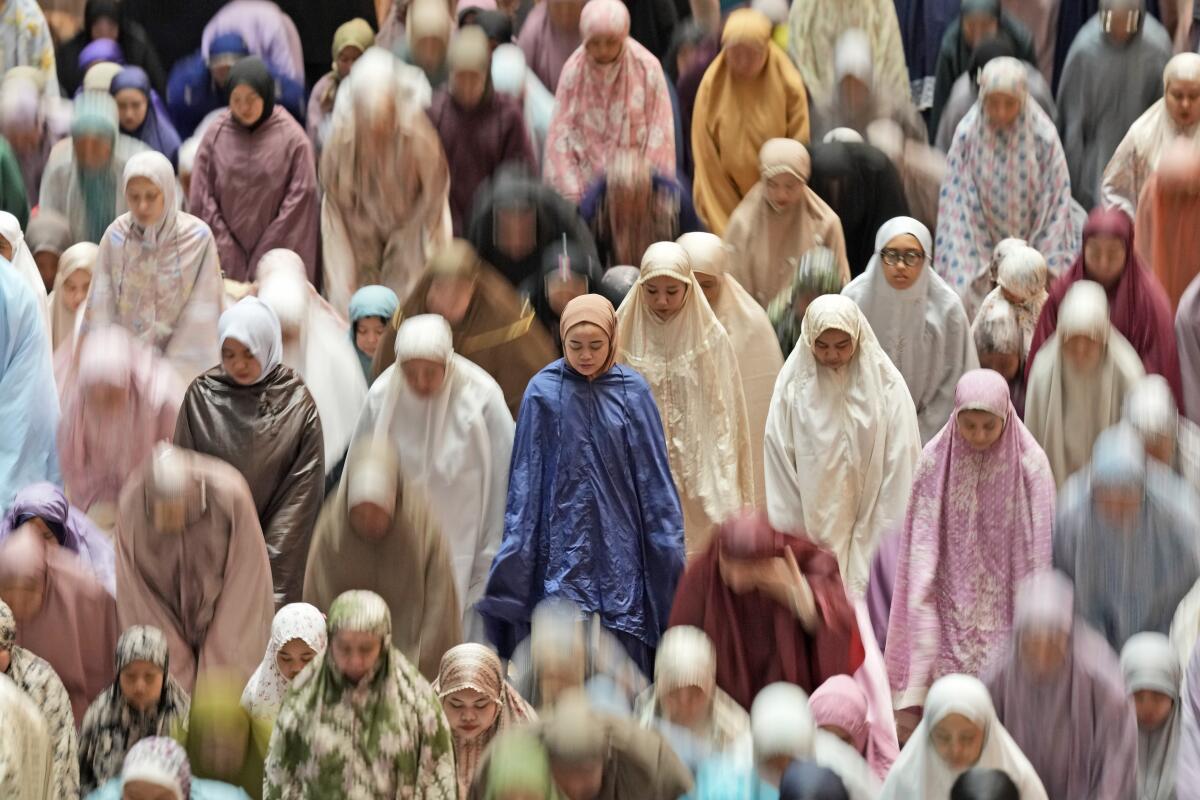
- Show more sharing options
- Copy Link URL Copied!
Muslims around the world are observing the holy month of Ramadan , with worship, charity, dawn-to-dusk fasting and nightly feasts.
The faithful gather for prayers inside mosques in Muslim-majority countries such as Indonesia, Pakistan and Turkey . They gather outside in New York’s Times Square and in the Gaza Strip.
Ramadan this year comes as the Middle East remains inflamed by the ongoing Israel-Hamas war in Gaza , with tens of thousands of Palestinians killed. Many in the blockaded territory are going hungry; particularly in the devastated north, people are scrambling for food to survive.
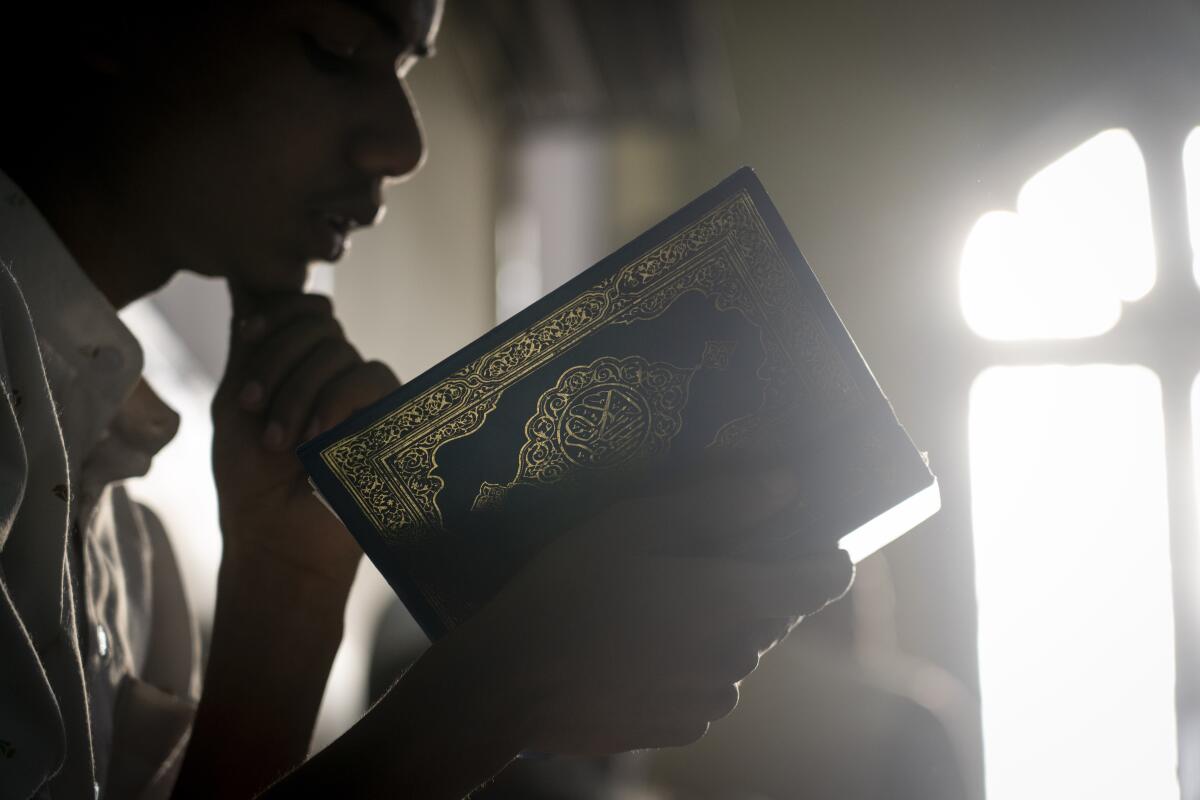
Some Muslims are striving to remain mindful of the Palestinians’ plight during Ramadan , including through making donations, saying prayers or incorporating Palestinian traditional symbols in how they mark the holy month.
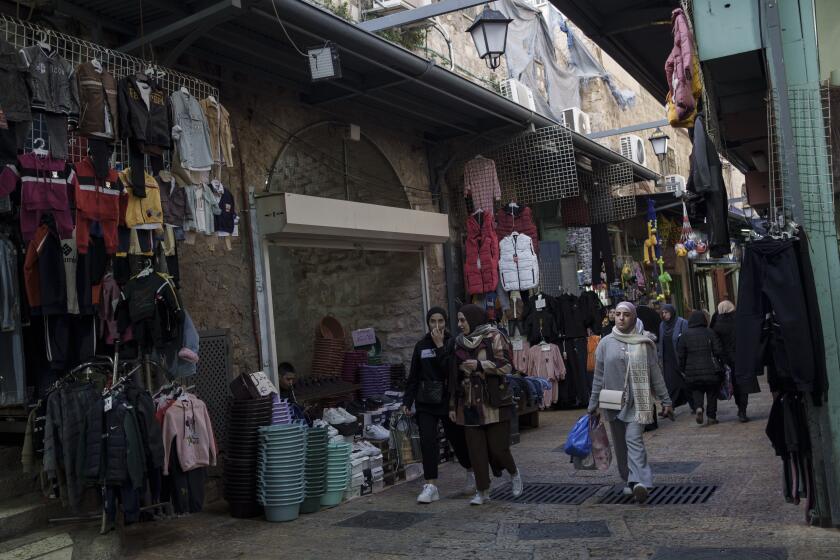
World & Nation
On eve of Ramadan, Jerusalem’s Old City offers little festivity as Gaza war rages
On the eve of the Muslim fasting month of Ramadan, Jerusalem’s Old City bears few of its usual hallmarks of festivity.
March 9, 2024
When is Ramadan?
Ramadan is the ninth month of the Islamic lunar calendar and begins with the sighting of the crescent moon.
For many of the world’s 1.8 billion Muslims, fasting began Monday, after an announcement from officials in Saudi Arabia, which is home to the holiest places in Islam.
Muslim communities may start Ramadan on different days, due to declarations by multiple Islamic authorities around the globe on whether the crescent has been sighted or different methodologies used to determine the start of the month.
Why and how do Muslims fast?
Fasting is one of the five pillars of Islam, along with the profession of faith, prayer, almsgiving and the Hajj pilgrimage to Mecca.
Muslims see various meanings and lessons in observing the fast.
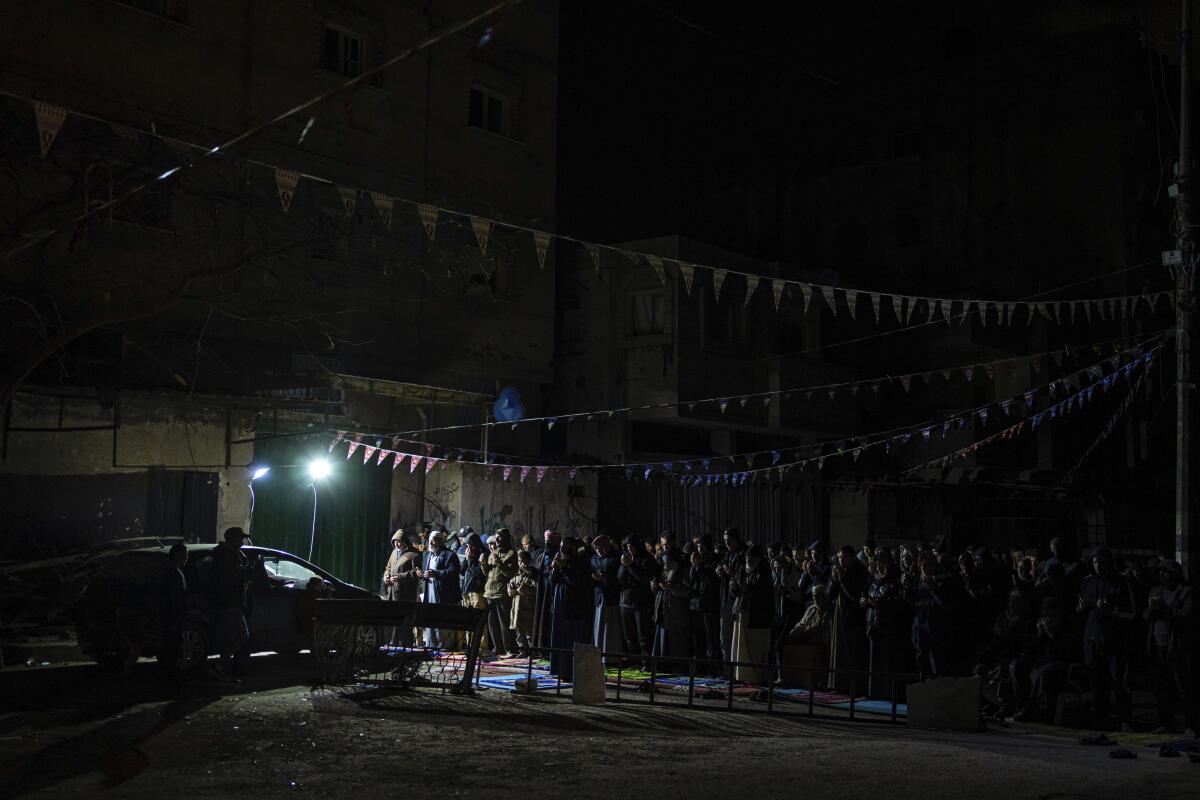
Fasting is regarded as an act of worship to attain God-conscious piety and one of submission to God. The devout see benefits such as practicing self-restraint, cultivating gratitude, growing closer to God, and feeling empathy for the poor and hungry.
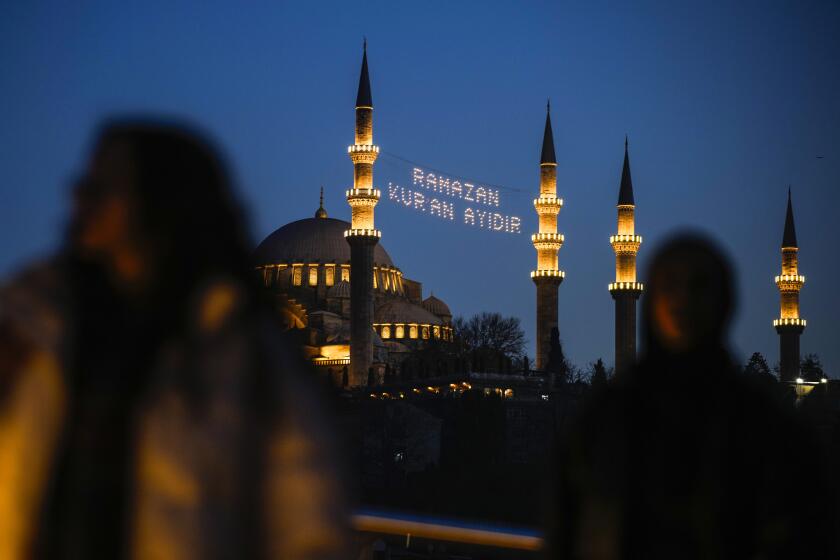
A Turkish artisan has kept the Istanbul skyline lighted during Ramadan for decades. He may be the last
Atop the towering minarets dotting Istanbul’s skyline, a 68-year-old artisan toils at a craft that has illuminated the Muslim holy month of Ramadan for generations.
March 15, 2024
The daily fast in Ramadan includes abstaining from all food and drink; not even a sip of water is allowed from dawn to sunset before breaking the fast in a meal known as iftar in Arabic. Those fasting are expected to also refrain from bad deeds, such as gossiping, and increase good deeds.
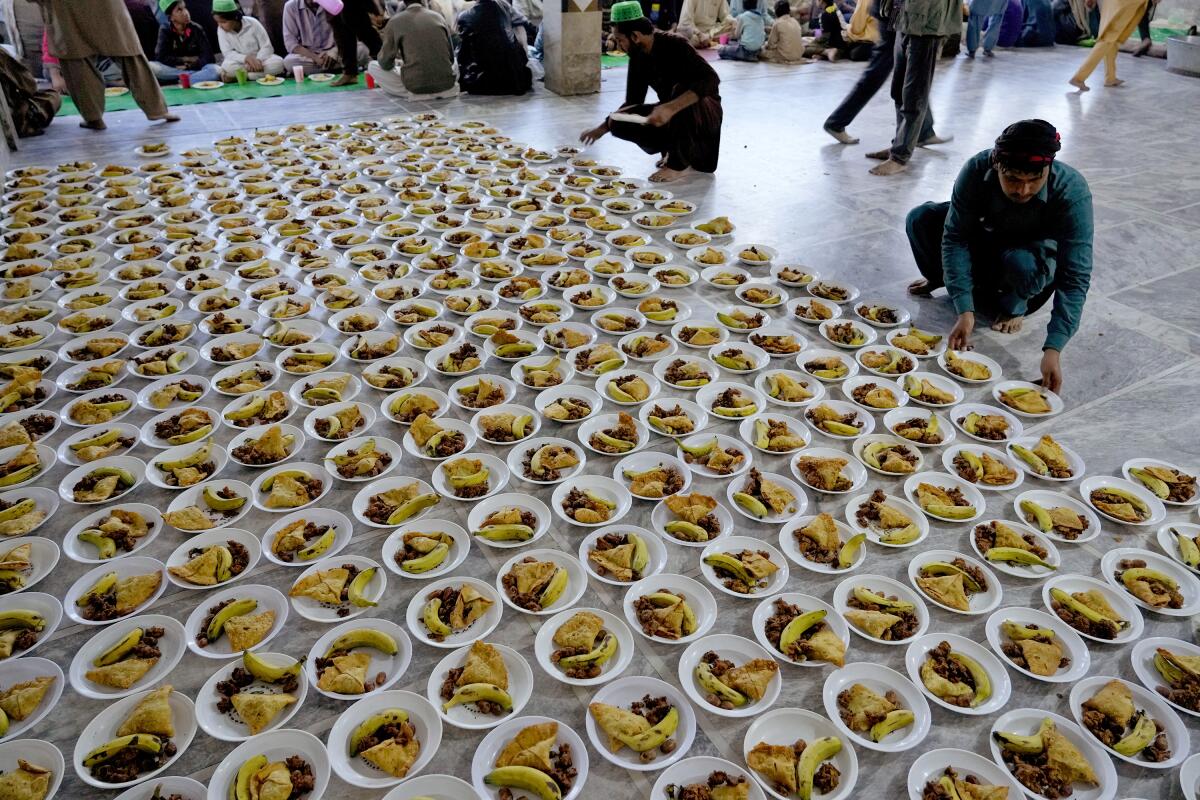
Muslims typically stream into mosques for congregational prayers and dedicate more time for religious contemplation and the reading of the Quran, the Islamic holy book.
Charity is a hallmark of Ramadan. Among other ways of giving, many seek to provide iftar for the needy, distributing Ramadan boxes filled with pantry staples, handing out warm meals alongside such things as dates and juice or helping hold free communal meals.
Muslims eat a predawn meal, called suhoor, to hydrate and nourish their bodies ahead of the daily fast.
Are there exemptions from fasting?
Yes. There are certain exemptions from fasting, such as for those who are unable to because of illness or travel. Those unable to fast due to being temporarily ill or traveling need to make up for the missed days of fasting later. Young children, the elderly, and menstruating, pregnant and breastfeeding women are also exempted.
What are some cultural and social traditions associated with Ramadan?
Muslims are ethnically and racially diverse and not all Ramadan traditions are rooted in religion. Some customs may transcend borders, while others can differ across cultures.
Many social rituals center on gathering and socializing after the daily fast. Some Muslims decorate their homes, put out Ramadan-themed tableware and centerpieces or throng to markets and Ramadan bazaars.
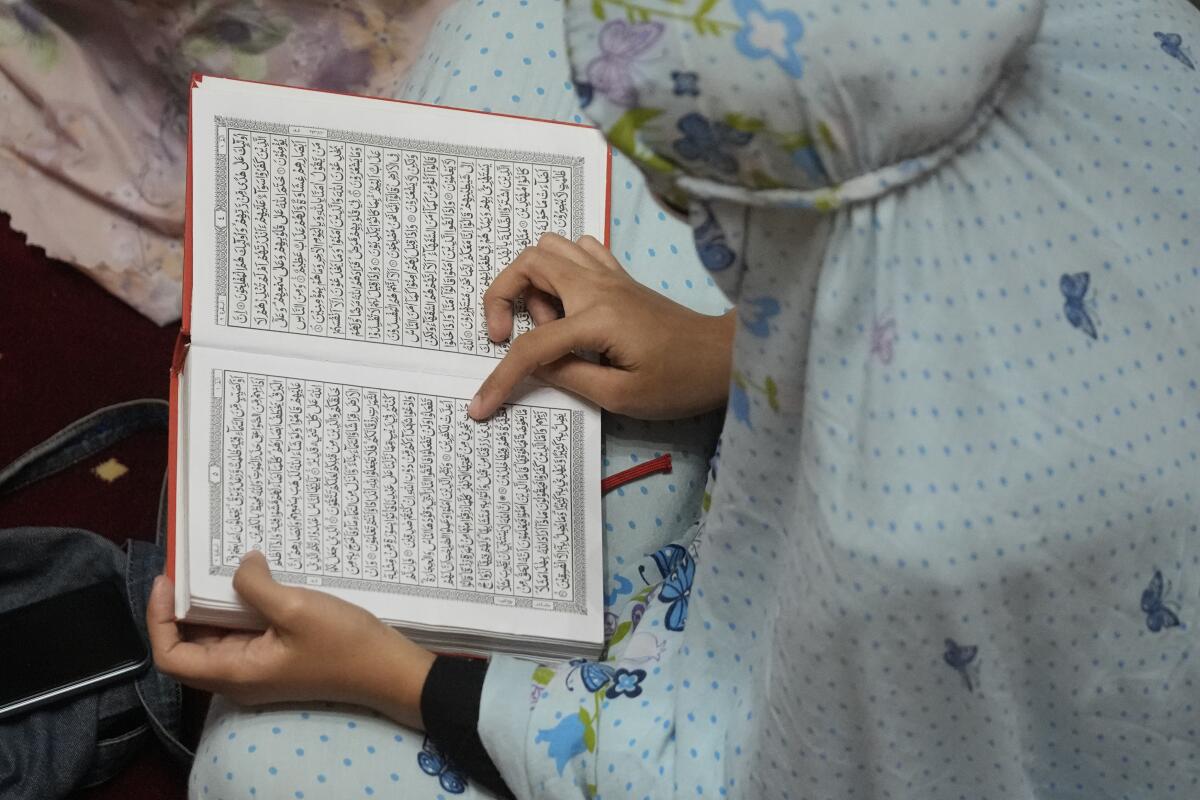
In Egypt, the Arab world’s most populous country, Ramadan is typically a festive time.
Colorful lanterns, in different shapes and sizes, dangle from children’s hands and adorn homes or the entrances of buildings and stores. Ramadan songs may be played to welcome the month. So-called Ramadan tents, featuring food and entertainment, pop up to cater to gatherings.
Ramadan’s soundscape in Egypt has traditionally included the predawn banging on drums by a mesaharati, who roams neighborhoods, calling out to the faithful, sometimes by name, to awake them for the suhoor meal.
New TV shows, communal meals
A lineup of new television shows is another fixture of the month in some countries, and advertisers compete for the attention of viewers.
In various regions, some Muslims worry that the month is being commercialized, and that an emphasis on decorations, TV shows, outings or lavish iftar banquets, especially in the social media era, can detract from Ramadan’s religious essence. Others feel that a balance can be struck and that, done in moderation, such rituals are part of the month’s festive spirit.
In Indonesia, the most populous Muslim-majority country, Ramadan rituals vary across regions, with some influenced by local cultures or other faith traditions.
Thousands of villagers who live on the slopes of Mt. Merapi in Central Java welcome Ramadan with Nyadran, a Javanese ritual influenced by Hinduism and Buddhism that includes visiting, cleaning and decorating ancestors’ graves.
People in Indonesia’s deeply conservative Aceh province slaughter animals during Meugang festivities. The meat is cooked and shared in a communal feast with family, friends, the poor and orphans.
Hundreds of residents in Tangerang, a city just outside the capital of Jakarta, flock to the Cisadane River to wash their hair with rice straw shampoo and welcome the fasting month with a symbolic spiritual cleansing.
After evening prayers, many boys and girls across Sumatra island parade through the streets. They carry torches and play Islamic songs.
In India, home to more than 200 million Muslims, making up a large minority group in the country, stalls lining many streets sell such things as dates, sweets and freshly cooked food. At night, some New Delhi neighborhoods become lively as Muslims head to mosques to attend prayers.
Some Indian Muslims also visit holy shrines dedicated to Sufi saints, sites that are decorated with lights and colorful flowers.
In the United States, home to a diverse, small but growing Muslim population, gathering at mosques and Islamic centers when possible for iftar meals and prayers provides many Muslim families with a sense of community. Some Muslims also organize or attend interfaith iftar meals.
Some big U.S. retailers have started catering to Ramadan shoppers, selling such things as Ramadan-themed decor.
More to Read
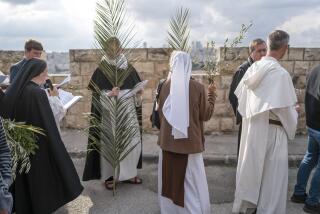
Thousands of faithful attend Palm Sunday celebrations in Jerusalem against a backdrop of war
March 24, 2024
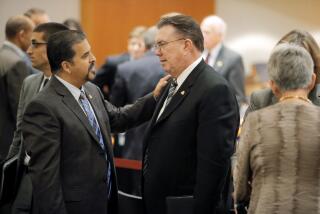
Muslim civil rights group demands apology after being forced to pray, break fast outside San Bruno City Hall
March 21, 2024

Opinion: How should we read the texts of Purim and Passover this year?
Start your day right
Sign up for Essential California for news, features and recommendations from the L.A. Times and beyond in your inbox six days a week.
You may occasionally receive promotional content from the Los Angeles Times.
The Associated Press is an independent, not-for-profit news cooperative headquartered in New York City.
More From the Los Angeles Times
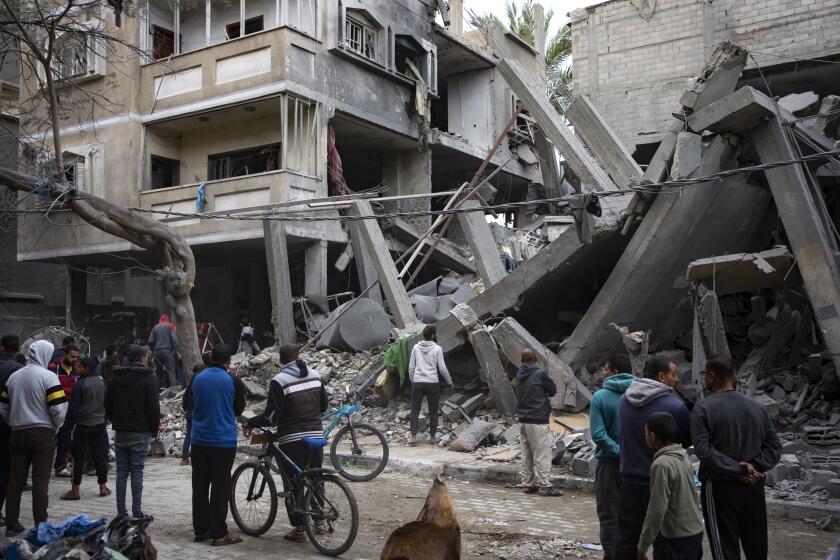
Palestinians describe bodies and ambulances crushed in Israel’s ongoing raid at Gaza’s main hospital

Abcarian: Who has the moral authority to speak about Israel’s excesses? Certainly not Donald Trump.
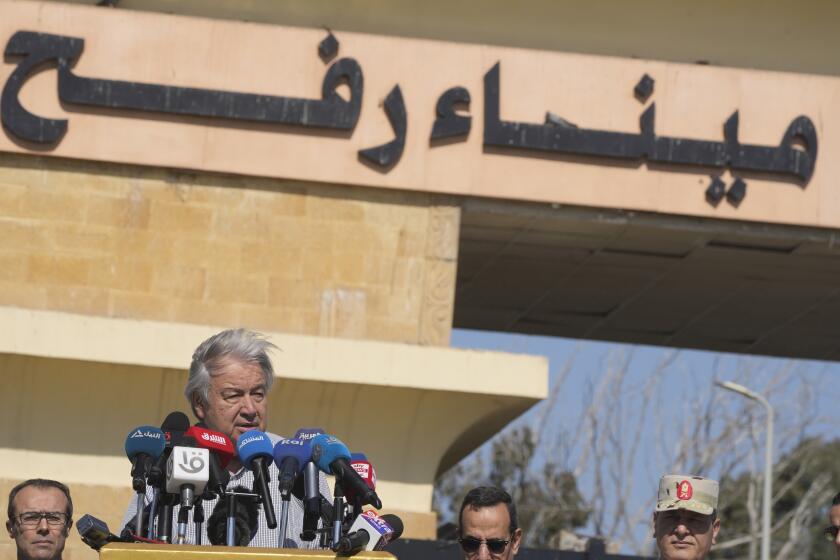
U.N. chief says it’s time to ‘truly flood’ Gaza with aid, calls starvation there an outrage
March 23, 2024

U.S. Gaza resolution is vetoed at U.N. as Blinken fails to achieve breakthrough in Israel
March 22, 2024
What is Ramadan? Why do Muslim people fast for the holy month? What you need to know.

Ramadan begins this week , a holy, month-long observance for Muslim communities in the United States and around the world .
Many Muslim people will observe Ramadan by fasting from sunup to sundown, praying together, holding communal meals and festivities and more.
Asma Sayeed, an associate professor of Islamic Studies at UCLA, explained that Ramadan is rooted in many practices, including to “invoke the remembrance of God for a continuous period" and “to celebrate and remember the revelation of the Qur'an as a gift to humanity.”
But when is Ramadan? Why do Muslims engage in fasting for Ramadan? Here’s what you need to know.
When is Ramadan?
Ramadan, the ninth month of the Islamic calendar, begins on Wednesday, March 22 in the United States and continues through April 21, ending in the holiday Eid al-Fitr.
What is Ramadan?
Ramadan is a significant month for many Muslim people that involves prayer, fasting, spending time with family and friends and more.
“The simplest answer is that it's the ninth month in the Islamic lunar calendar,” Martyn Oliver, faculty chair of the American University Core, told USA TODAY. “The more specific sense is that it's one of the holiest celebratory months in Islamic practice.”
Muslims believe that, during the month of Ramadan, the Prophet Muhammad was given the Qur'an, Islam’s holy book. It marked the first time that God revealed to Muhammed he was a prophet tasked with carrying God’s message.
Why do some Muslims fast?
One major practice of Ramadan is fasting from sunrise to sunset. Muslim people who have reached puberty are called on to fast, a practice of self-restraint intended to bring people closer to God.
“It is for Muslims to remember God, to strengthen their relationship with him through an act of piety and sacrifice,” Sayeed said. “Because it's tough. It's not easy to fast for a full month, and also to abstain from drink.”
Ramadan is also “for Muslims to engage in acts of charity by depriving themselves of food and drink,” Sayeed said.
“They remember what it is to face bodily and material deprivation,” she explained. “The idea is to sort of invite Muslims to be more charitable in that month and for the rest of the year because you’ve sort of experienced want yourself in very direct ways.”
Muslim people fasting during Ramadan do not eat food or drink liquids, but it can also “mean abstaining from sexual relationships or for smoking or for any other kind of pleasurable consumption,” Oliver said.
Muslim people break their fasts after an evening prayer with a meal called ifṭār. These meals are often communal events with friends and family. While foods at these meals can vary by community, one common choice is dates, a reference to the Prophet Muhammad eating dates to break his fast.
People who are pregnant, nursing or menstruating are often exempt from fasting, as well as older people, people with illnesses and others.
How else is Ramadan observed?
Some Muslim people will also do “an additional voluntary prayer” called Tarawih, Sayeed said.
“These are additional nightly prayers. Sometimes they're prayed in congregation, in a mosque, and one-thirtieth of the Qur'an is recited each night,” she said. “So the idea here is that by the end of Ramadan, that community or people who are praying will have read, recited the entire Qur'an in prayer. That’s a very high act of devotion. Many Muslims try to read through the Qur'an actually, during the month of Ramadan.”
The holiest night of Ramadan is Laylat al-Qadr, which takes place in the final 10 days of the month. It is referred to as the “Night of Power,” when the Angel Jibril revealed the Qur'an’s initial verses to the Prophet Muhammad.
Ramadan is also a time to give to charities, Oliver said.
“It's also the time when you do a lot of charitable giving. It's the season of giving to worthy causes or to organizations that support those who are without,” he said.
Should I say ‘Happy Ramadan?’
If you are not observing Ramadan but want to greet a coworker or friend who is, Sayeed said that you may want to say “Ramadan Mubarak” or “Ramadan Kareem”
“The first is just like sort of, congratulations for Ramadan. Ramadan Kareem is actually a really beautiful one. Kareem is a word connoting generosity and giving. The idea that even though you're experiencing a very high level of material deprivation, that Ramadan itself and these charitable acts during Ramadan that are heightened for Muslims evoke generosity and bounty,” she said.
Oliver said you may also want to “wish somebody an easy fast, which is a sort of a recognition that somebody who is participating in Ramadan is going to be hungry and tired during the day.”
What is Eid al-Fitr?
Eid al-Fitr commemorates the end of Ramadan. It means “the feast of the breaking of the fast.”
Sayeed called it a “major annual holiday for Muslims,” when they “are advised to kind of wear their nicest clothes, go out in the morning for congregational prayer.”
Children may receive presents after prayers, and communities may come together for celebratory meals and fireworks.
“There's a sense of relief at having completed the fasting or maybe a sense of accomplishment, and also gratefulness for what one has,” Oliver said.
Contributing: Clare Mulroy, Maria Jimenez Moya; USA TODAY

IMAGES
VIDEO
COMMENTS
Tips for Enjoying Travel to Morocco During Ramadan. If your trip to Morocco does coincide with Ramadan, there are a few things you can do or keep in mind to help make your experience the best possible. Be open-minded and flexible when planning your days or itineraries. Check ahead of time to see if there are any closures or special hours due to ...
A lot of restaurants and food stalls are closed during Ramadan…. The best and easiest way is to eat and drink in the privacy of your hotel room in the daytime. The same goes for smoking. Foreigners shouldn't have any problem if they smoke within the compound of their accommodation in Morocco.
During Ramadan in Morocco the clocks change (as if for daylight saving). If you will be arriving before Ramadan, at the very beginning of the month or at the very end you should be aware that clocks change. The time will go backwards one hour at the beginning and forwards one hour at the end.
In conclusion, visiting Morocco during Ramadan is a journey into the heart of cultural richness and spiritual depth. By embracing local traditions, participating in communal rituals, and navigating with cultural sensitivity, you can unlock an immersive and transformative travel experience.
During Ramadan Morocco changes their clocks so if you will be arriving at the very beginning of the month or at the very end you should be aware that the time will go backwards one hour at the beginning and forwards one hour at the end. From the hours of 7pm - 9pm you should not expect to do much.
Travel during Ramadan in Morocco can become a special holiday. Ramadan dates in Morocco in 2024: March 12 - April 10. What is Ramadan? Ramadan is the 9th month in the Islamic lunar calendar, during which the Qur'an was revealed to the Prophet Muhammad. For Muslims, it is a month of fasting - eating, drinking, making love, and smoking is ...
Visit Morocco during Ramadan for a unique chance to fully experience the religious and cultural traditions of the country. There is a lot of life in the air during Ramadan. ... Travel and Commute. Visitors to Morocco during Ramadan should be aware that some businesses and services may be closed or offer fewer services during the day.
2024: March 11 through April 9. 2025: March 1 - 29. 2026: February 18 - March 19. 2027: February 8 - March 8. If you're thinking about visiting Morocco during Ramadan in future years, you'll want to understand how the holy month is likely to impact your travel experience. Read on!
It is against the law in Morocco to serve alcohol to Moroccans during Ramadan. While Ramadan may seem like a perplexing holiday to non-Muslims, non-believers may be surprised to learn how much Muslims look forward to the fast. Many feel it is a time of spiritual healing and cleansing. Post Ramadan, many Muslims participate in Shawwal, a six day ...
If you are contemplating a visit to Morocco during Ramadan in the years ahead, understanding how this holy month is likely to influence your travel experience is essential. After Ramadan Eid al-Fitr After a month of fasting, Moroccans and Muslims worldwide celebrate the conclusion of Ramadan with Eid al-Fitr.
Whether or not to travel to Morocco during Ramadan is a personal decision, as it depends on the kind of experience you are looking for. There's no question about it—Morocco changes during Ramadan. Life slows down on the outside and reflection picks up on the inside. Many tourist sites open late and close early.
Cons of Visiting Morocco During Ramadan. Weird hours of operation for restaurants and shops. Closure of all nightclubs, bars, and liquor stores. Tramdina - the idea that fasting people can be rude, short tempered, or violent (I personally didn't experience this at all, but something to be mindful of during Ramadan) Overall, you'll need to ...
Ramadan is an Islamic period of fasting. From sunrise to sunset, everyday for a month, Muslims will not eat, drink, smoke, and participate in sexual intimacy. It is considered the holiest month in Muslim culture, and there is an extra emphasis on religion during this time. 2022 Ramadan begins on the 2nd of April, and finishes on the 1st of May ...
This year, Ramadan falls largely through the month of March and will end in the middle of April. This is usually a high season for travelers visiting Morocco. While some people balk at visiting during Ramadan, anticipating problems or inconveniences, there's no reason to put aside your plans. In fact, for the culturally curious, Ramadan might ...
Ramadan in Morocco. The month of Ramadan in Morocco is the month of fasting for Muslims. During these days, they can not eat, drink or have carnal relations, from sunrise to sunset. Each year, the dates on which Ramadan is celebrated vary, varying by 11 days per year. The Muslims use a lunar calendar that is not rectified and so the result is ...
Last Updated: 2021-04-28. When Ramadan is approaching, people usually ask me if I recommend traveling to Morocco during Ramadan, which is a reasonable question, since it's completely different from any time, with certain advantages and disadvantages.. But before answering the question, I think it's better to first explain a little about Ramadan (it will be enjoyable, don't worry).
Discover essential tips for traveling in Morocco during Ramadan. Understand local customs, respect fasting practices, and plan your itinerary accordingly. Immerse yourself in the rich traditions and flavors of Ramadan. Make the most of your journey with these insightful insights.
During this time, Muslims all over the world join in a period of fasting as an act of intensive worship to Allah. Ramadan is one of the 5 Pillars of Islam. The other 4 pillars include giving to the poor, saying the Shahadah, making the pilgrimage to Mecca, and daily prayers. Harira - A Traditional Soup Served During Ramadan.
During the iftar (aka the meal at the breaking of the fast aka breakfast), harira soup, eggs, bread, mint tea and water is served. Our Moroccan tour leader Hamid. Yes, no food, nothing to drink and stifling heat does make people pretty tired - and cranky too - which is why you see so many people sitting around in the shade during Ramadan ...
Travel during Ramadan can be challenging due to limited dining options during the day, but there are also unique experiences to be had. Attending iftar meals and witnessing the nightly Tarawih prayer are just some of the experiences that tourists can have during Ramadan in Morocco.
Ramadan is the 9th holy month of the Islamic lunar calendar. It is a month of fasting, worship and spending time with family and friends. It is a month where Islamics can get closer to Allah. Ramadan occurs from the year A.D. 610. When the Angel Gabriel presented the Islamic holy book, the Quran, to prophet Mohammed for the first time.
Embark on a transformative journey: Travel to Morocco in Ramadan with our guide for non-Muslims. Discover cultural insights and essential tips for an enriching experience. ... Traveling to Morocco during Ramadan is an experience like no other. Throughout the month, the country undergoes a remarkable transformation: work hours shorten, public ...
During Ramadan, a holy holiday, all Muslims fast from sunrise to sunset for one month, only eating after sundown. Non-Muslims in Morocco are not expected to observe Ramadan, but should be sensitive about not breaking the fast in public. In its observance, Ramadan parallels the traditional Christian Lent. The ninth month of the Islamic calendar ...
During the sacred month of Ramadan, Islamic countries around the globe undergo a transformative shift, offering a rich and vibrant experience for those curious enough to embark on a journey during ...
To live this experience to the fullest, finding the right accommodation is key. Barceló hotels in Morocco stand out for their excellent location, first-class service, and above all, for the special offers during Ramadan. At Barceló, we make sure you always get the lowest online rate. If you find a ...
Muslims around the world are observing the holy month of Ramadan, with worship, charity, dawn-to-dusk fasting and nightly feasts. The faithful gather for prayers inside mosques in Muslim-majority ...
Many Muslims try to read through the Qur'an actually, during the month of Ramadan." The holiest night of Ramadan is Laylat al-Qadr, which takes place in the final 10 days of the month.
Doha, Qatar: Motorists speeding before Iftar is one of the main causes of accidents during Ramadan. This was stated by the Ministry of Interior as it shared a video of a family speeding through ...